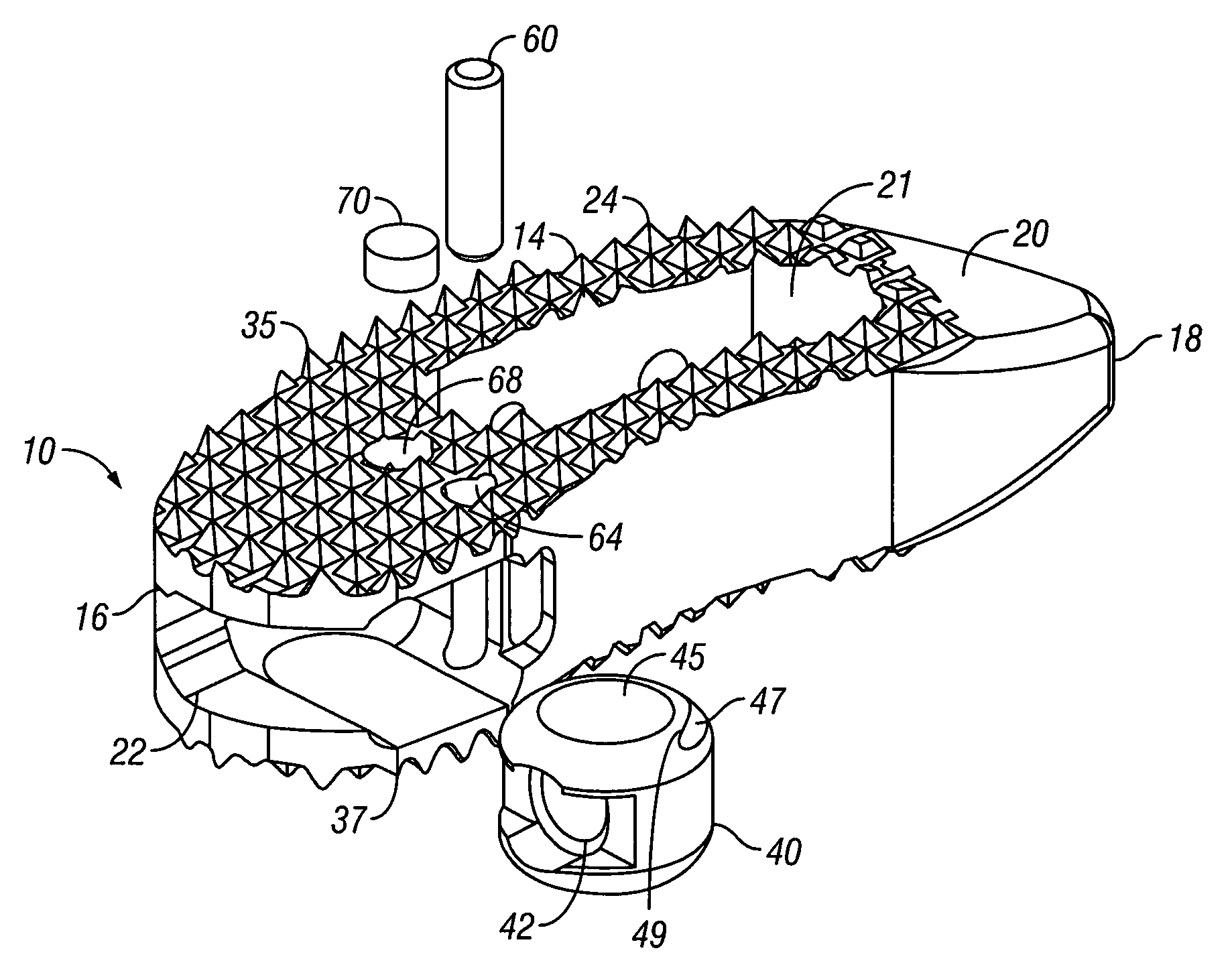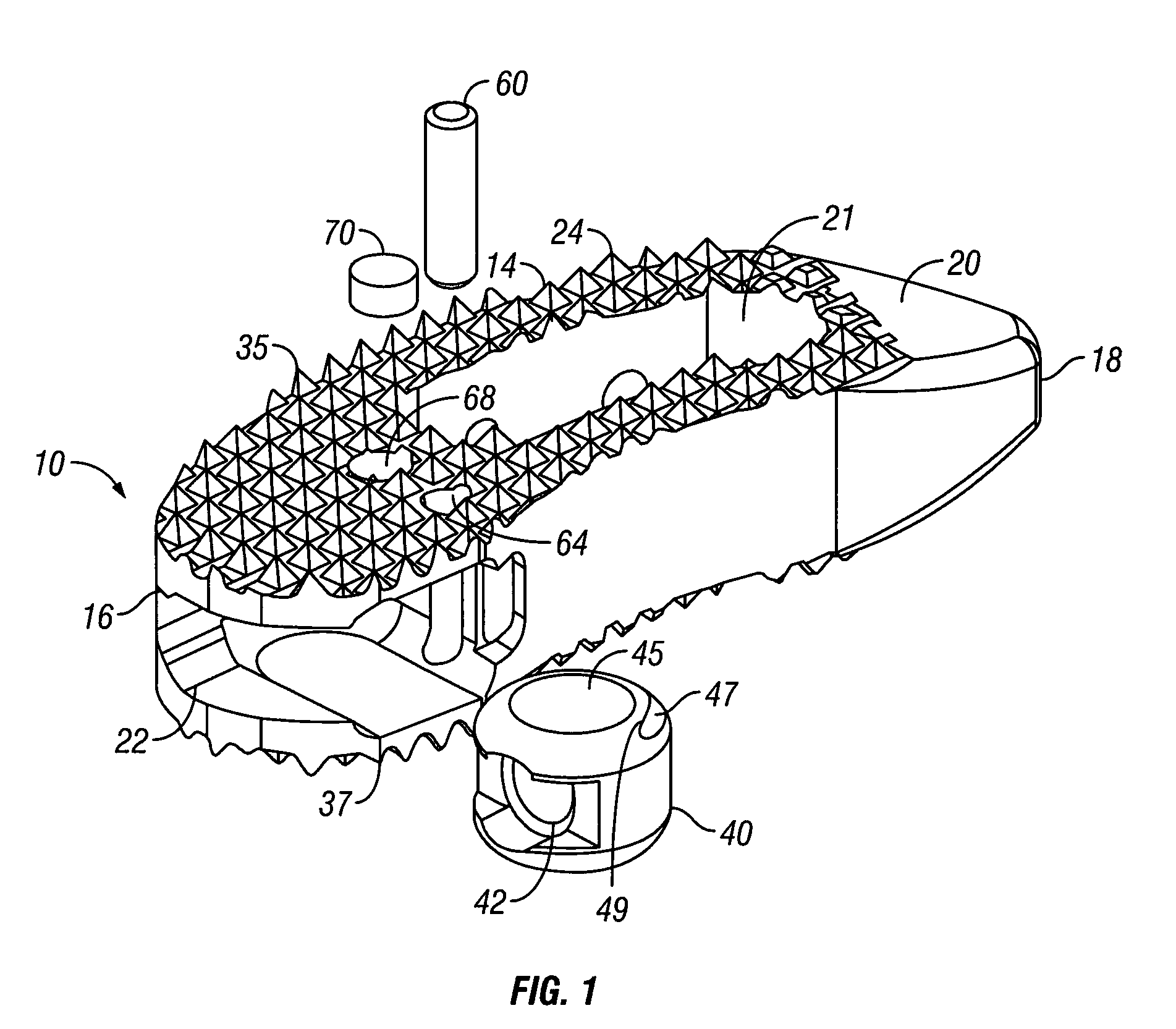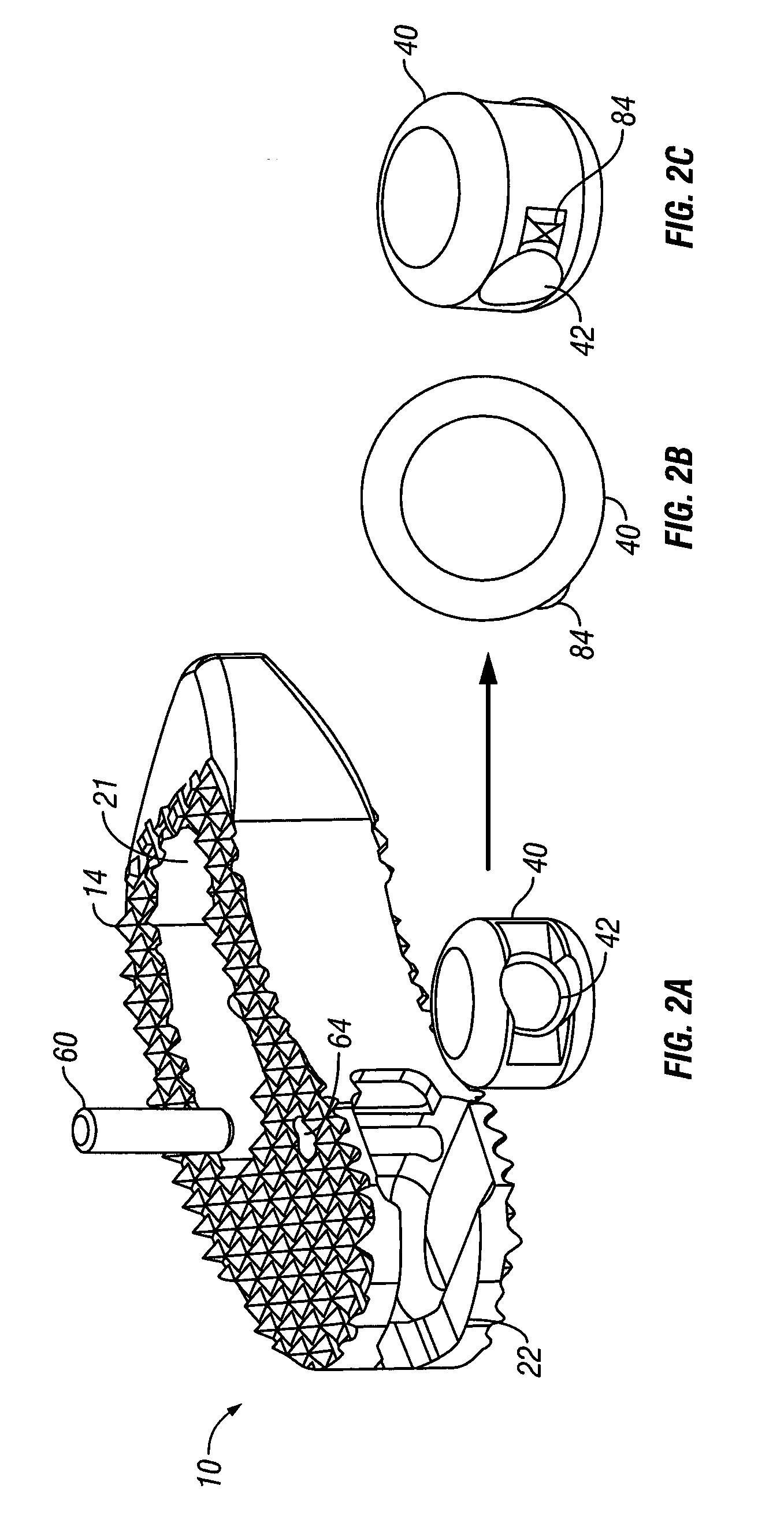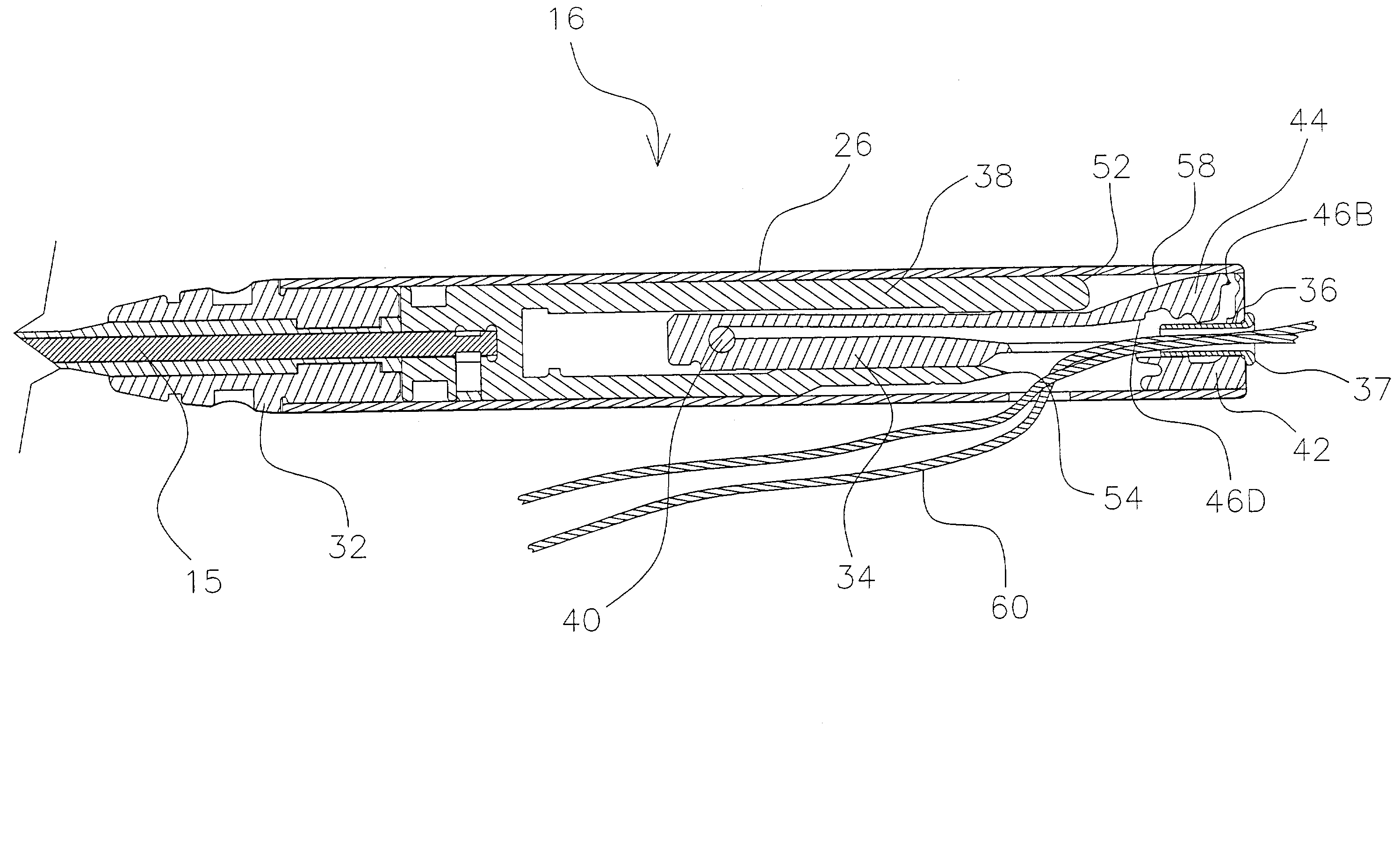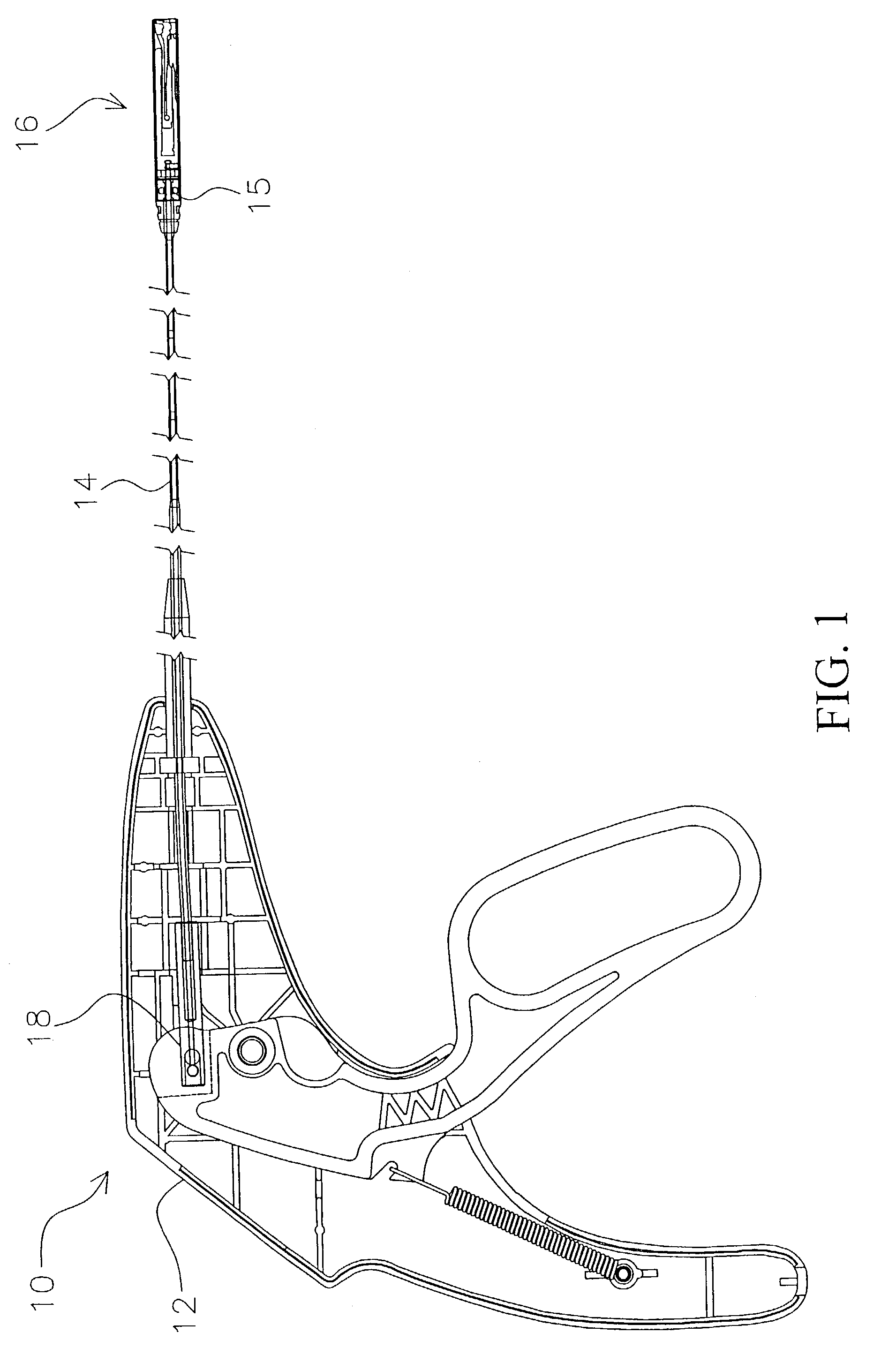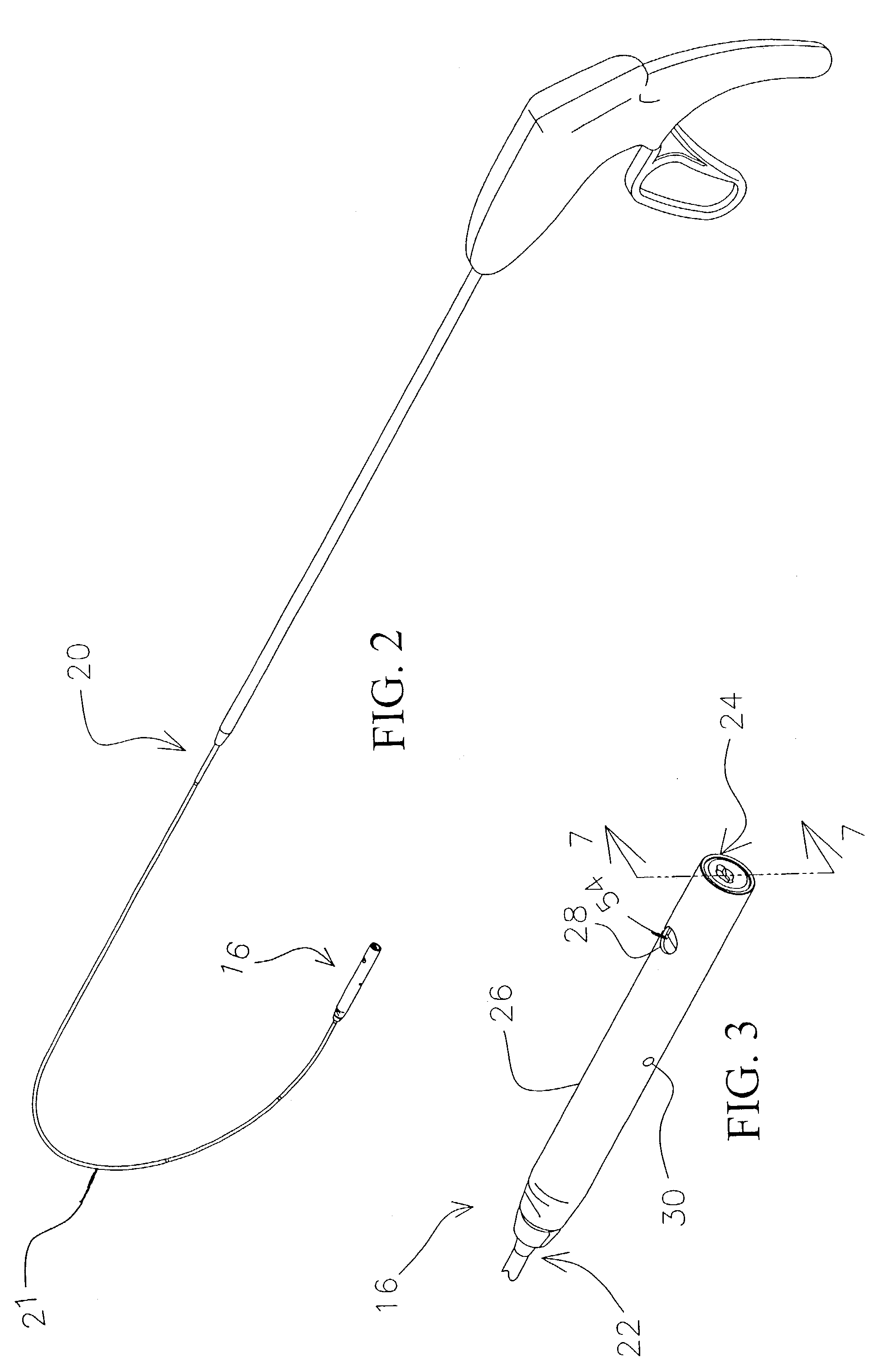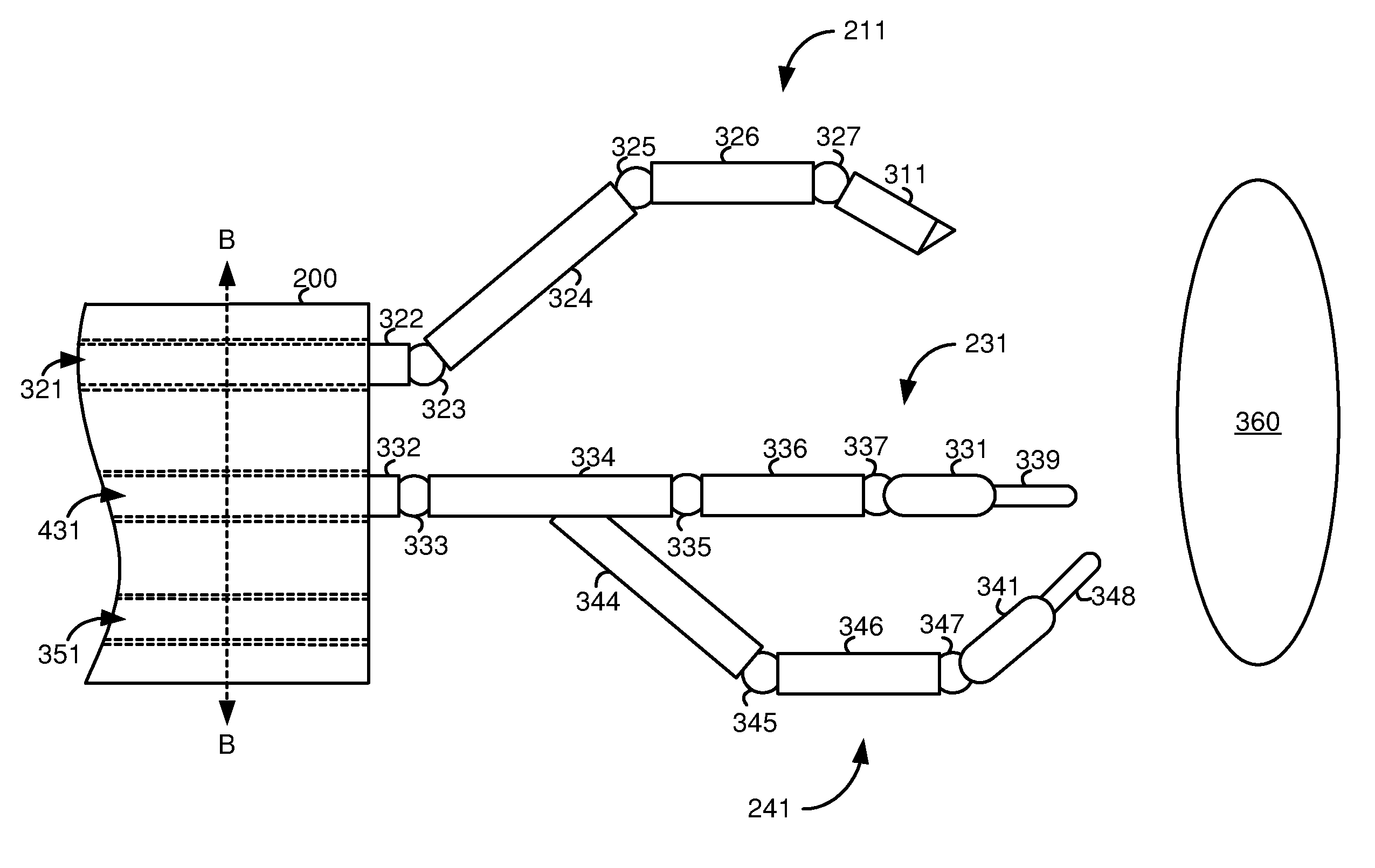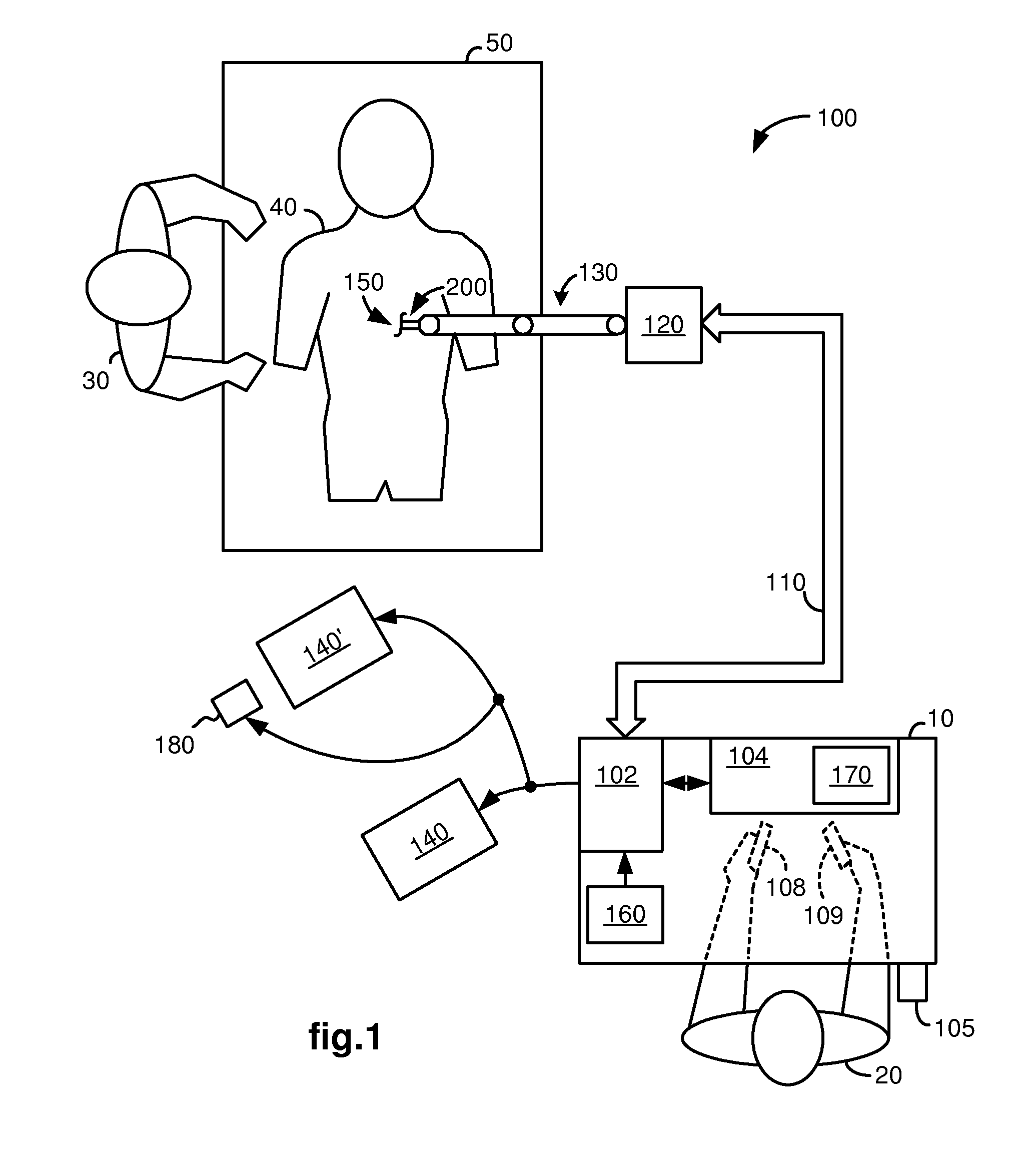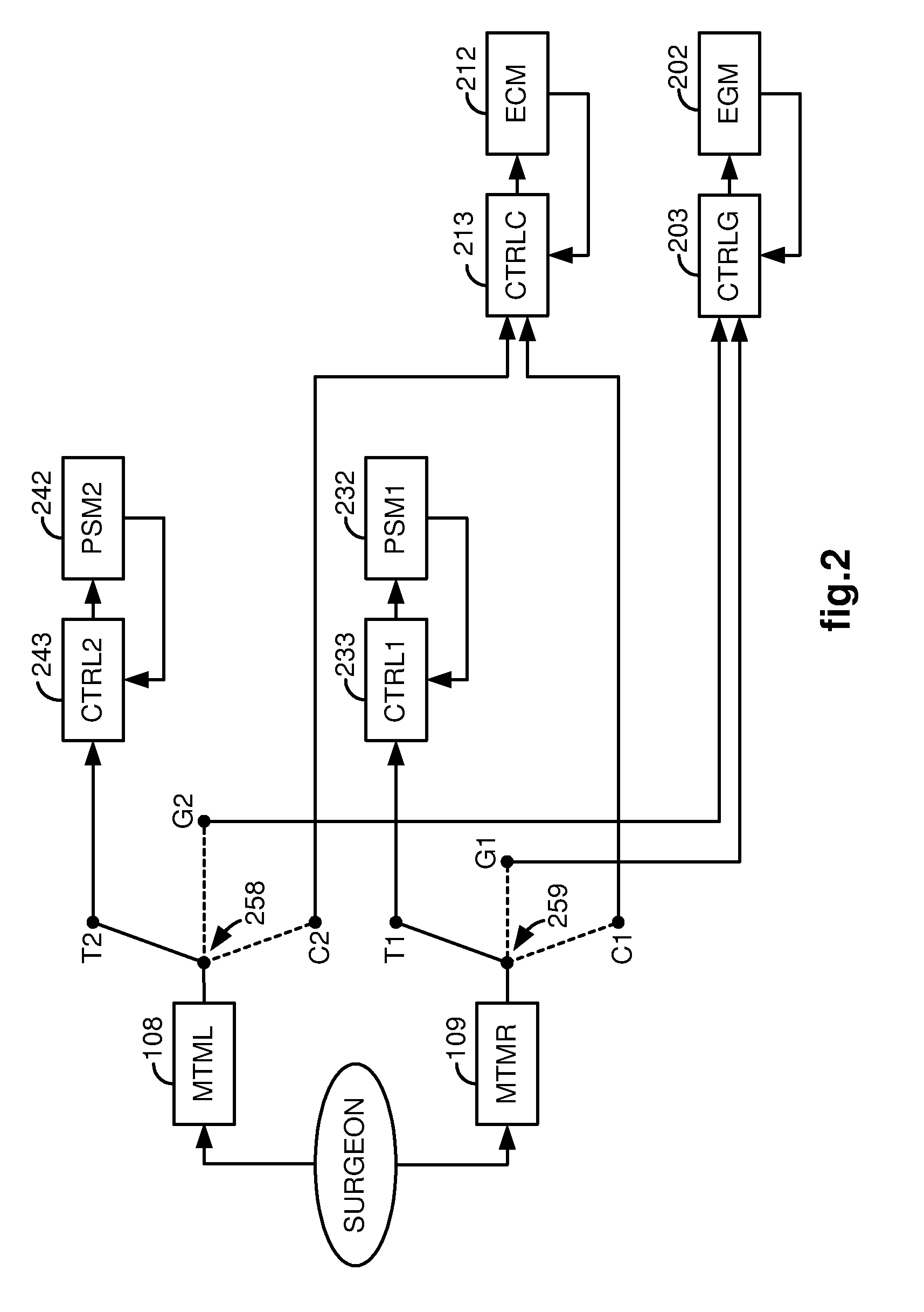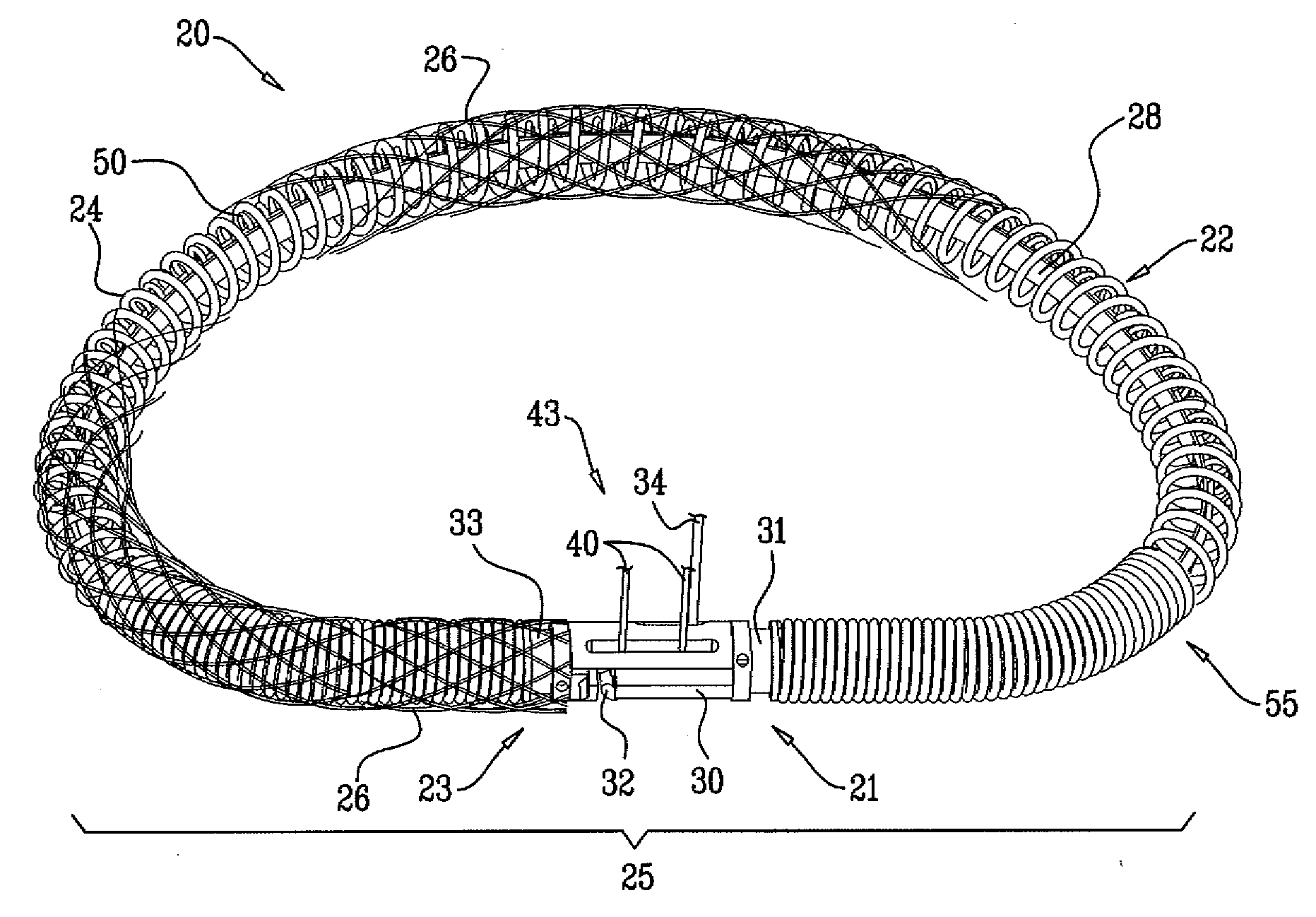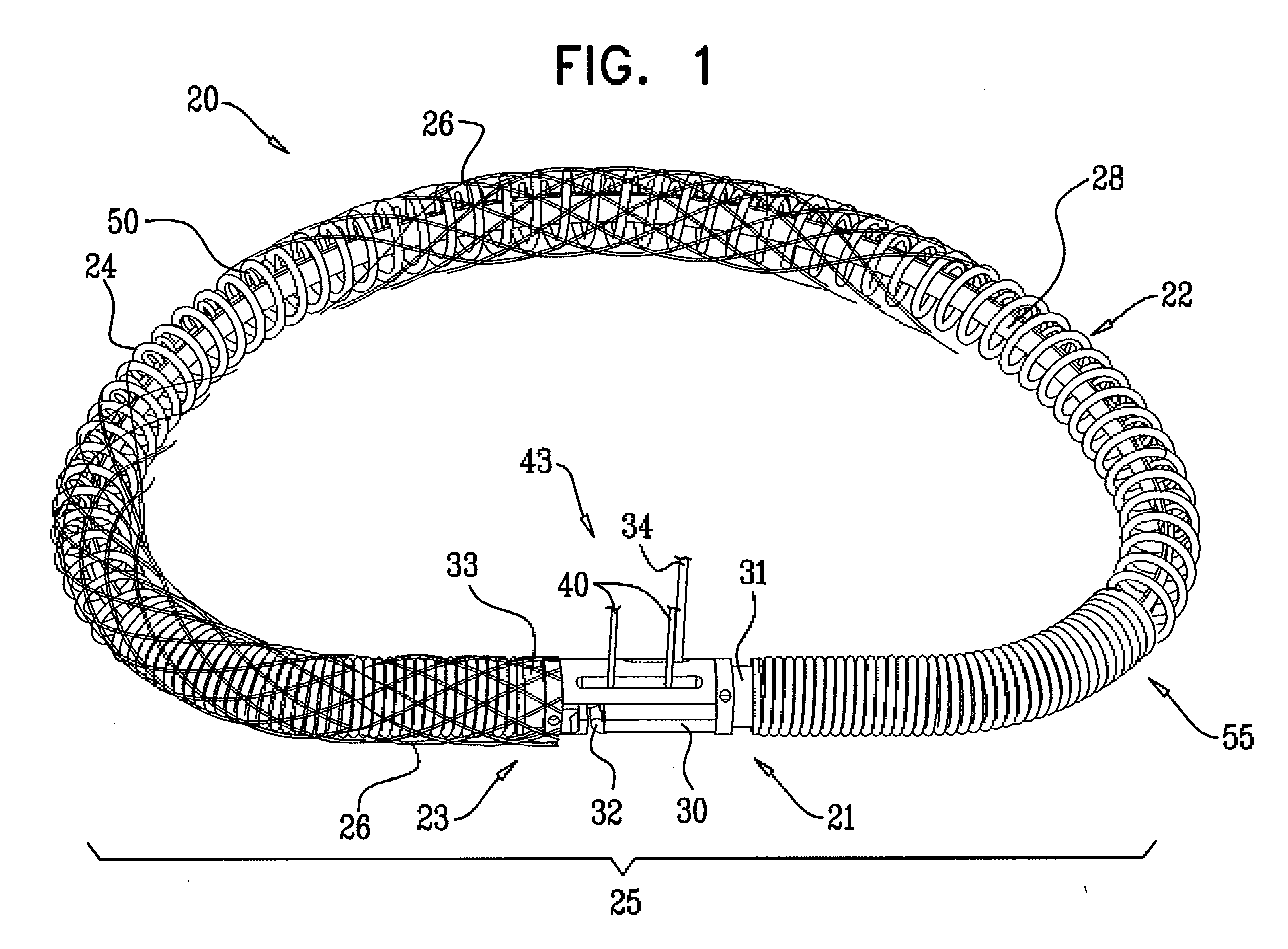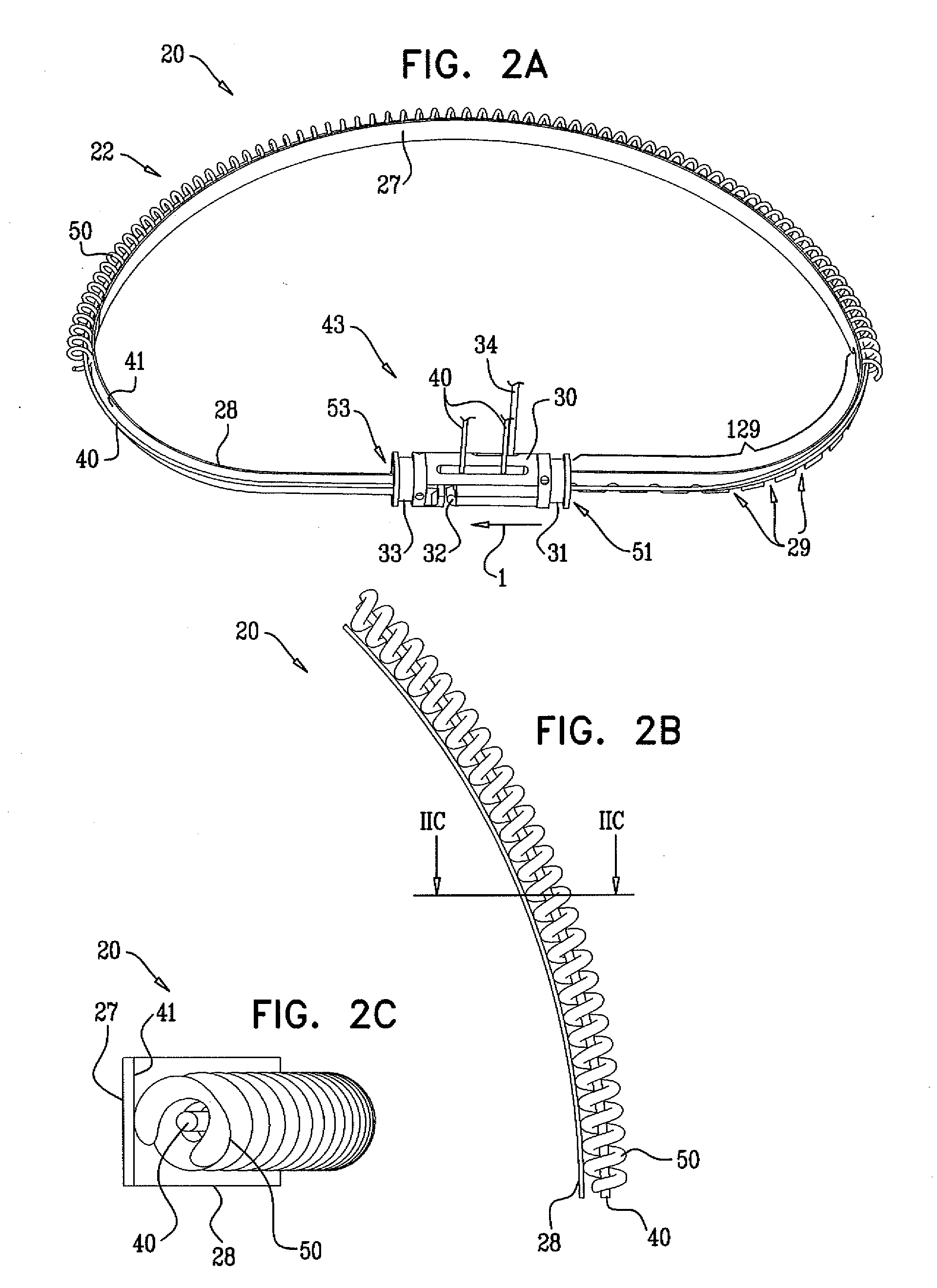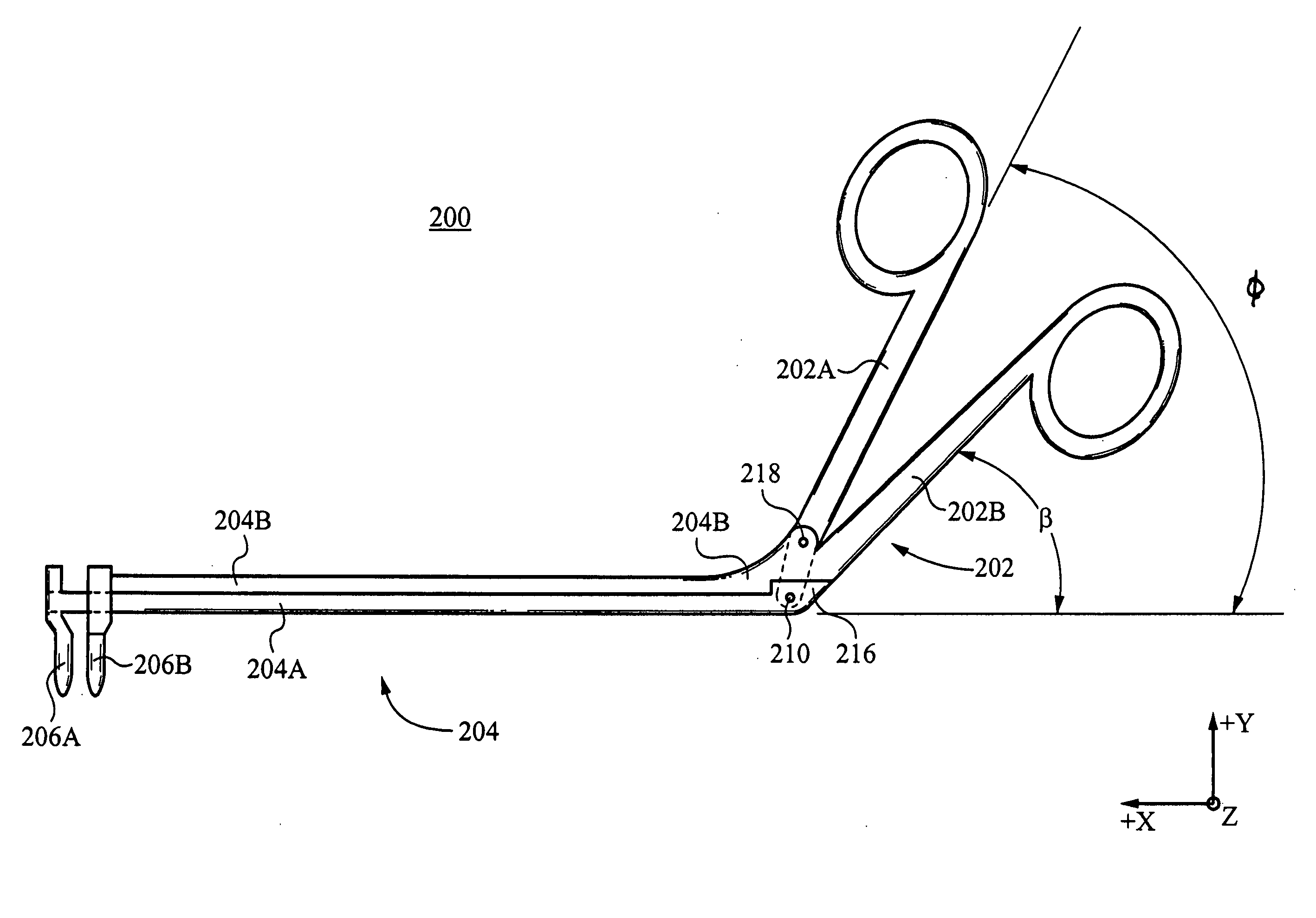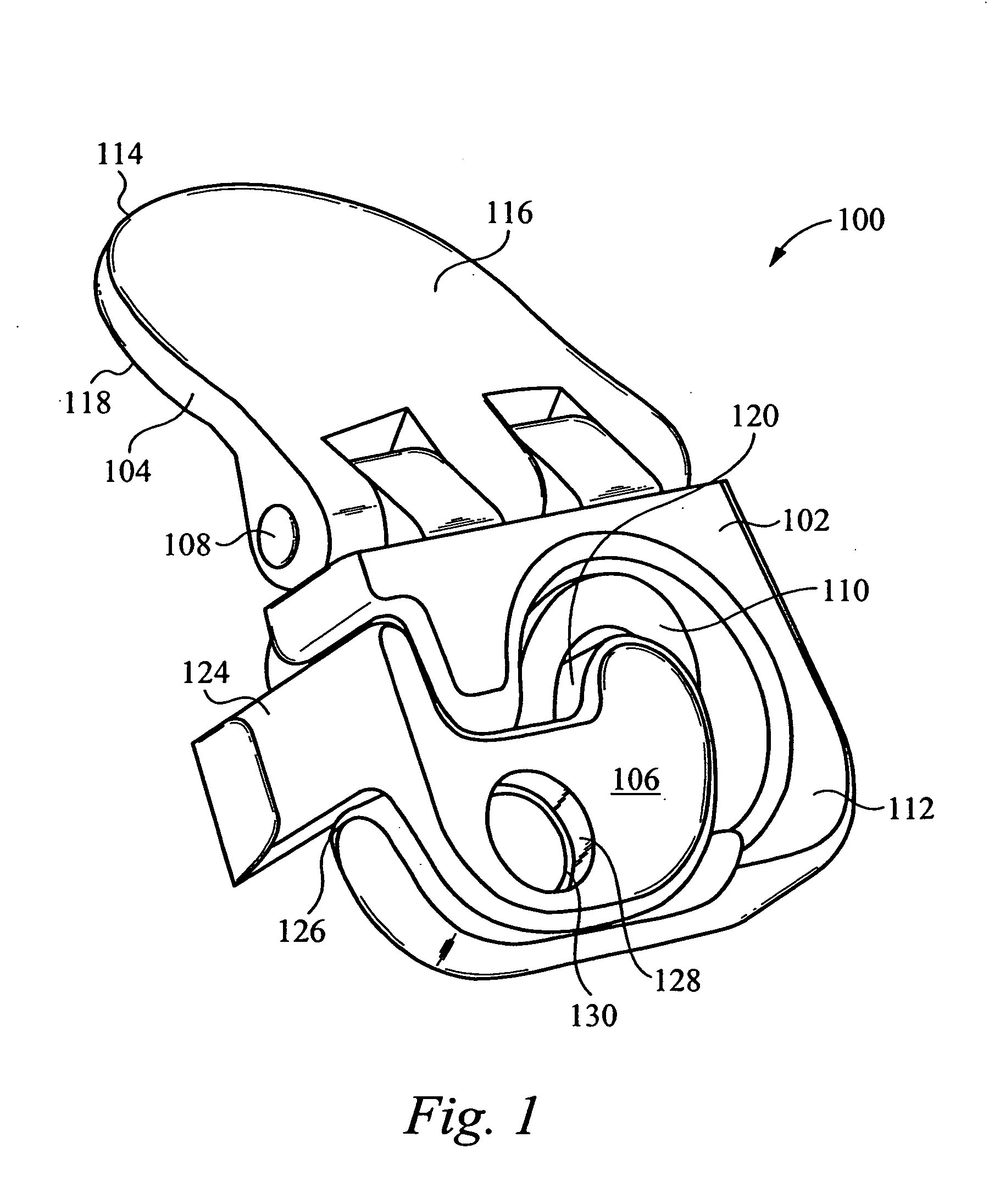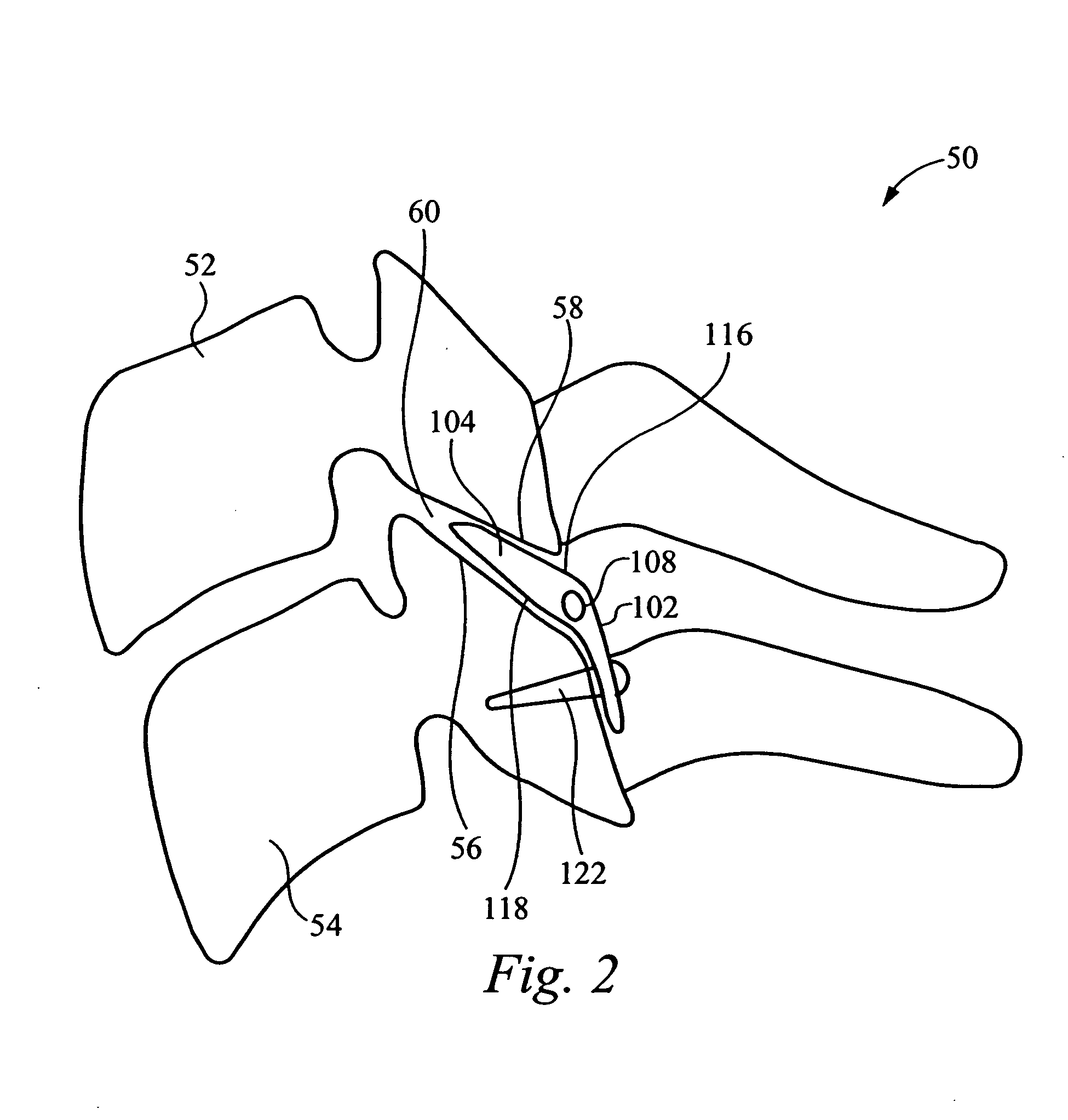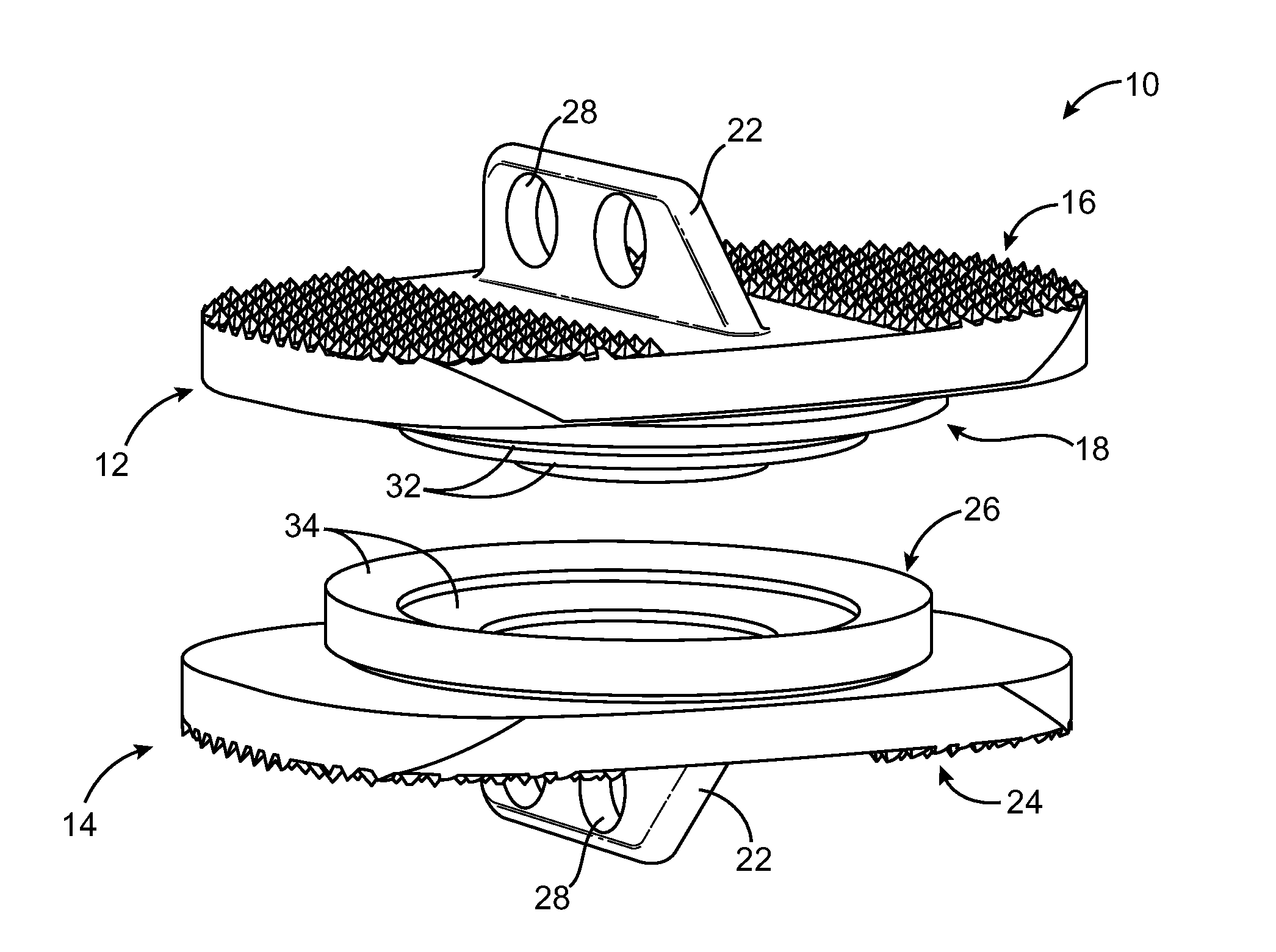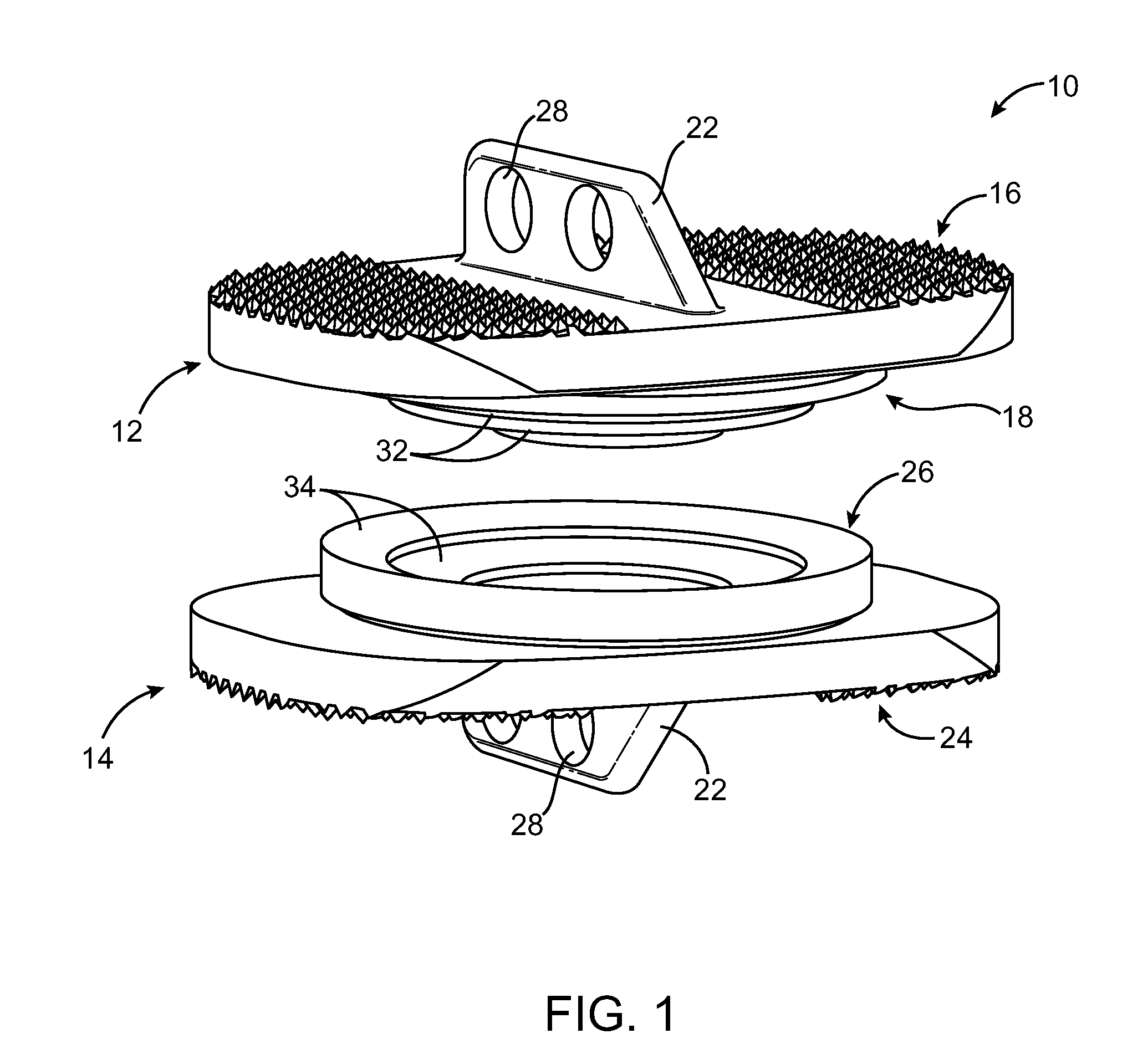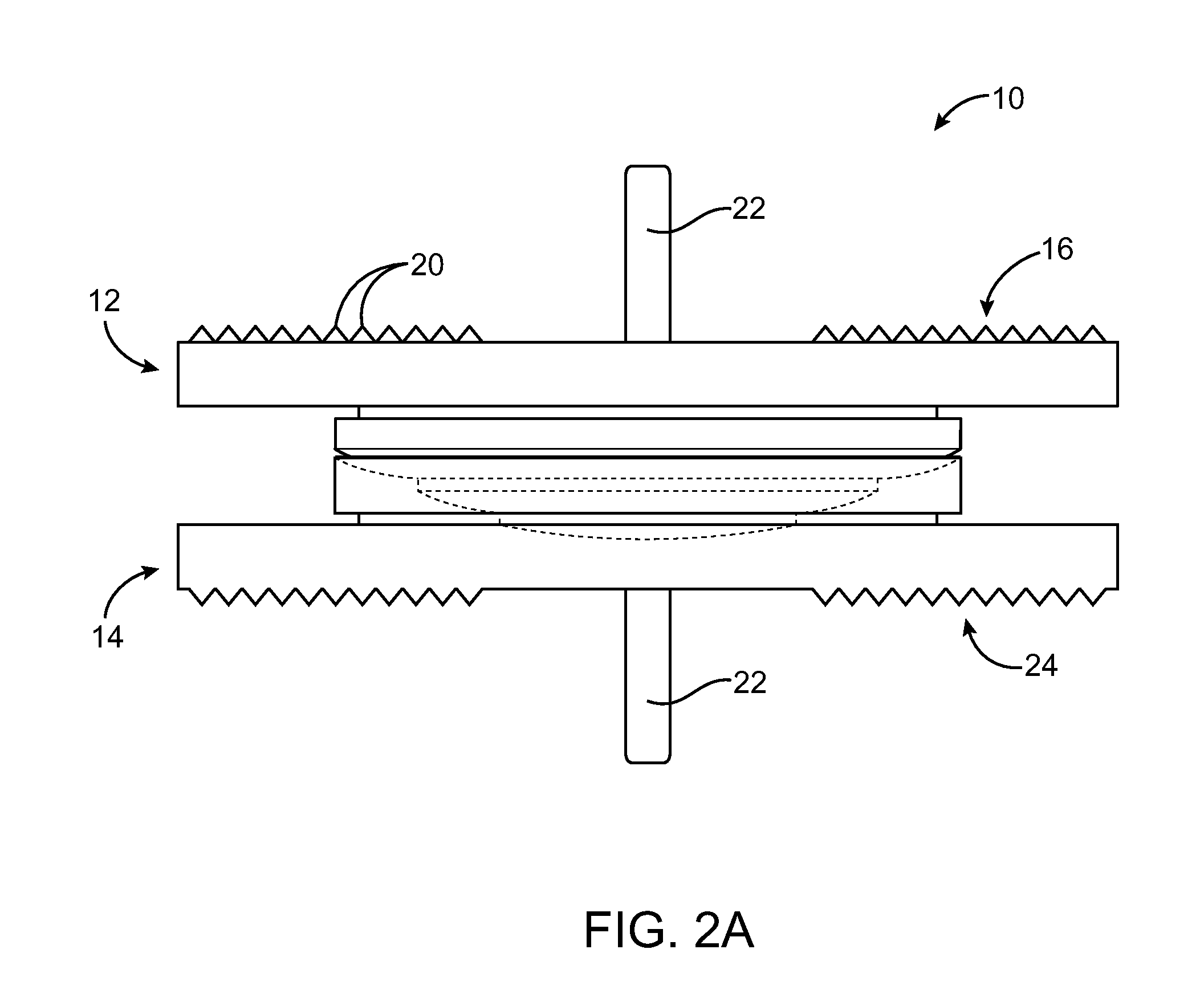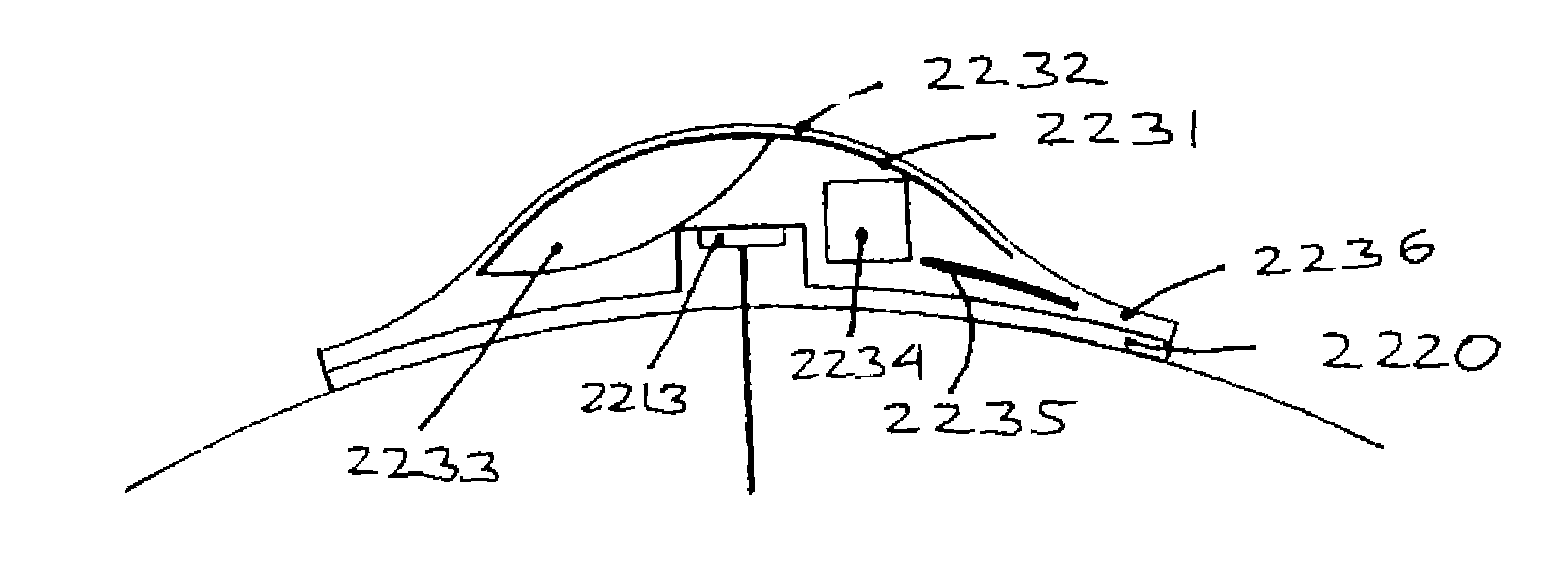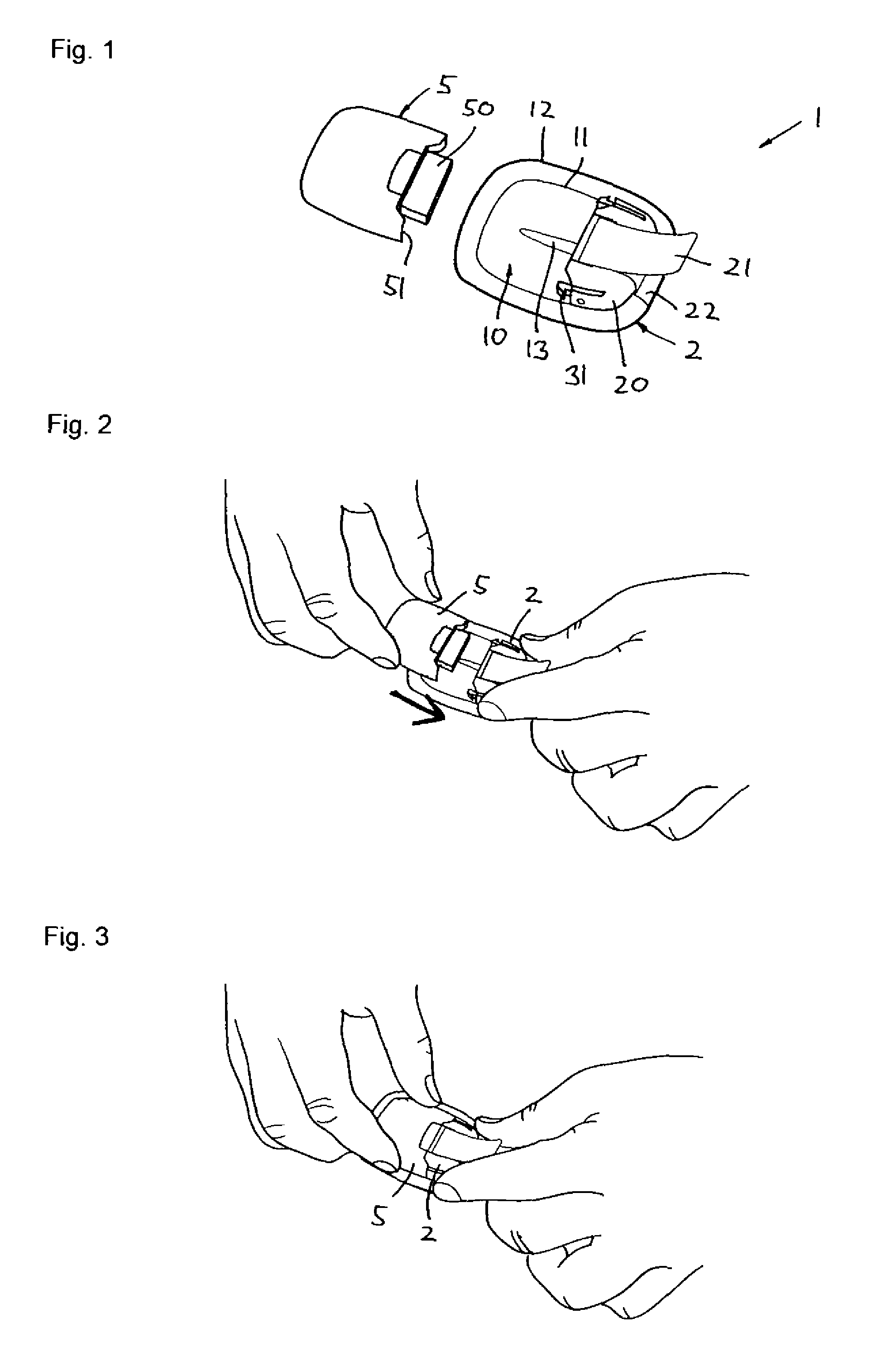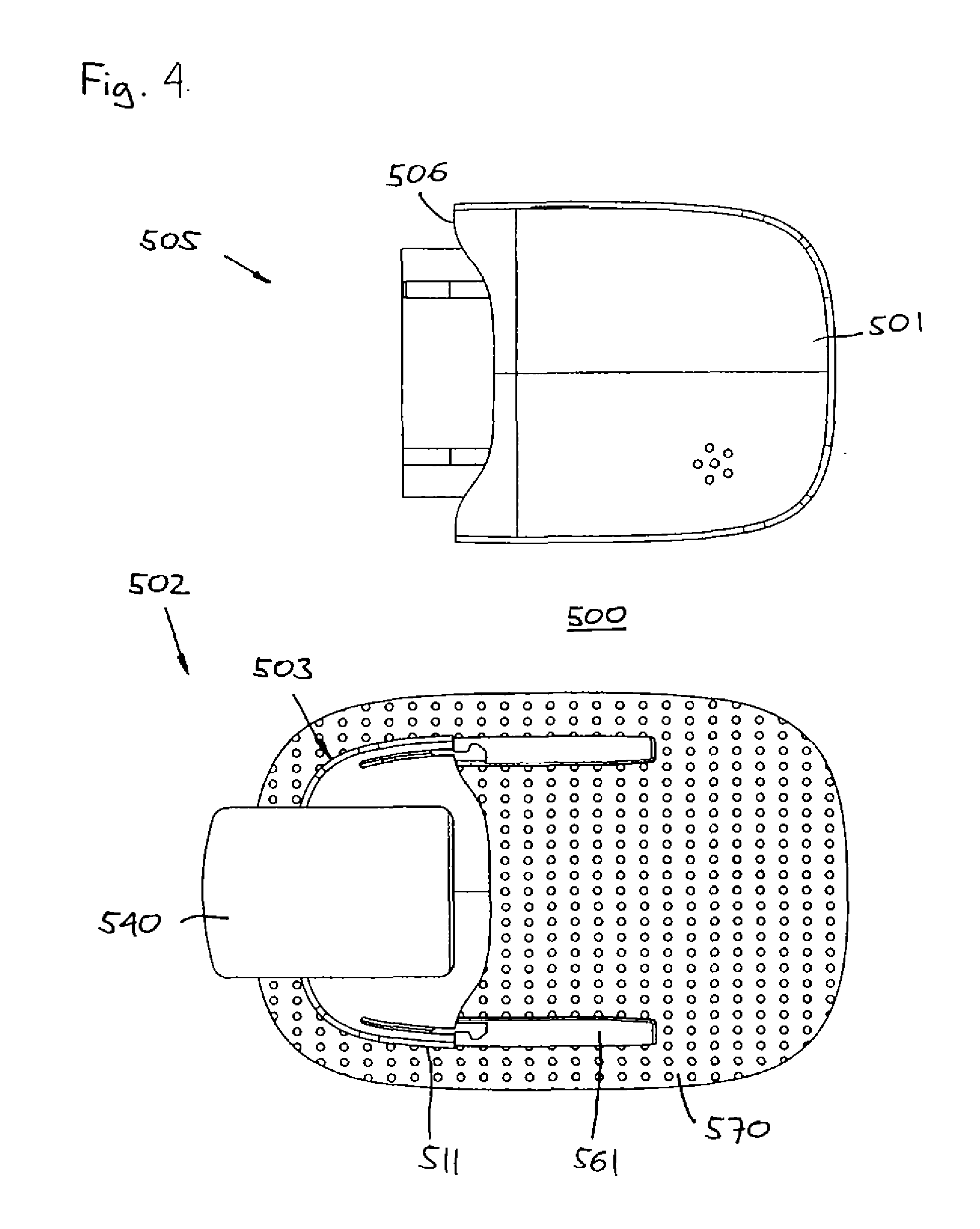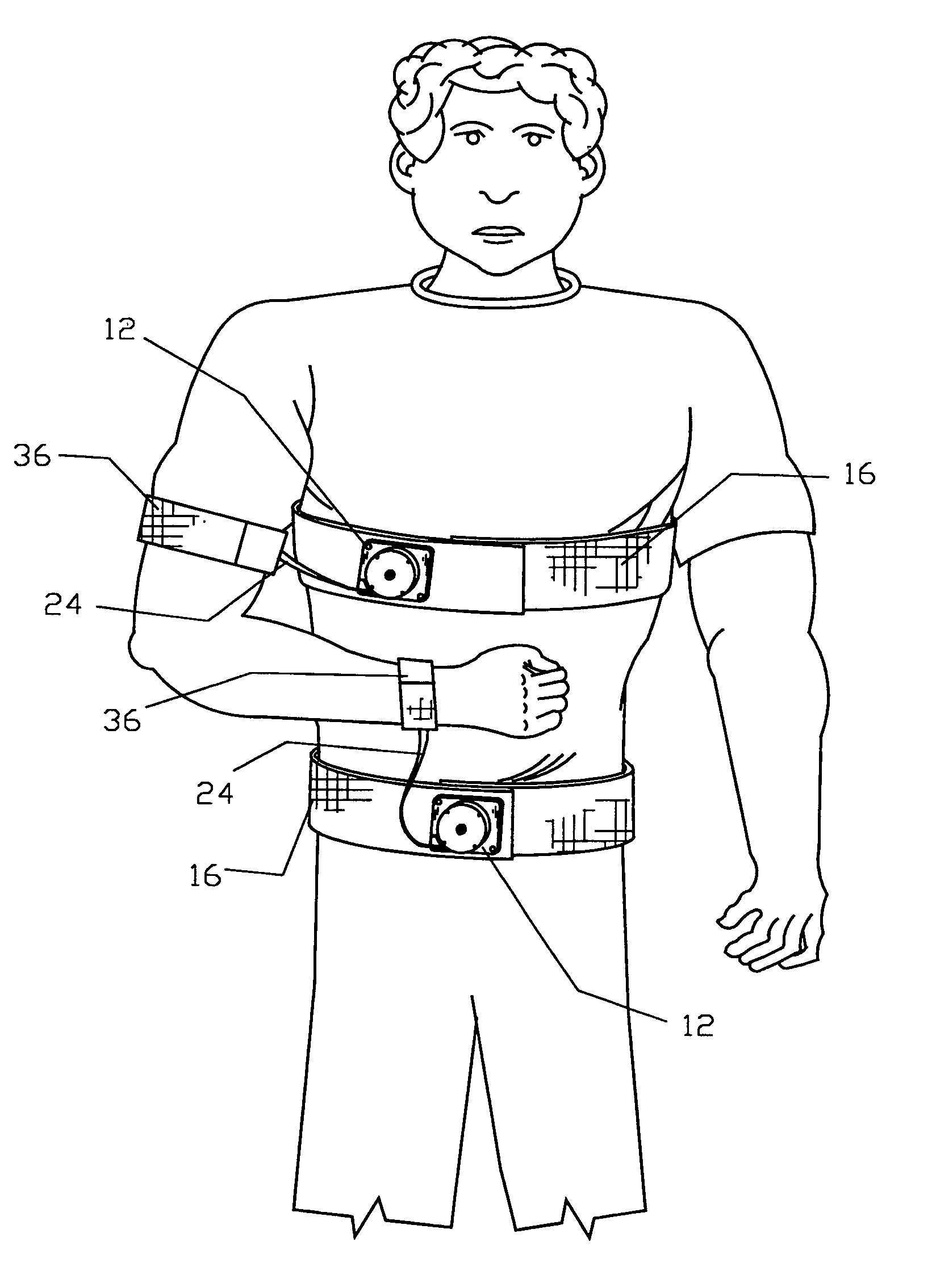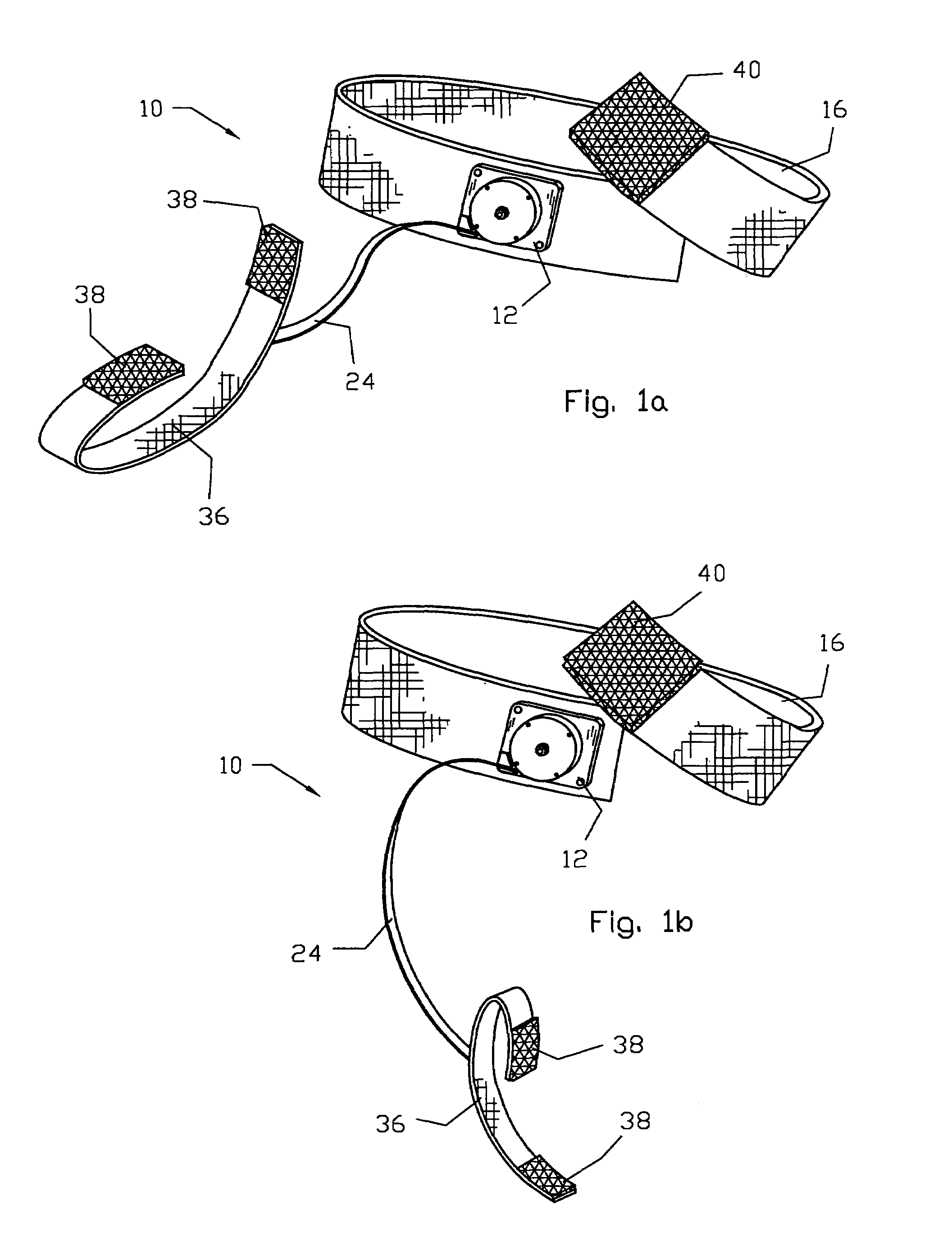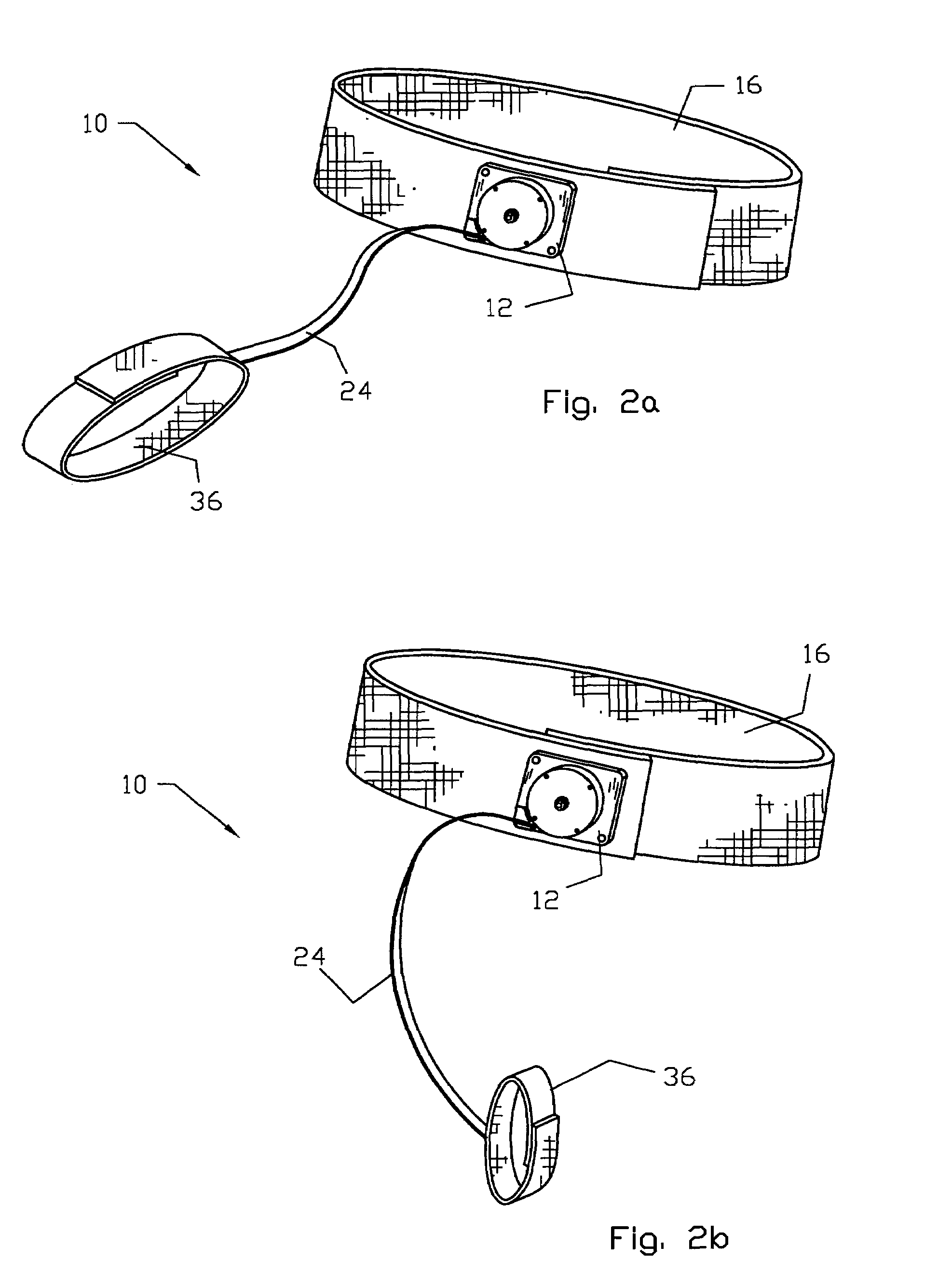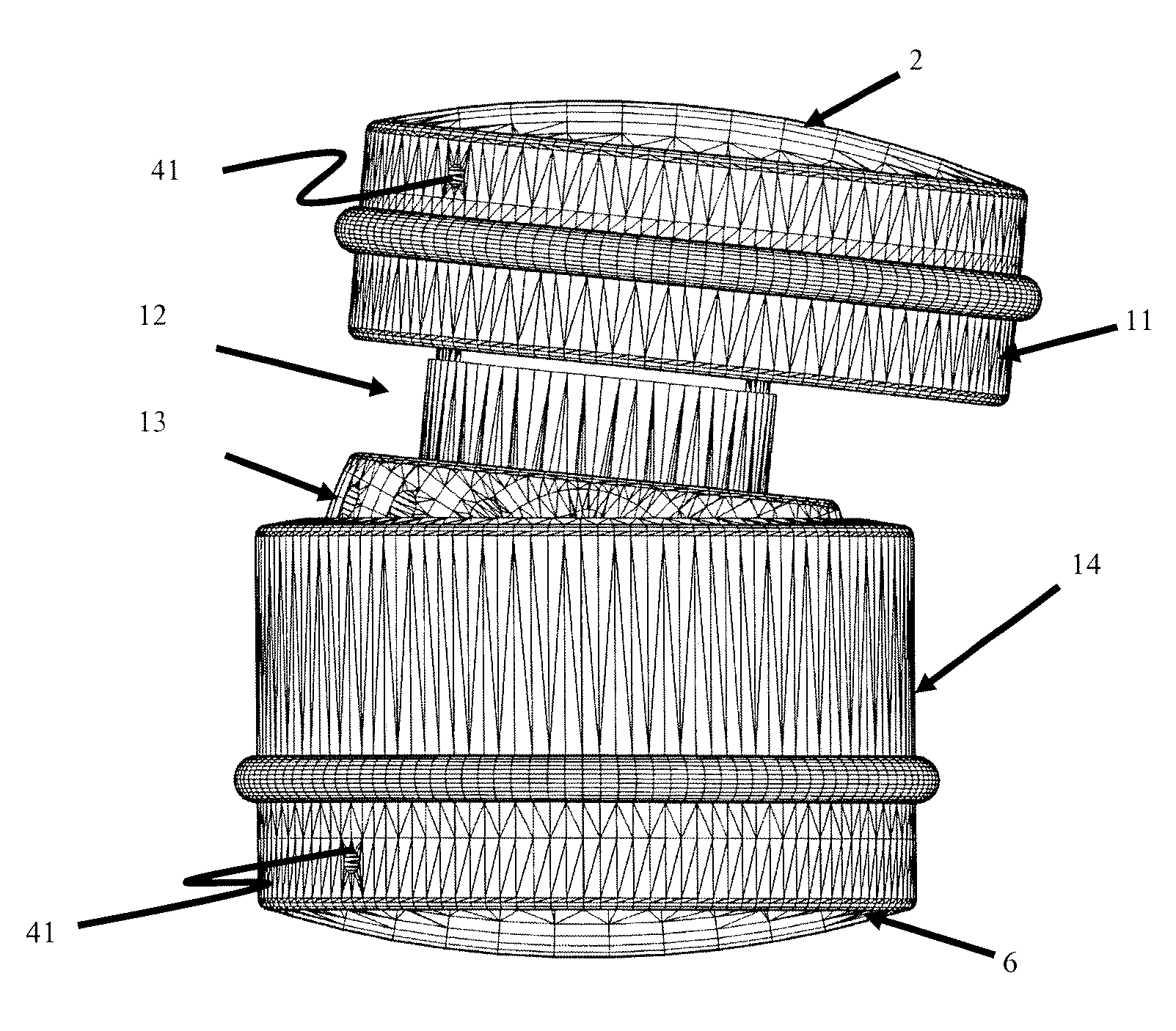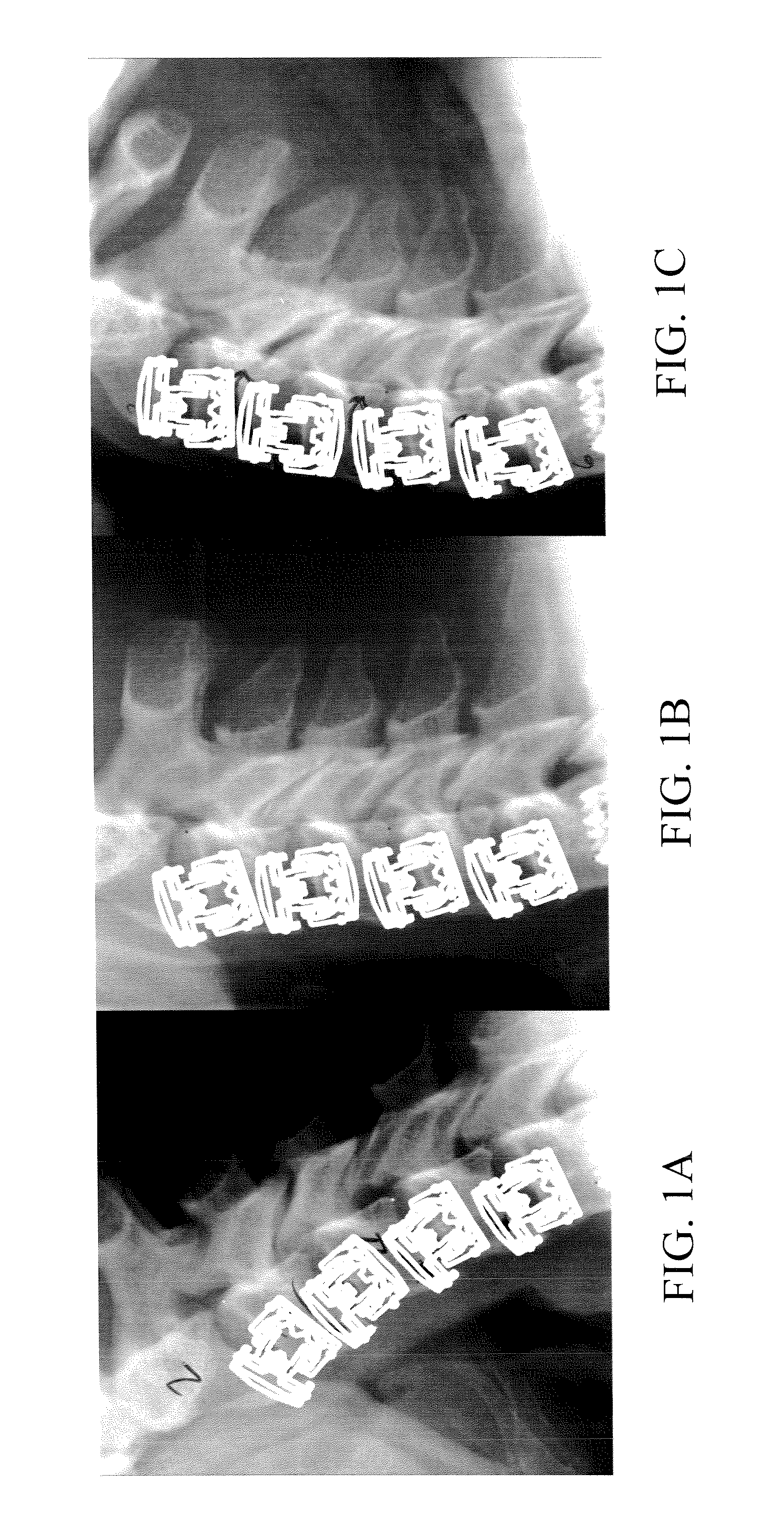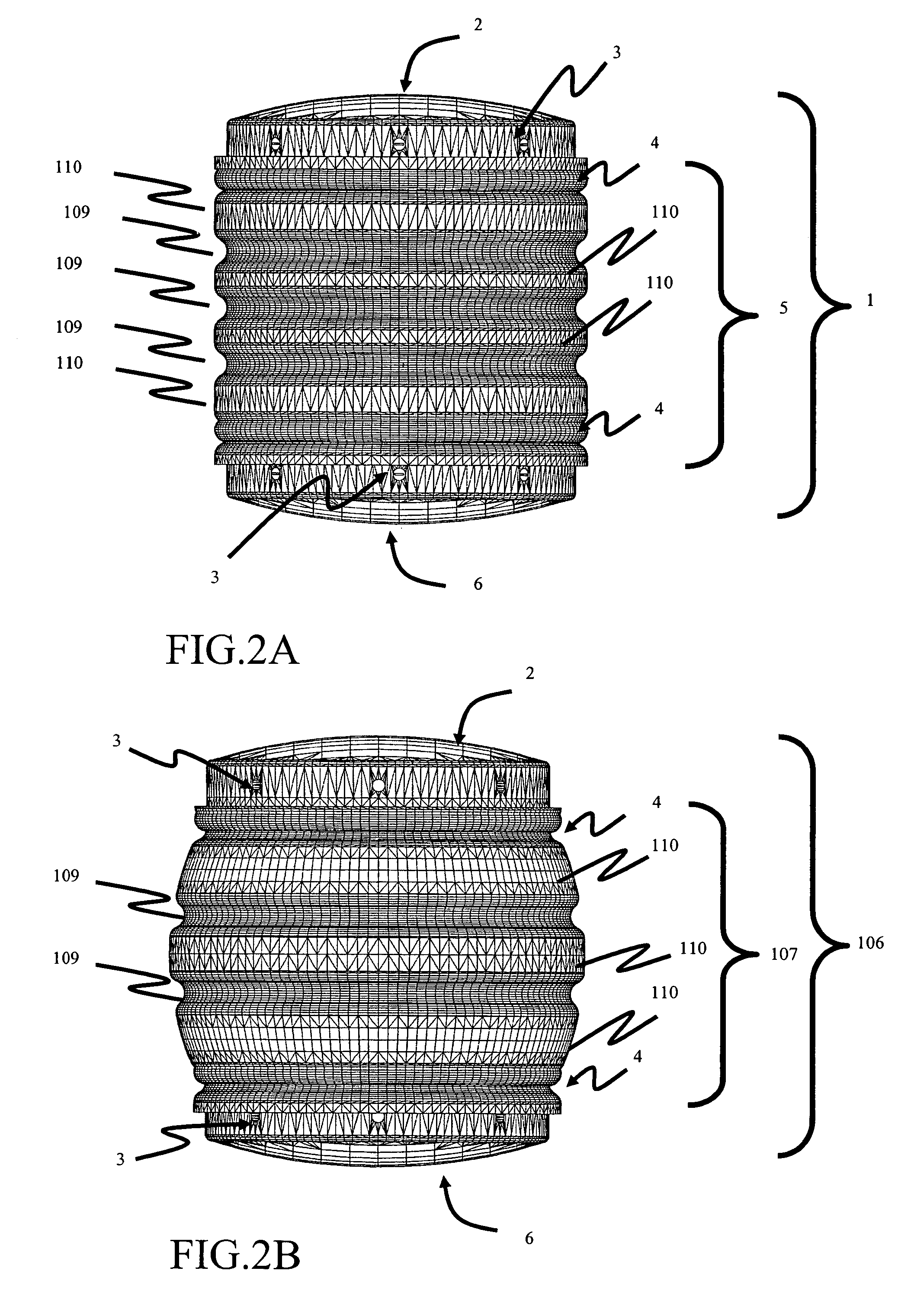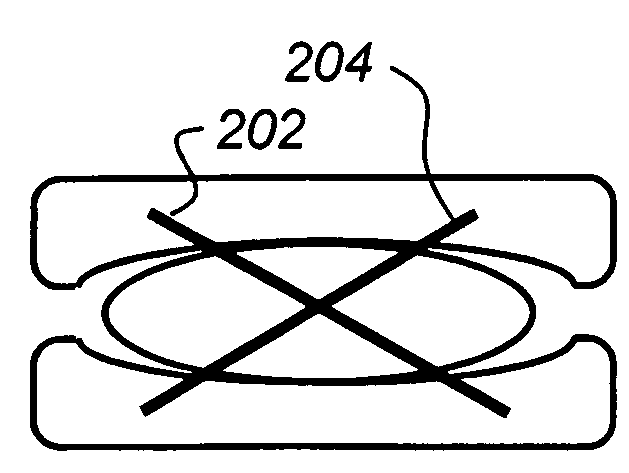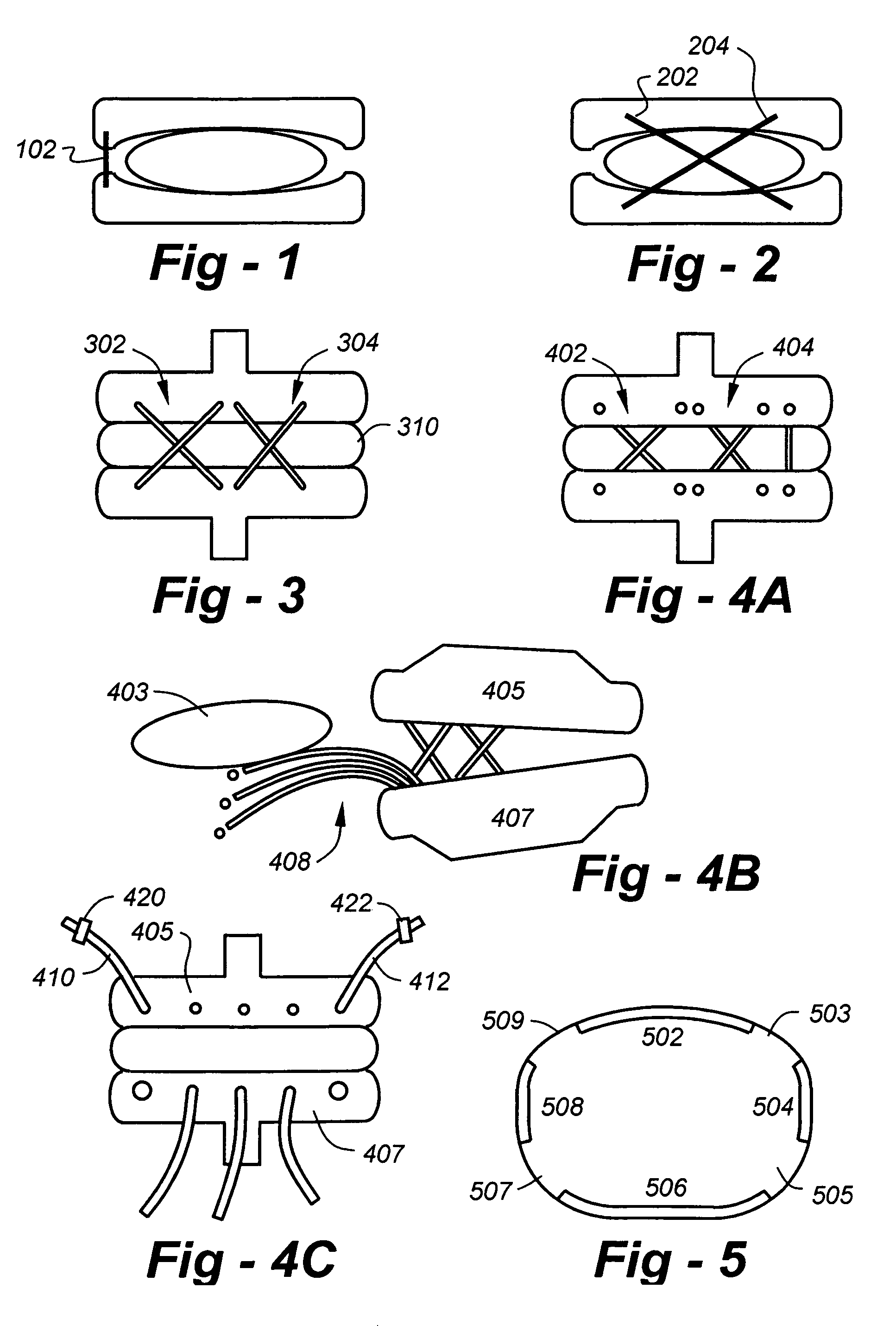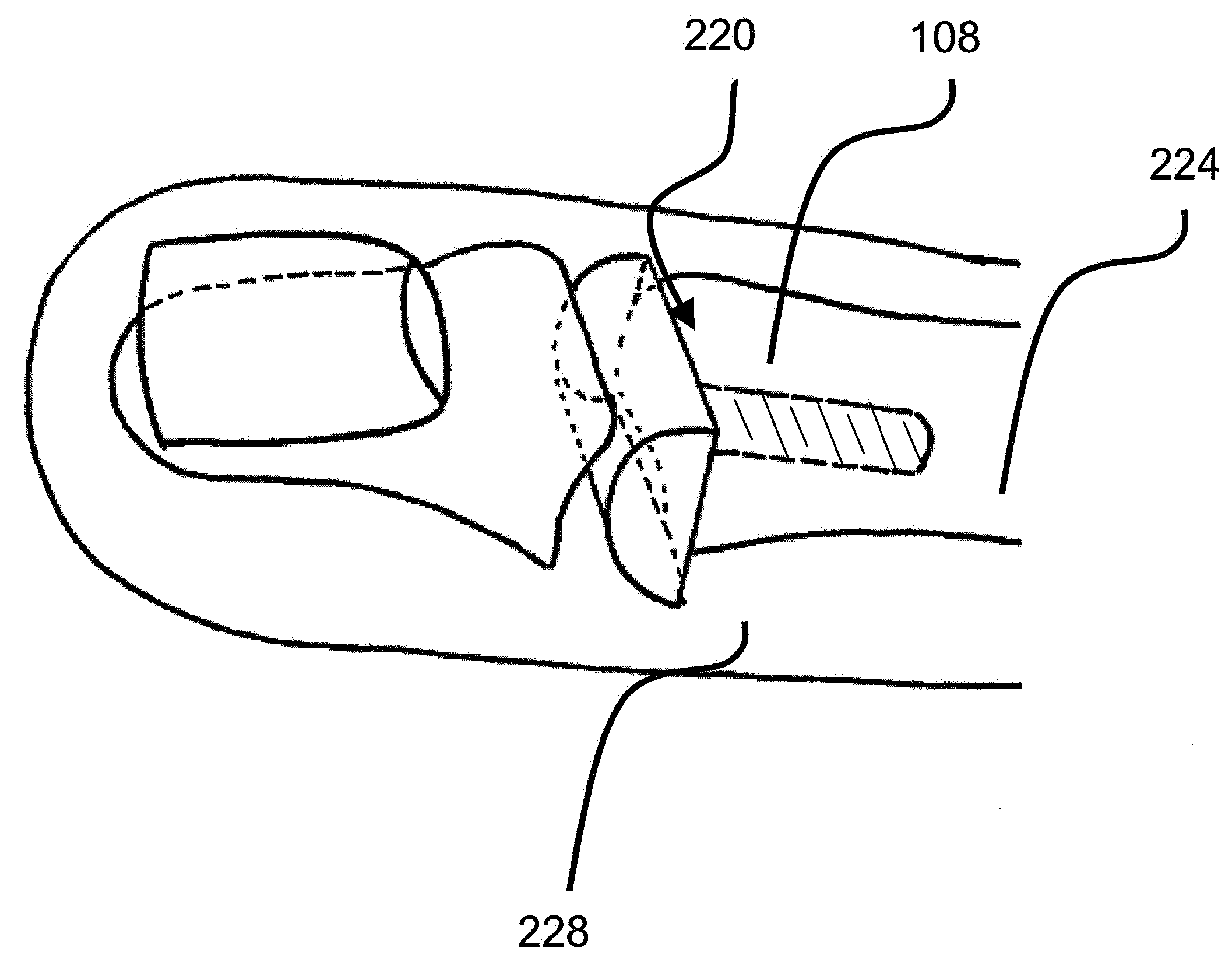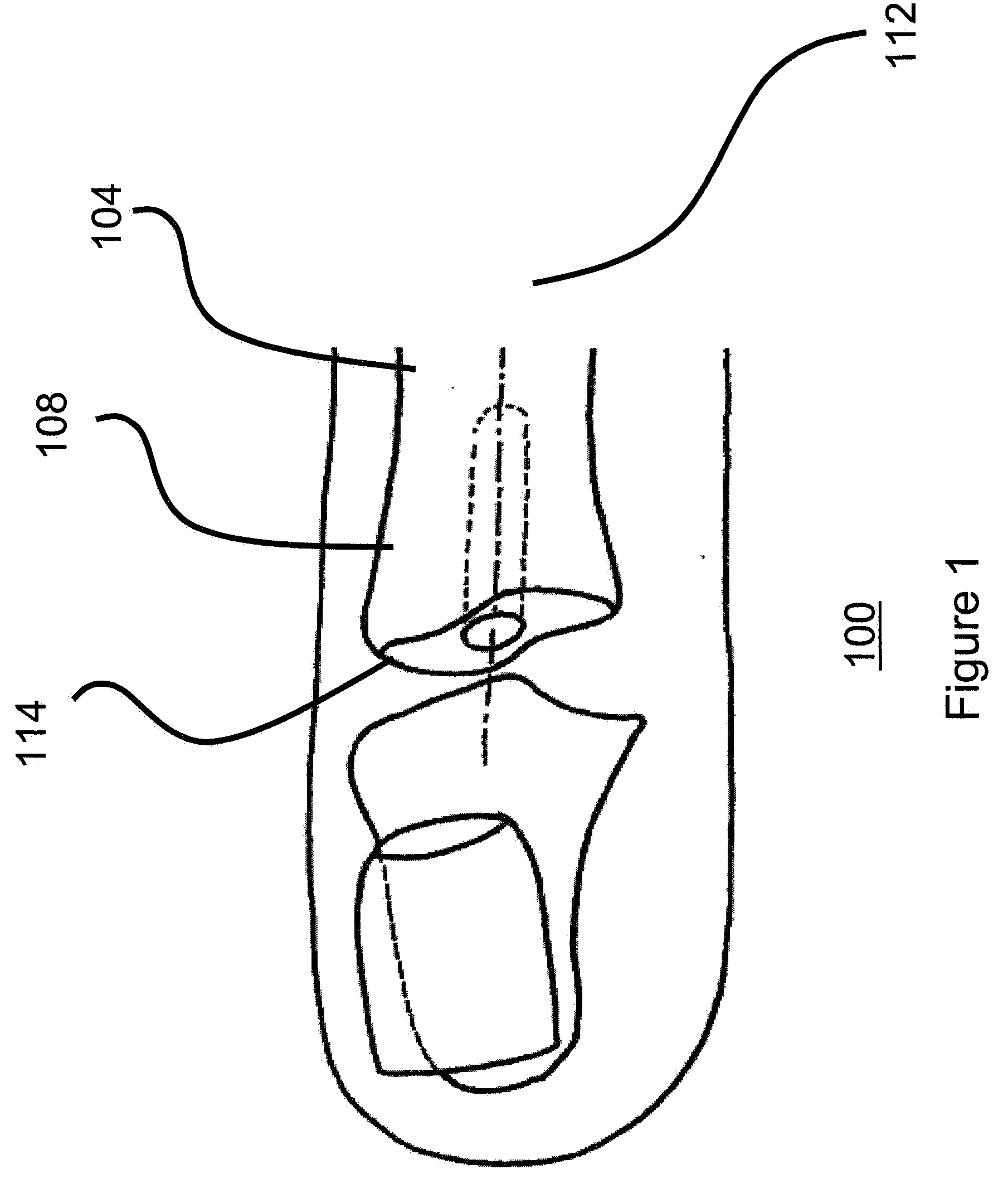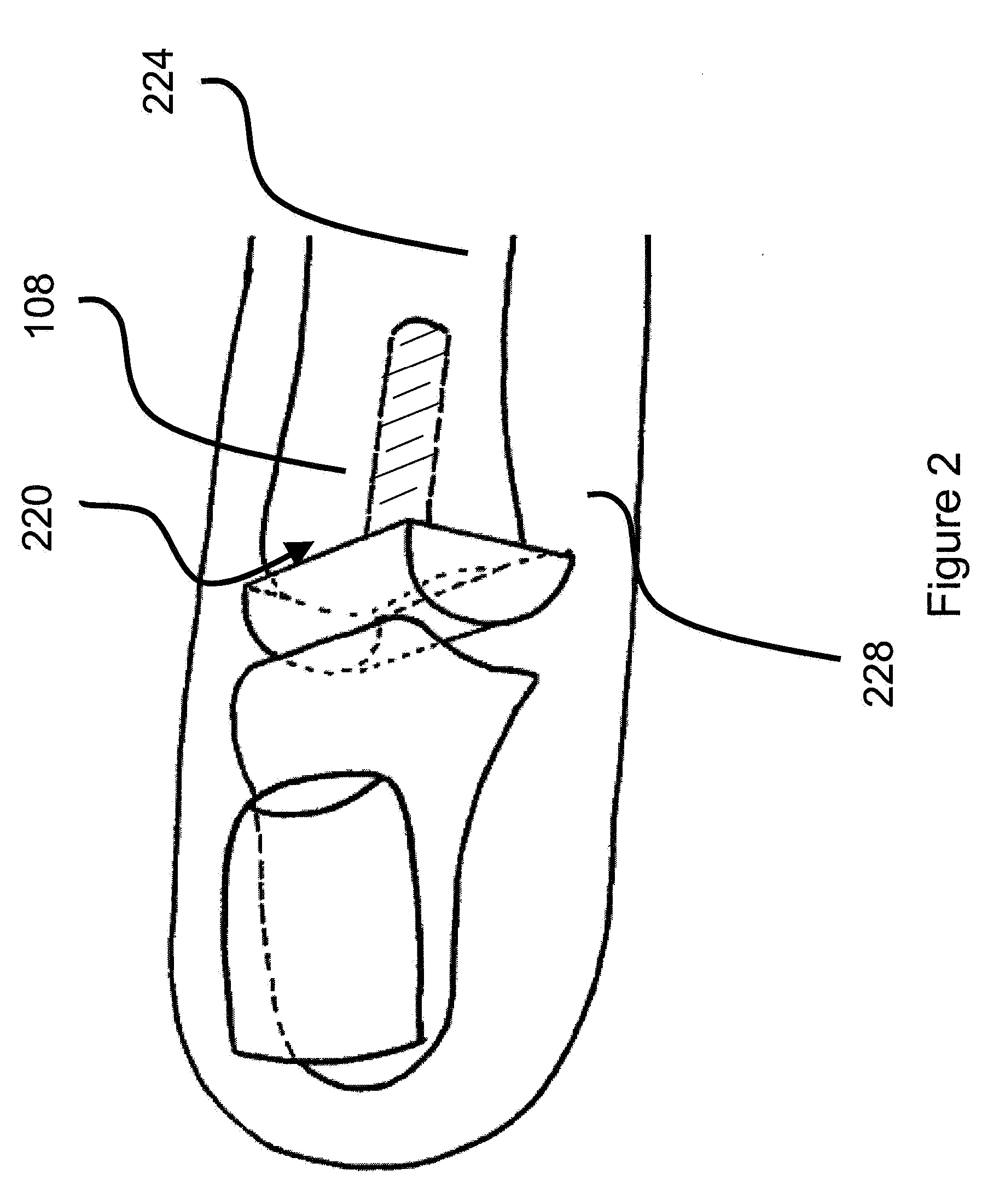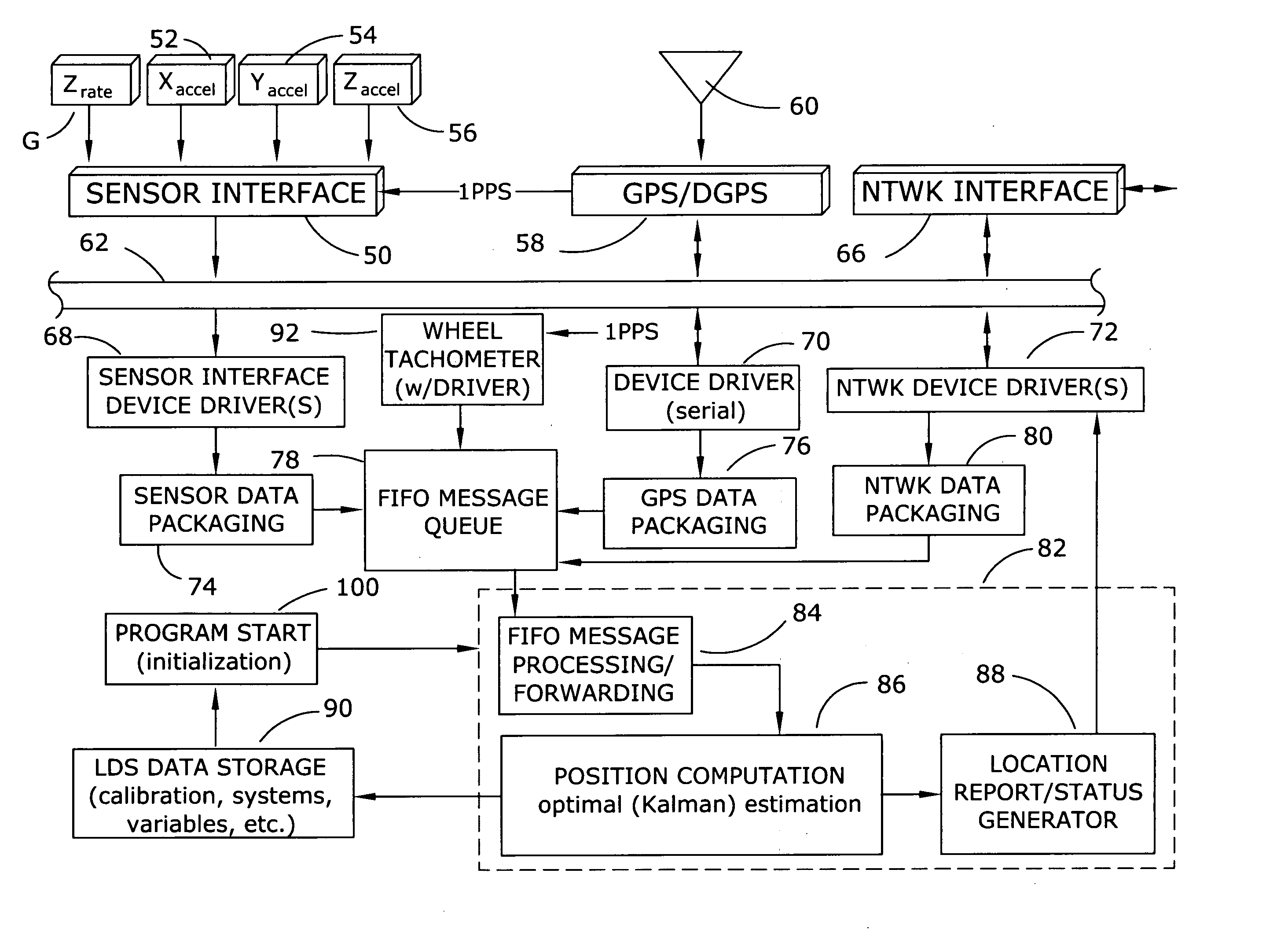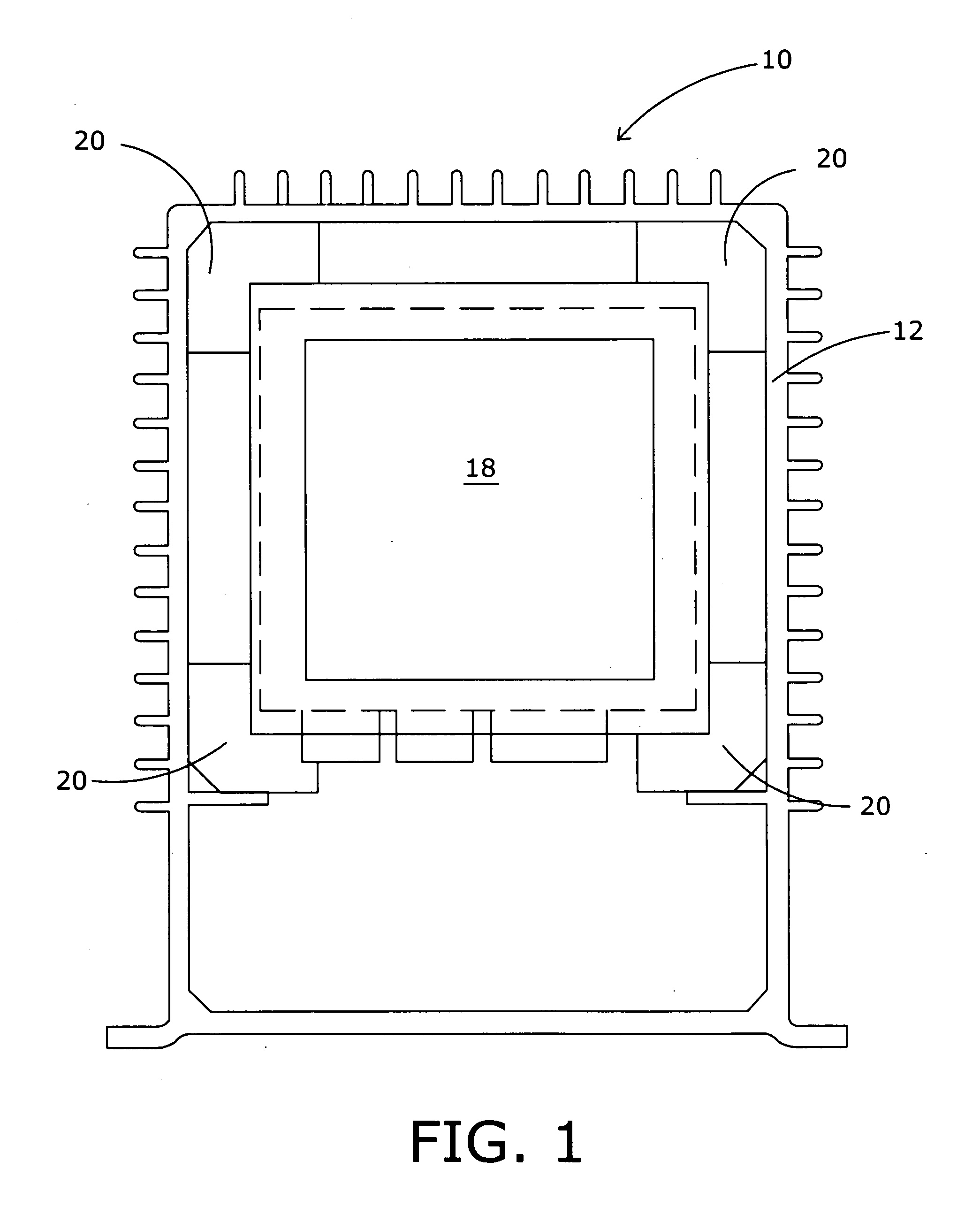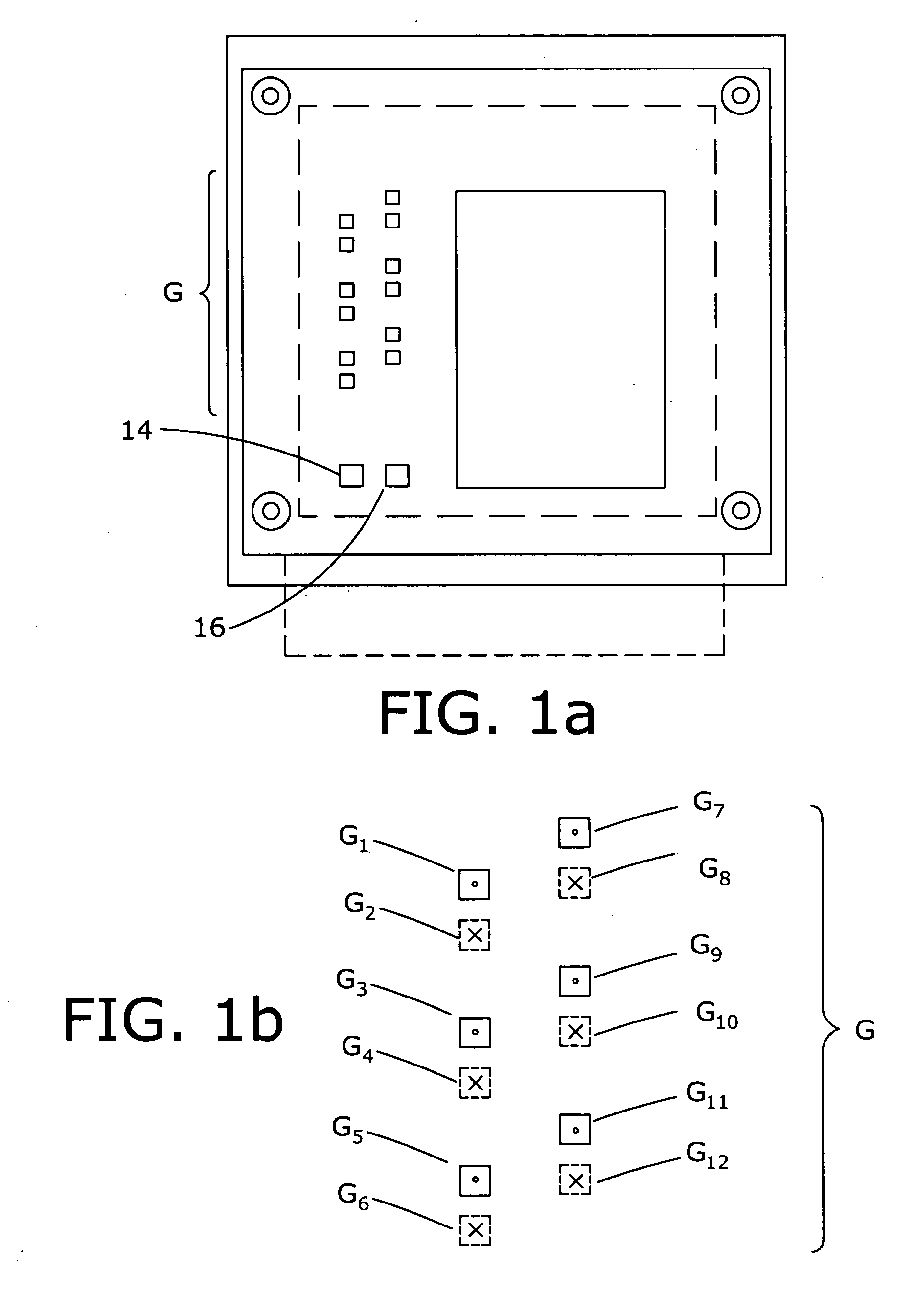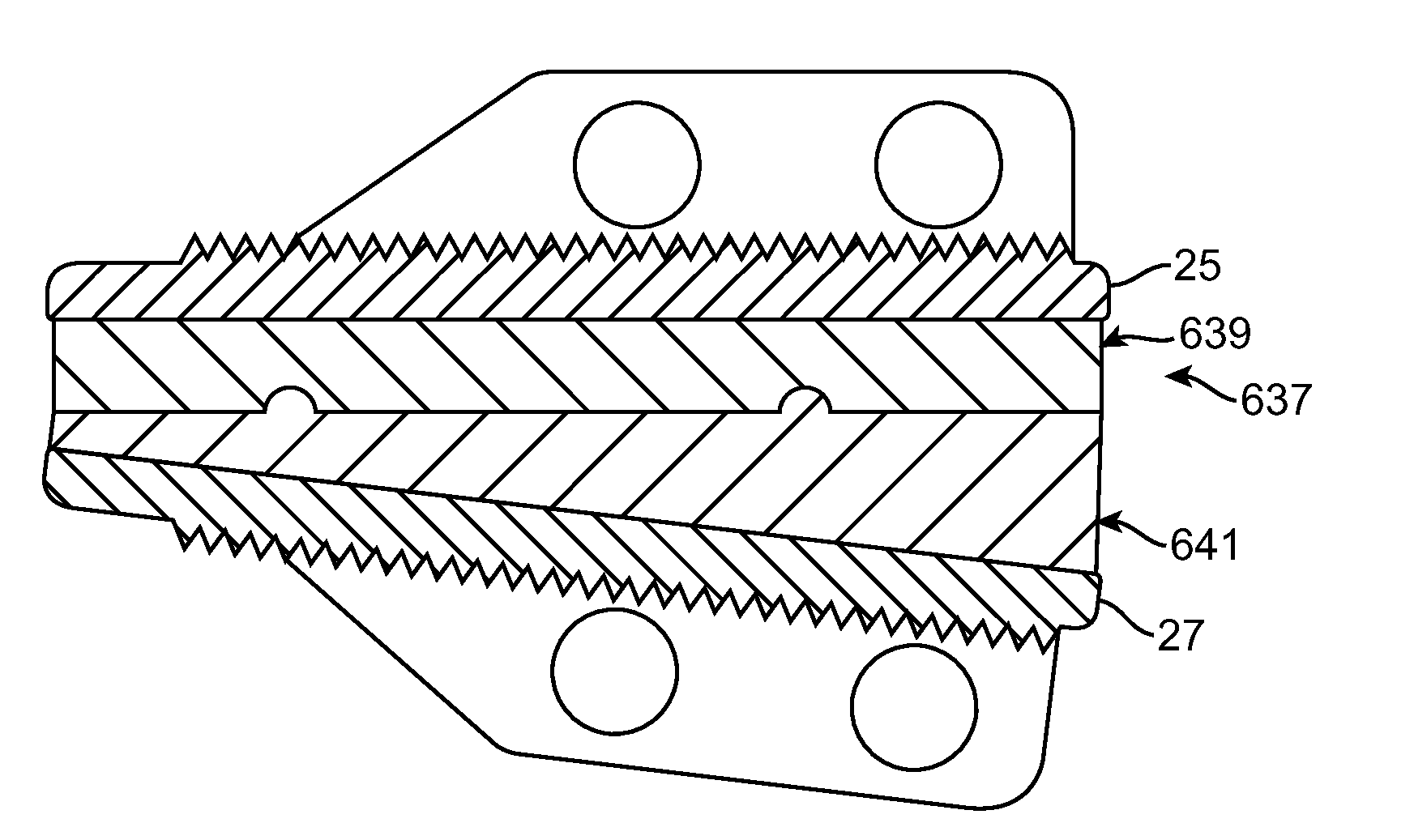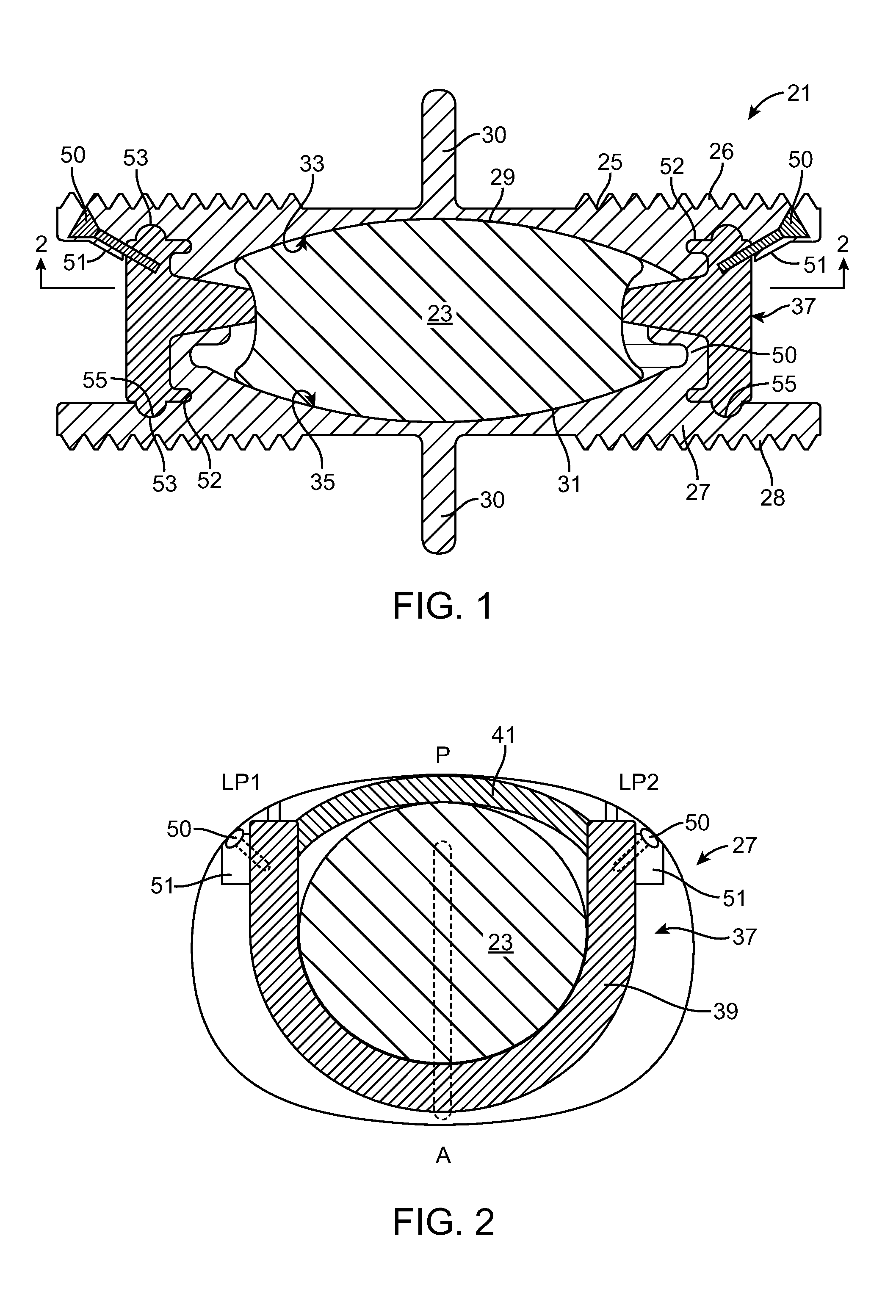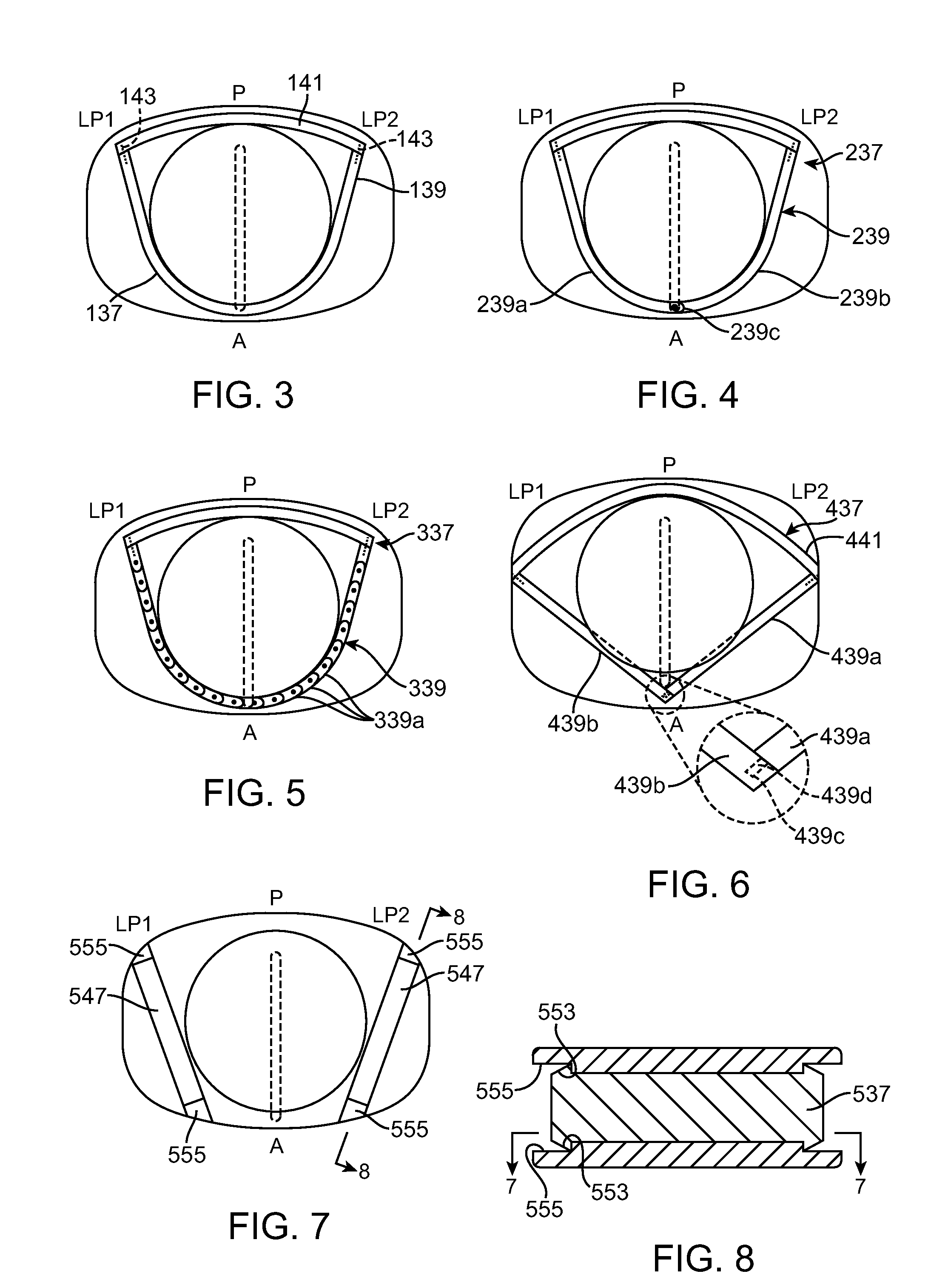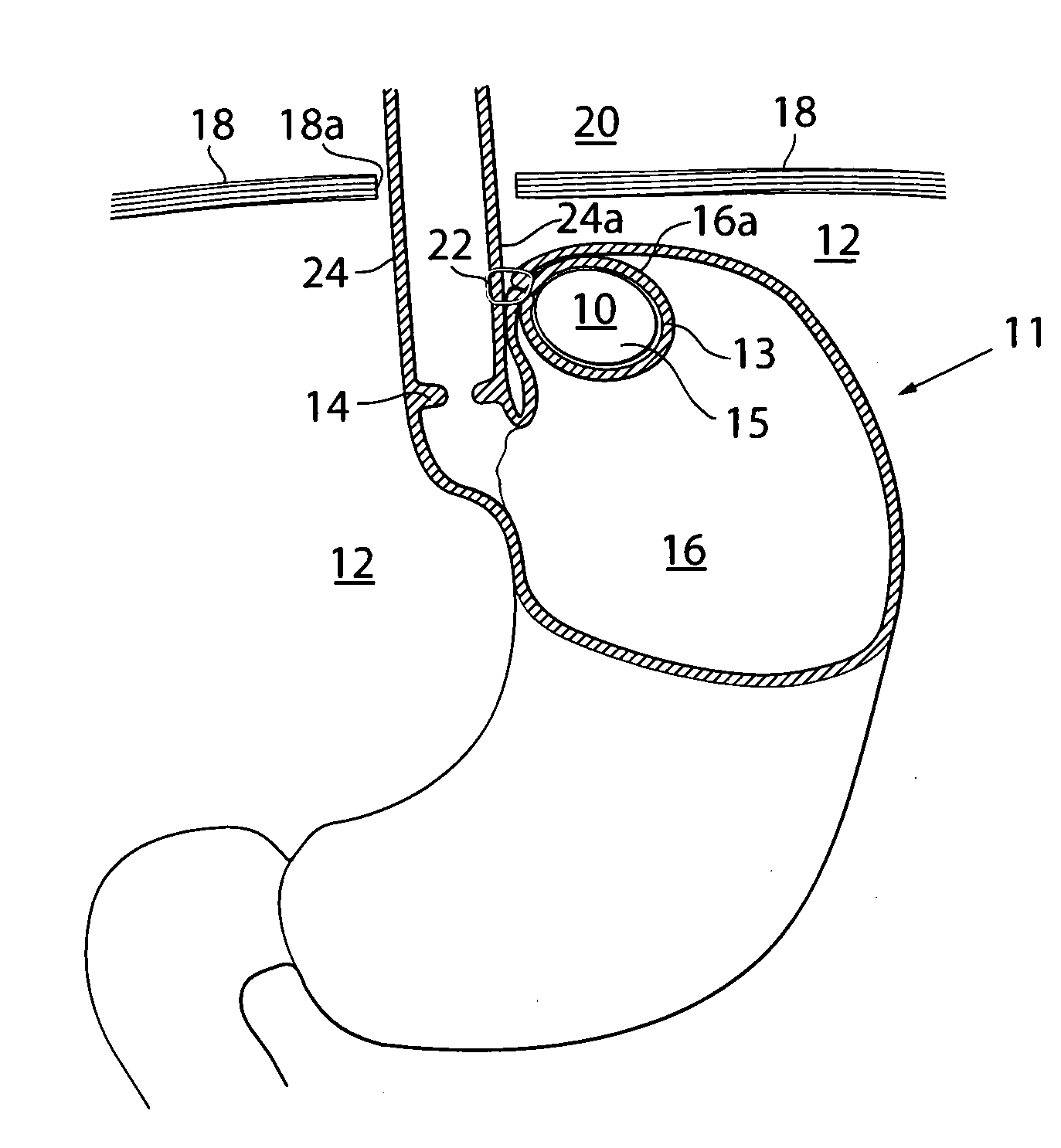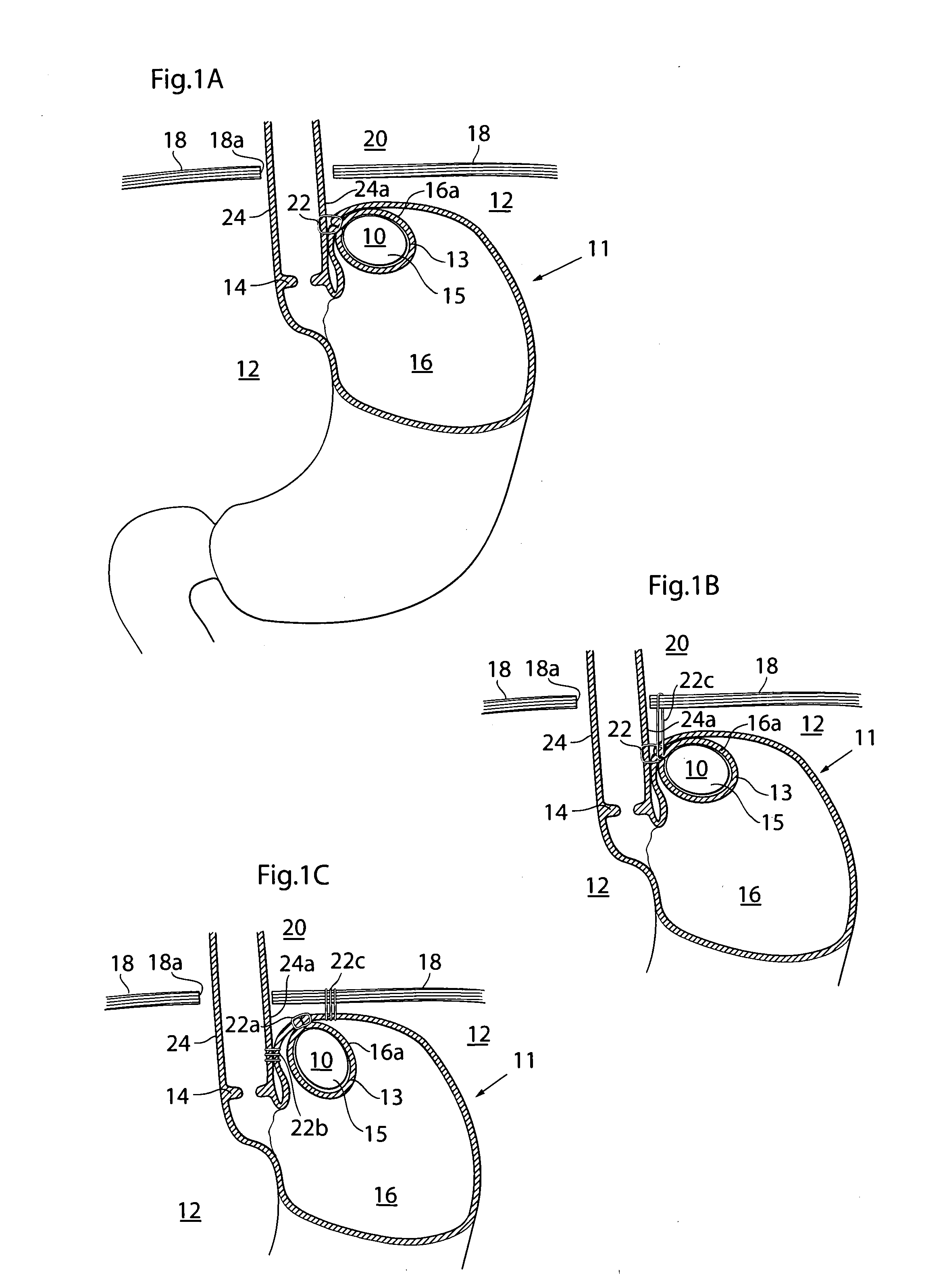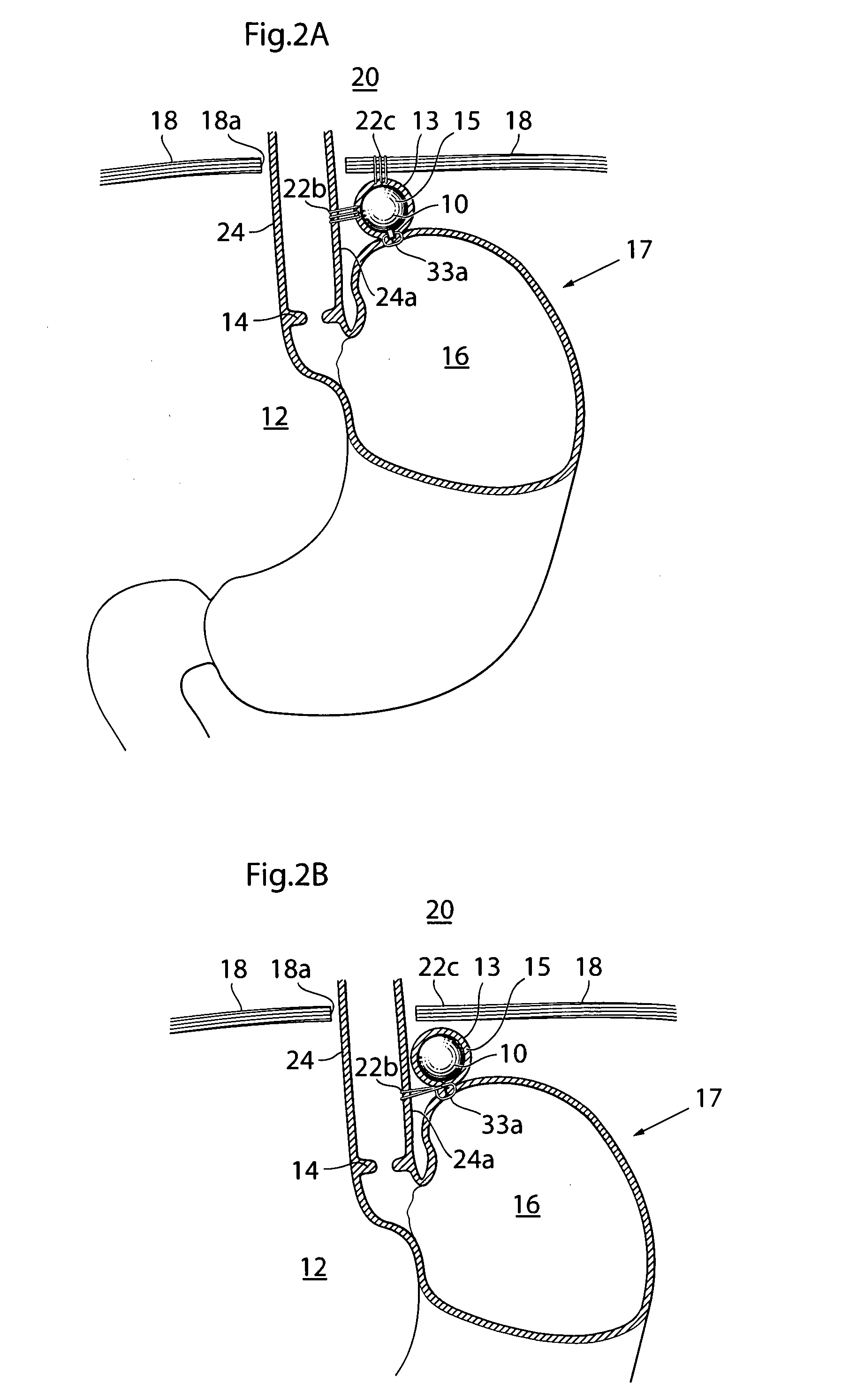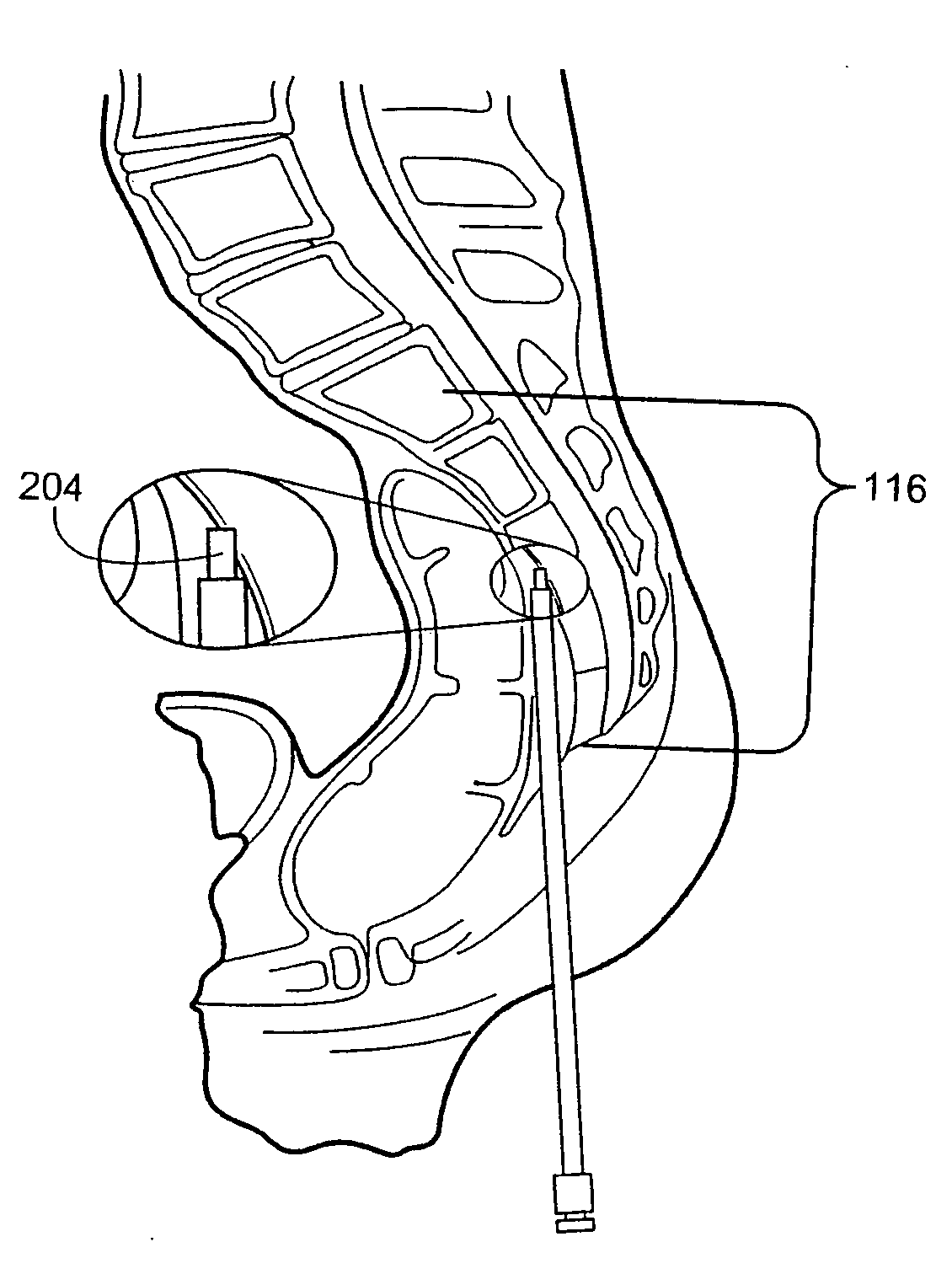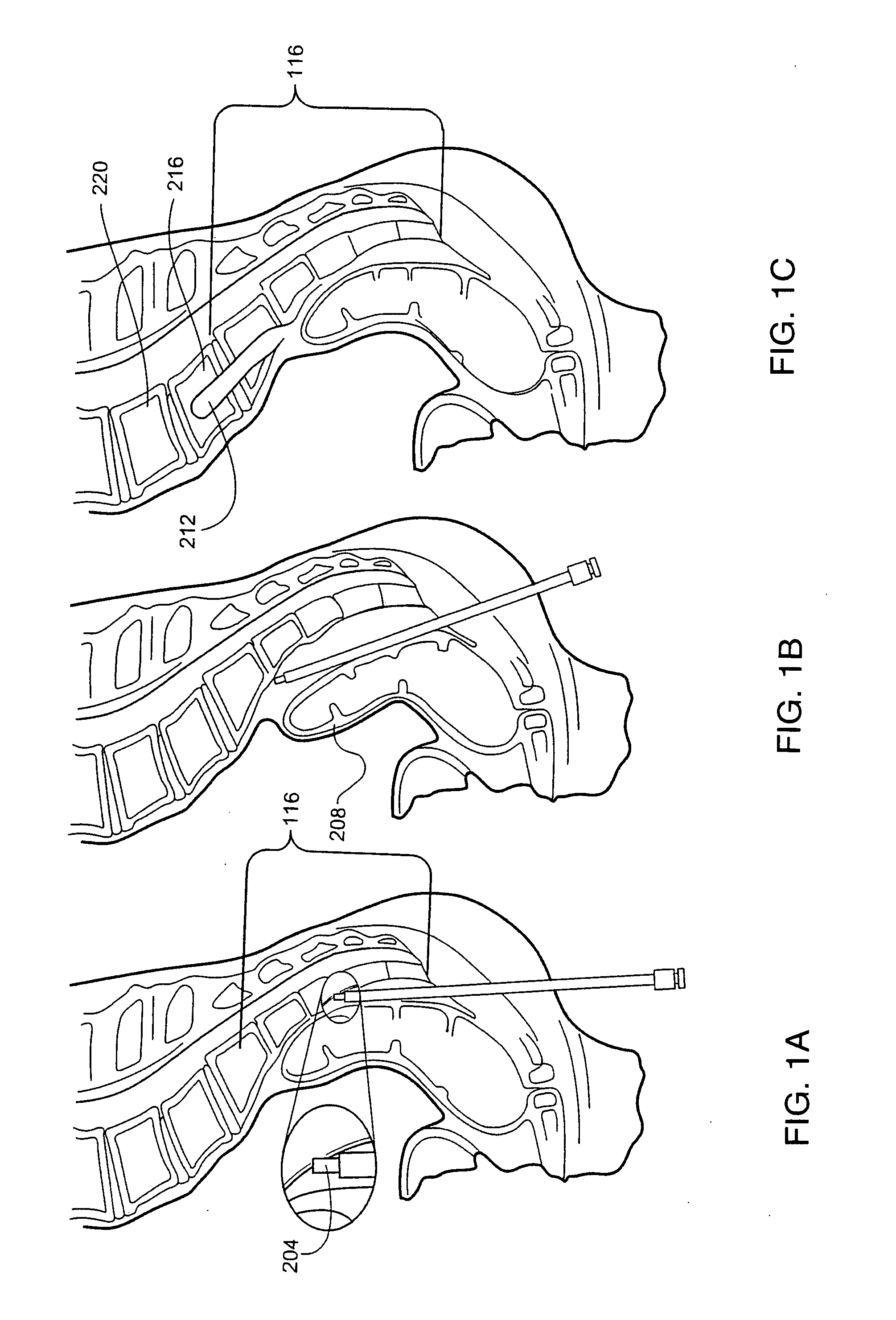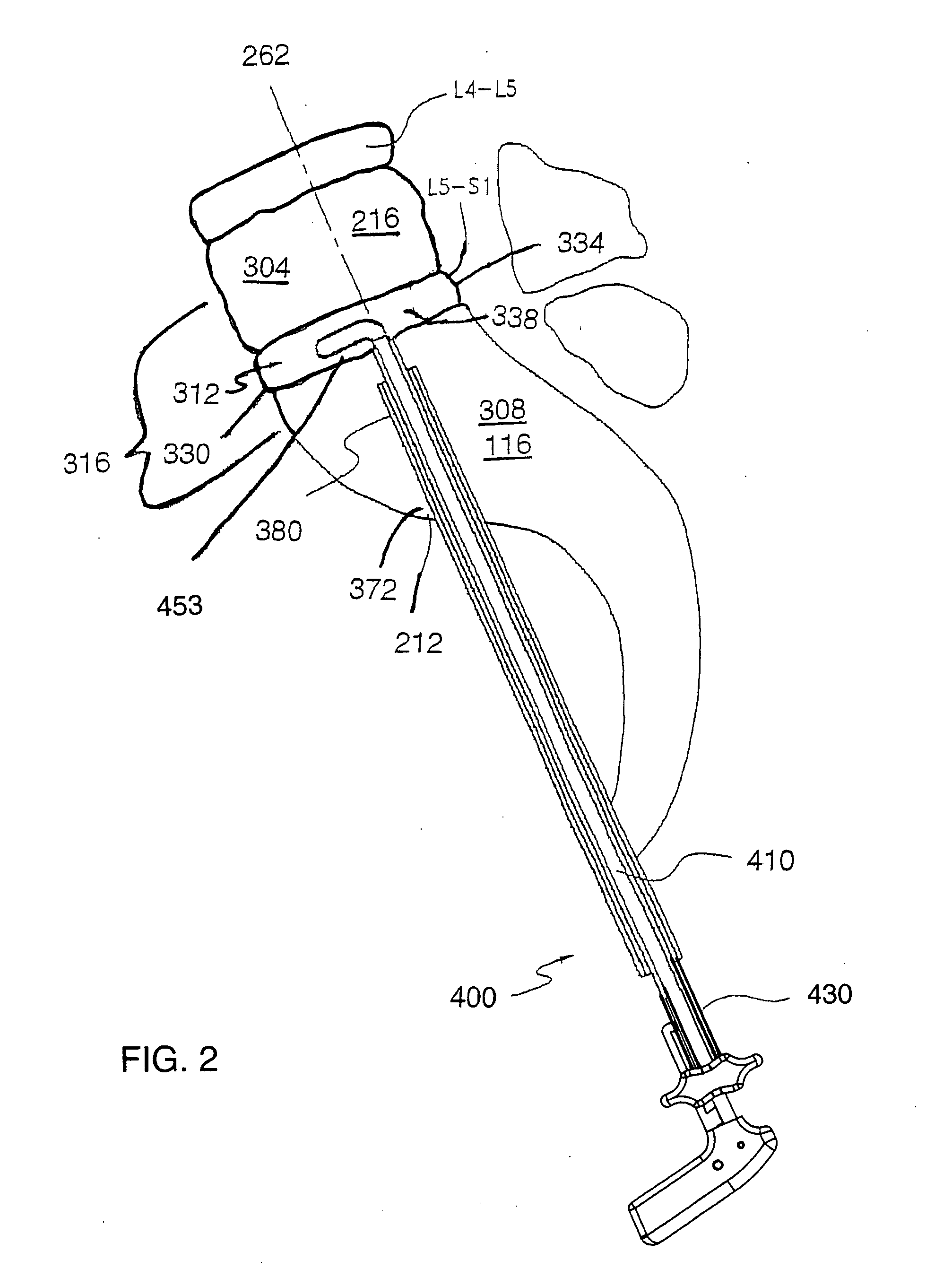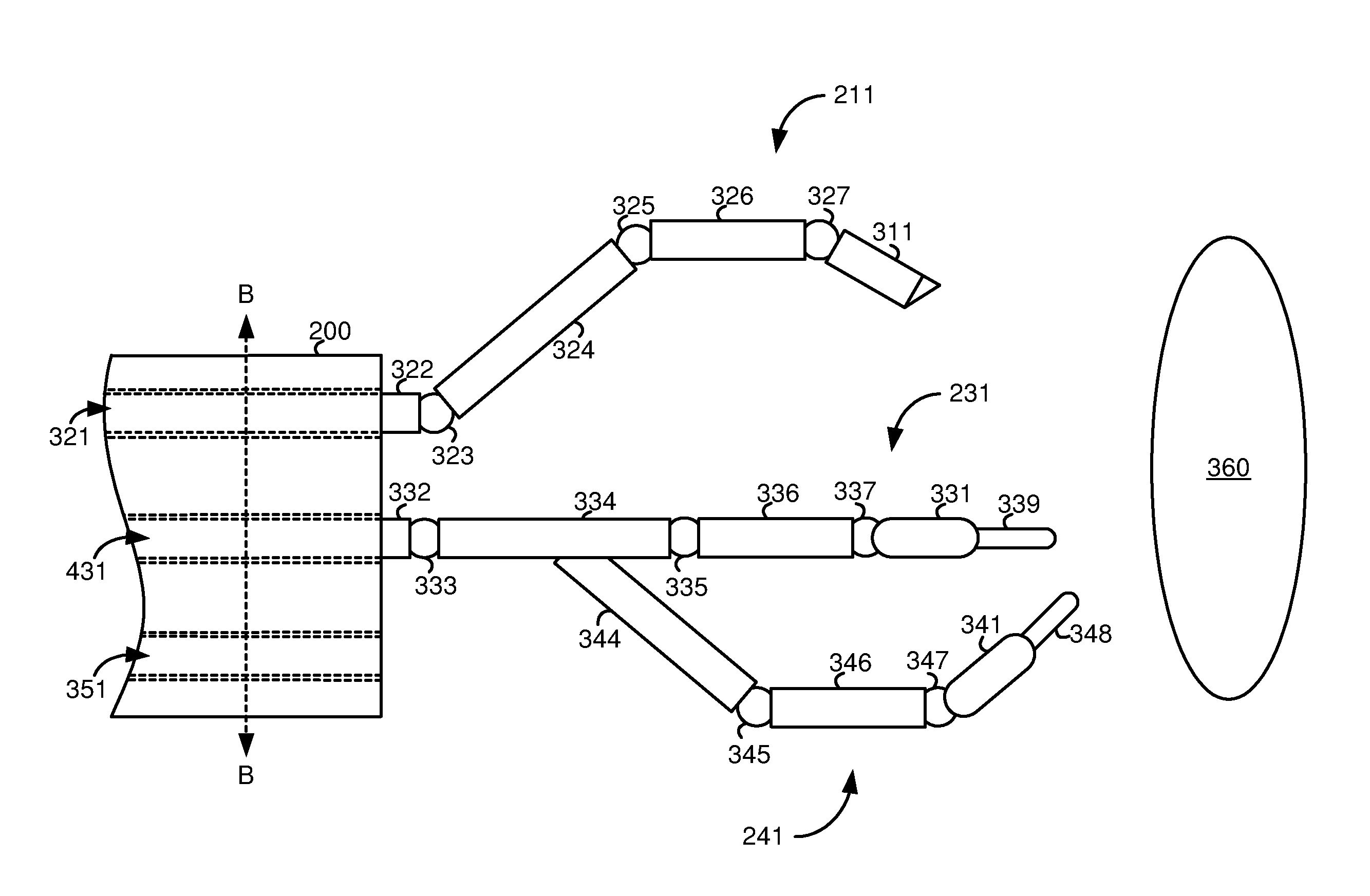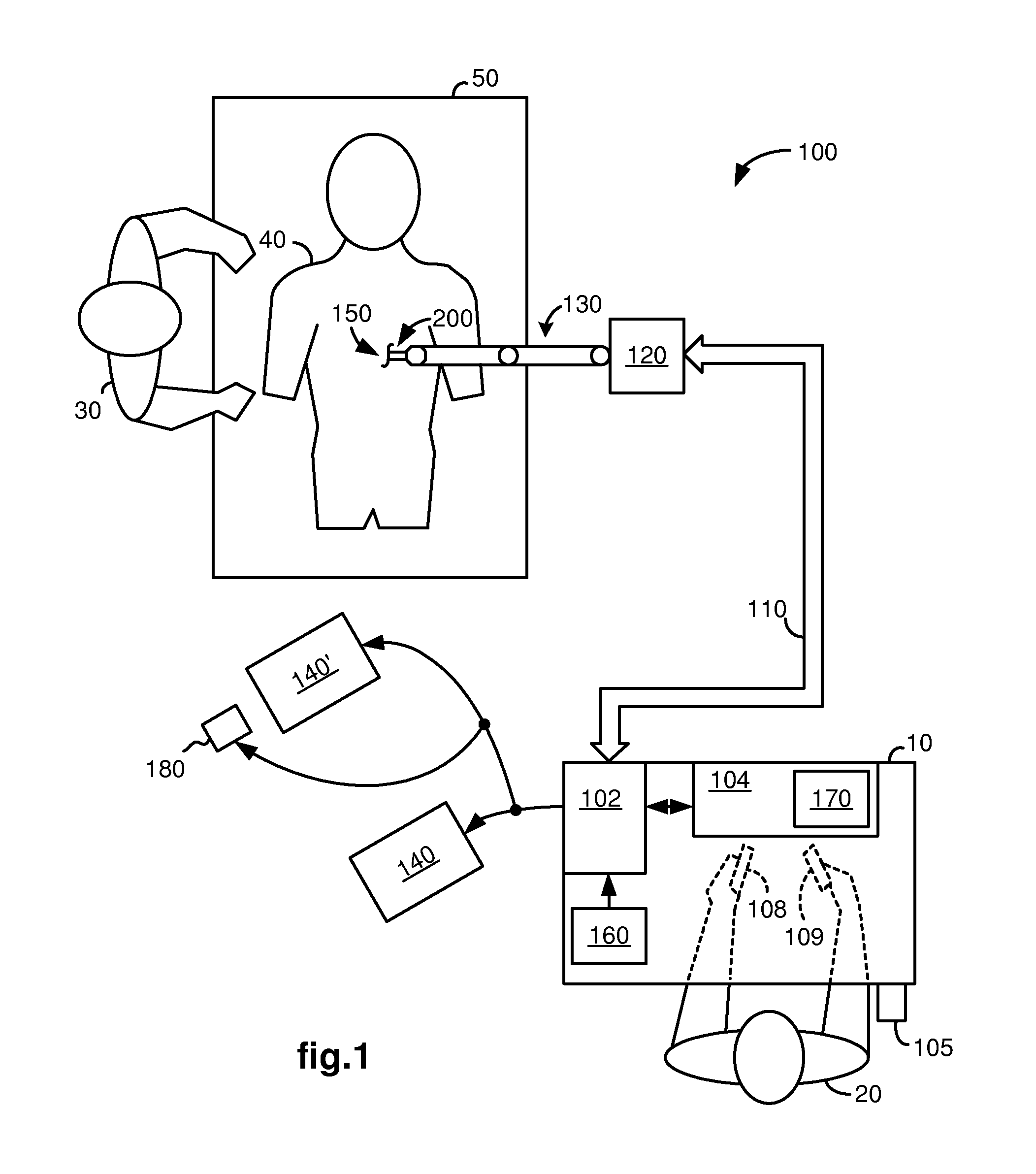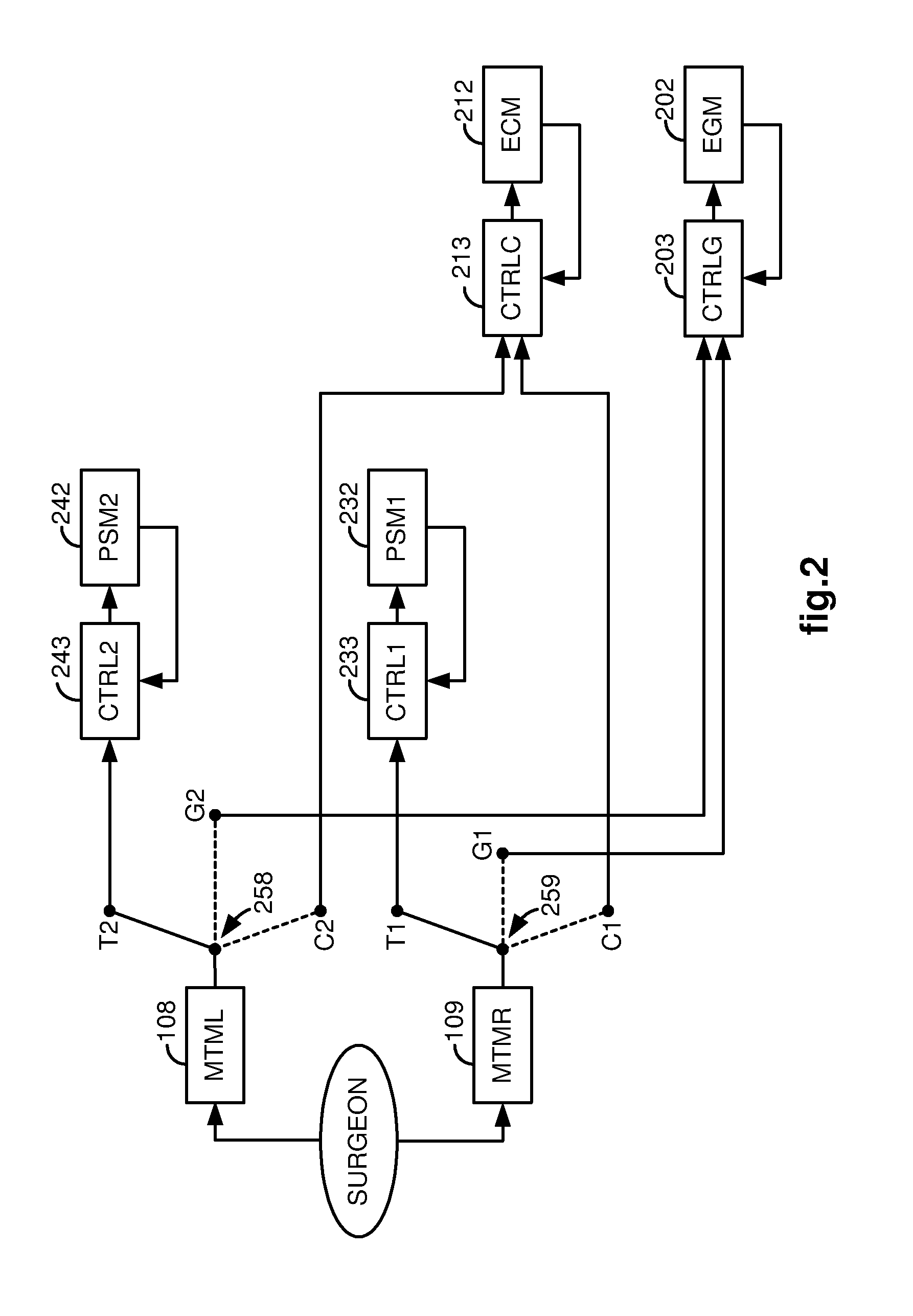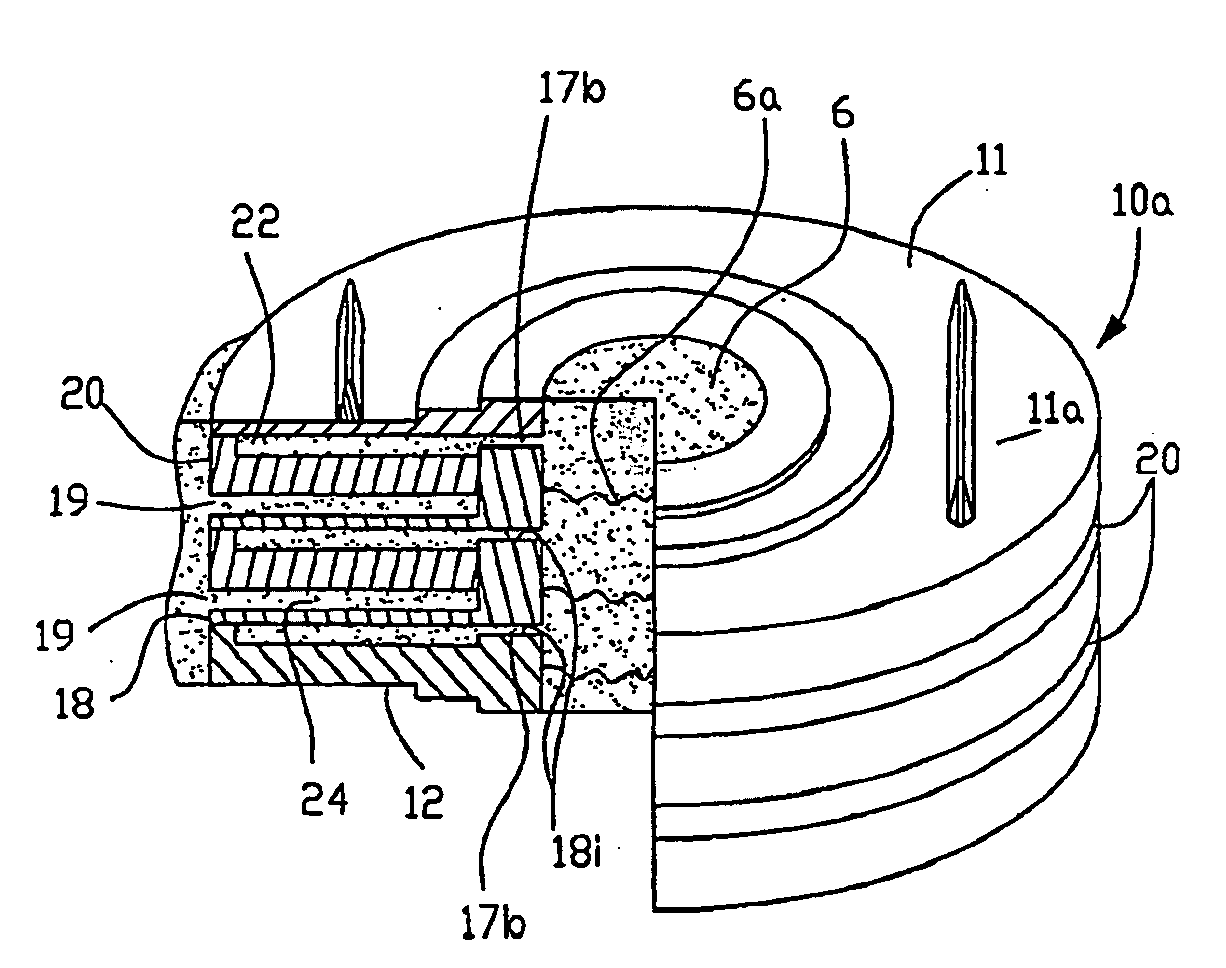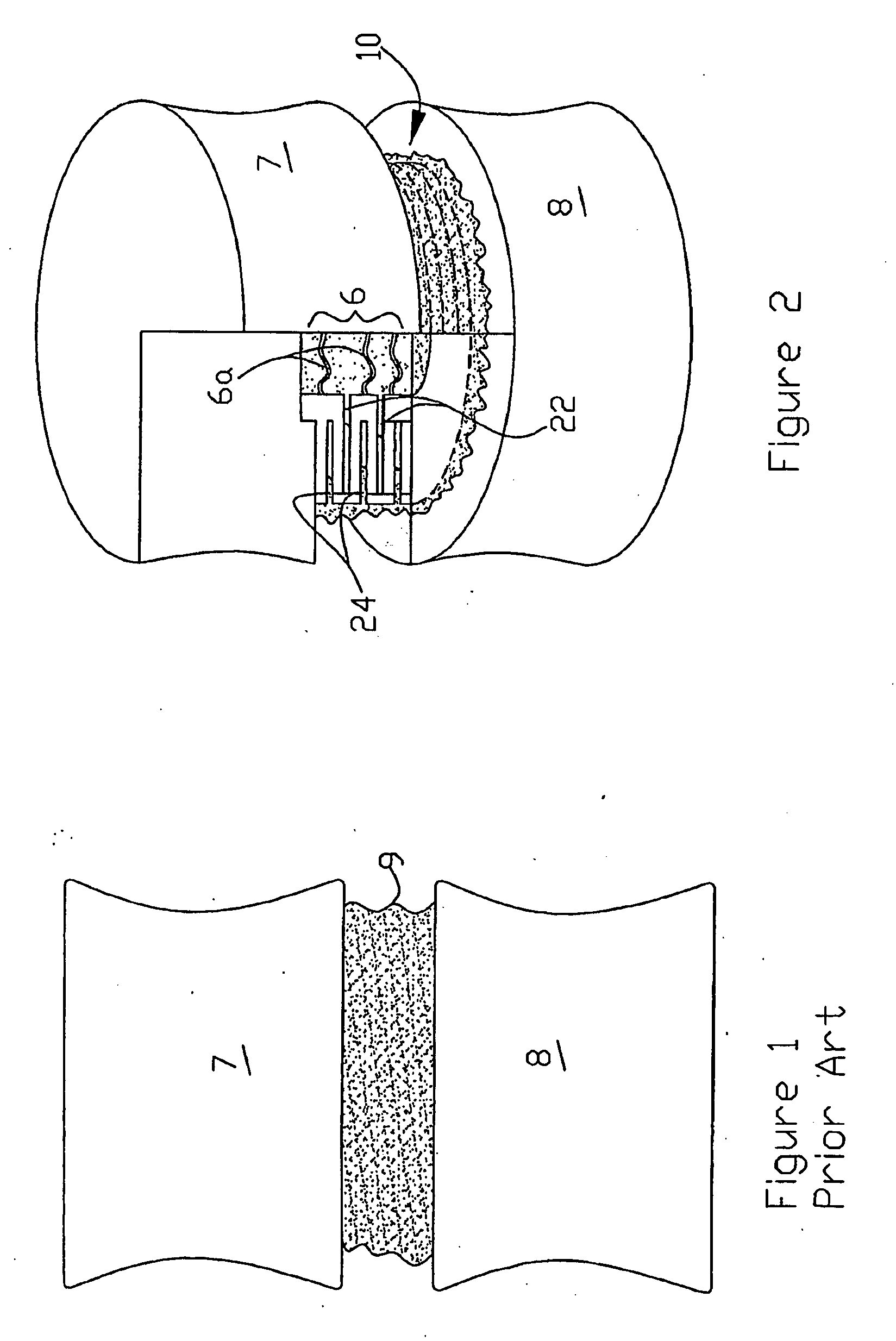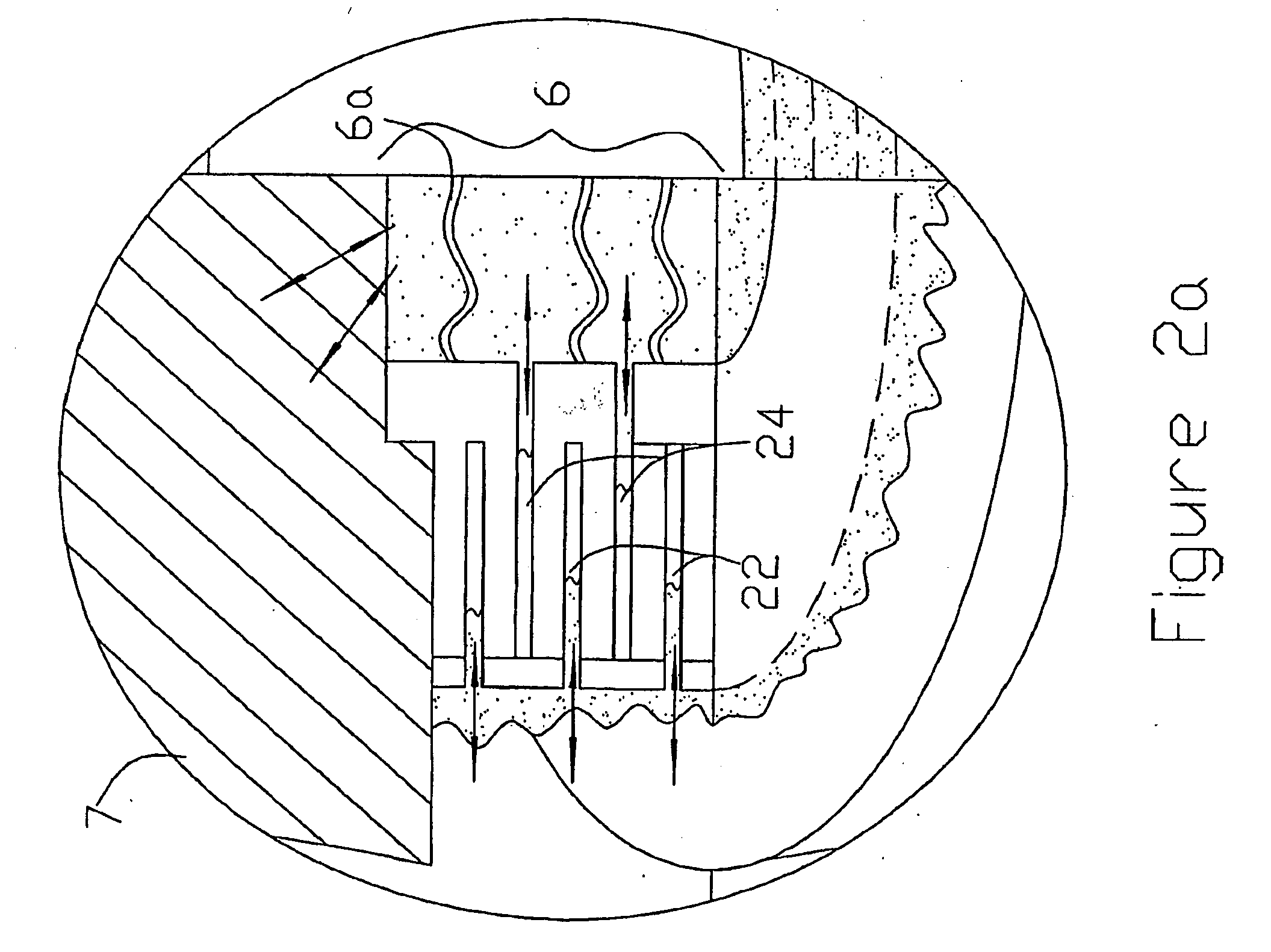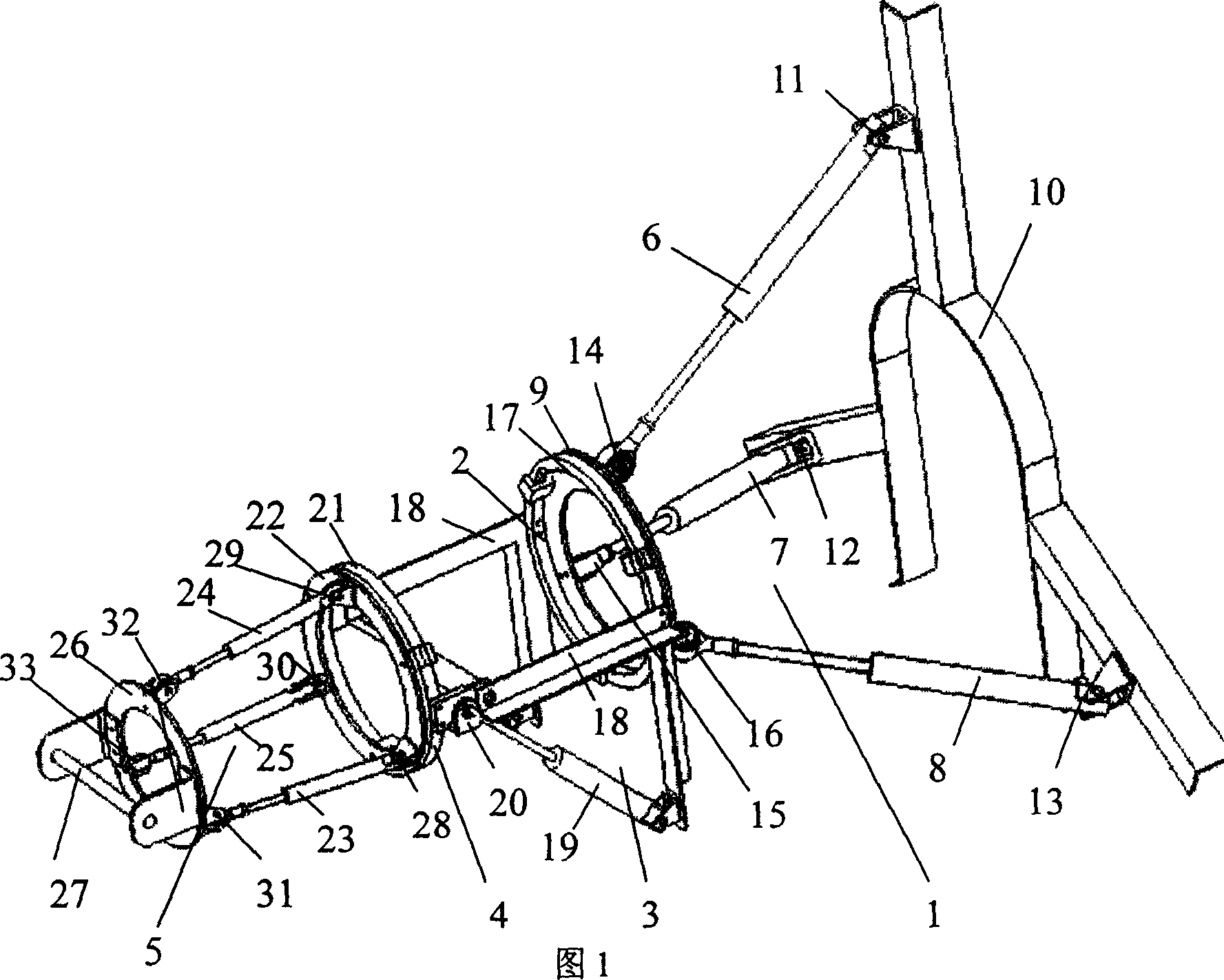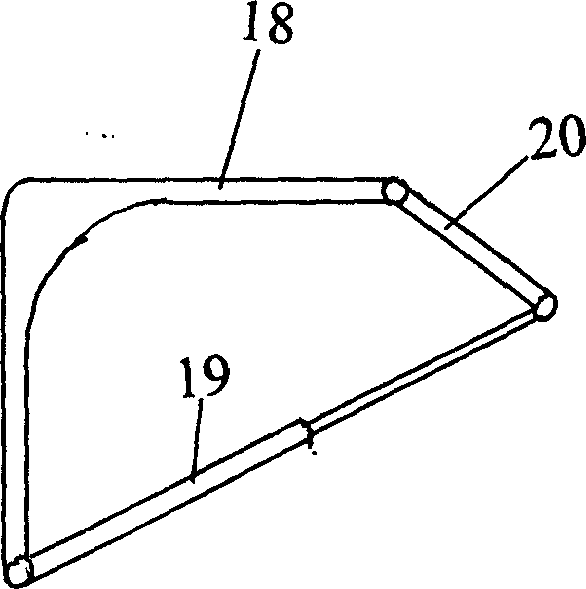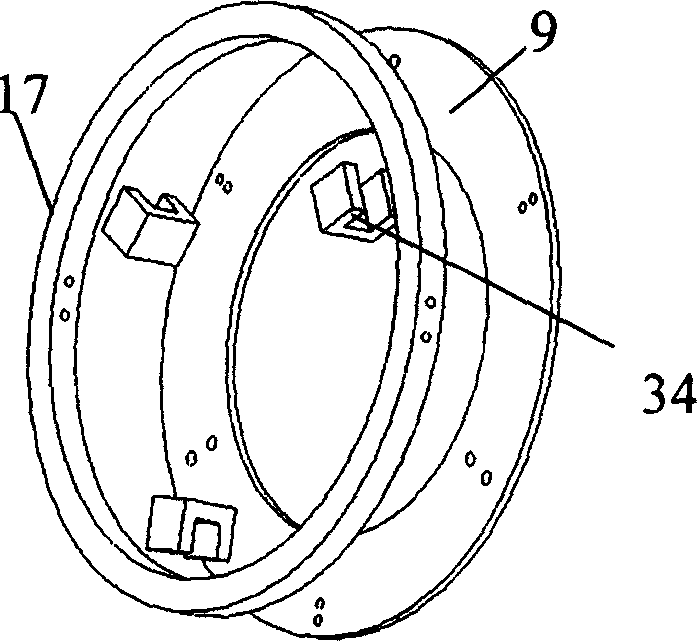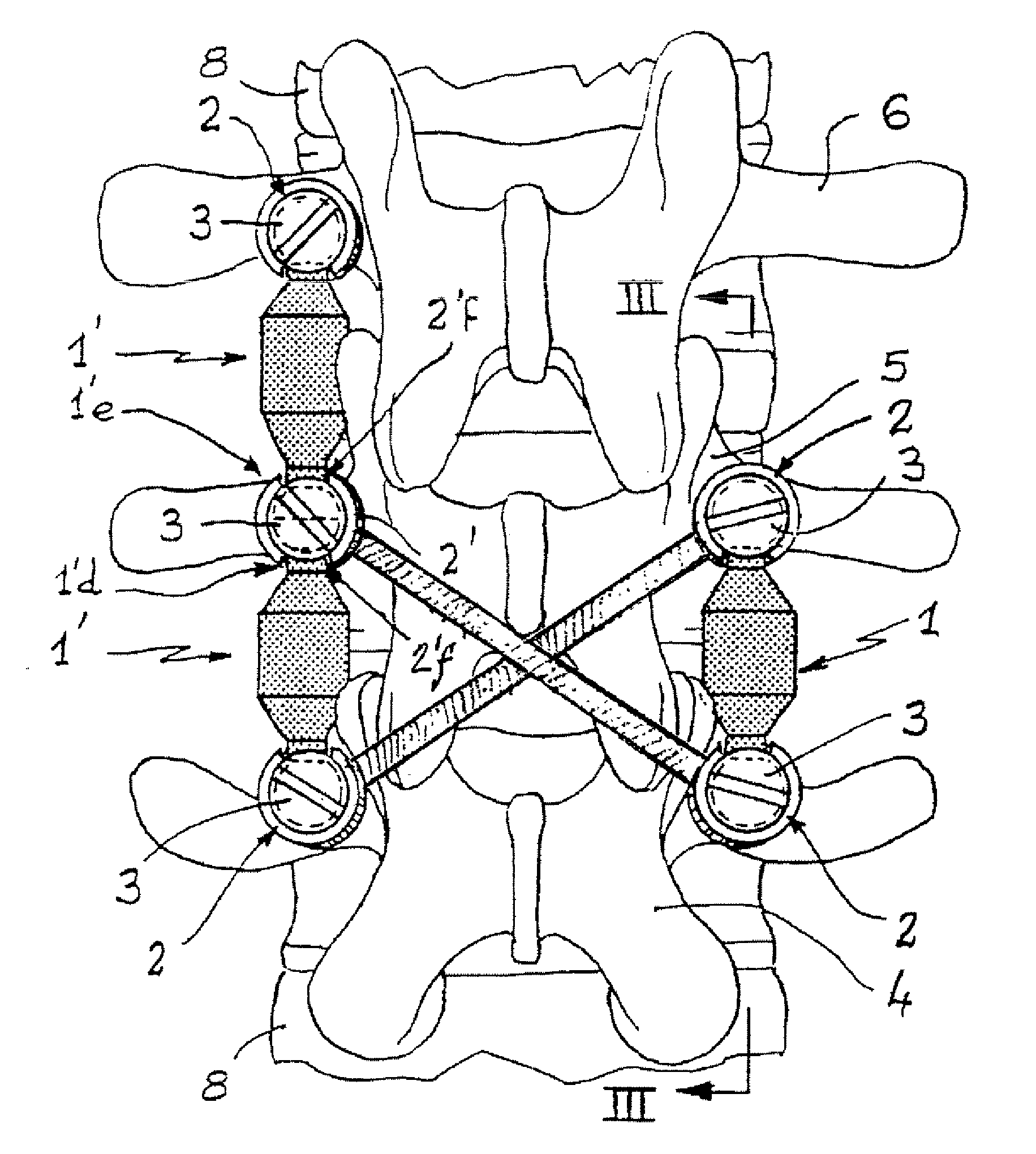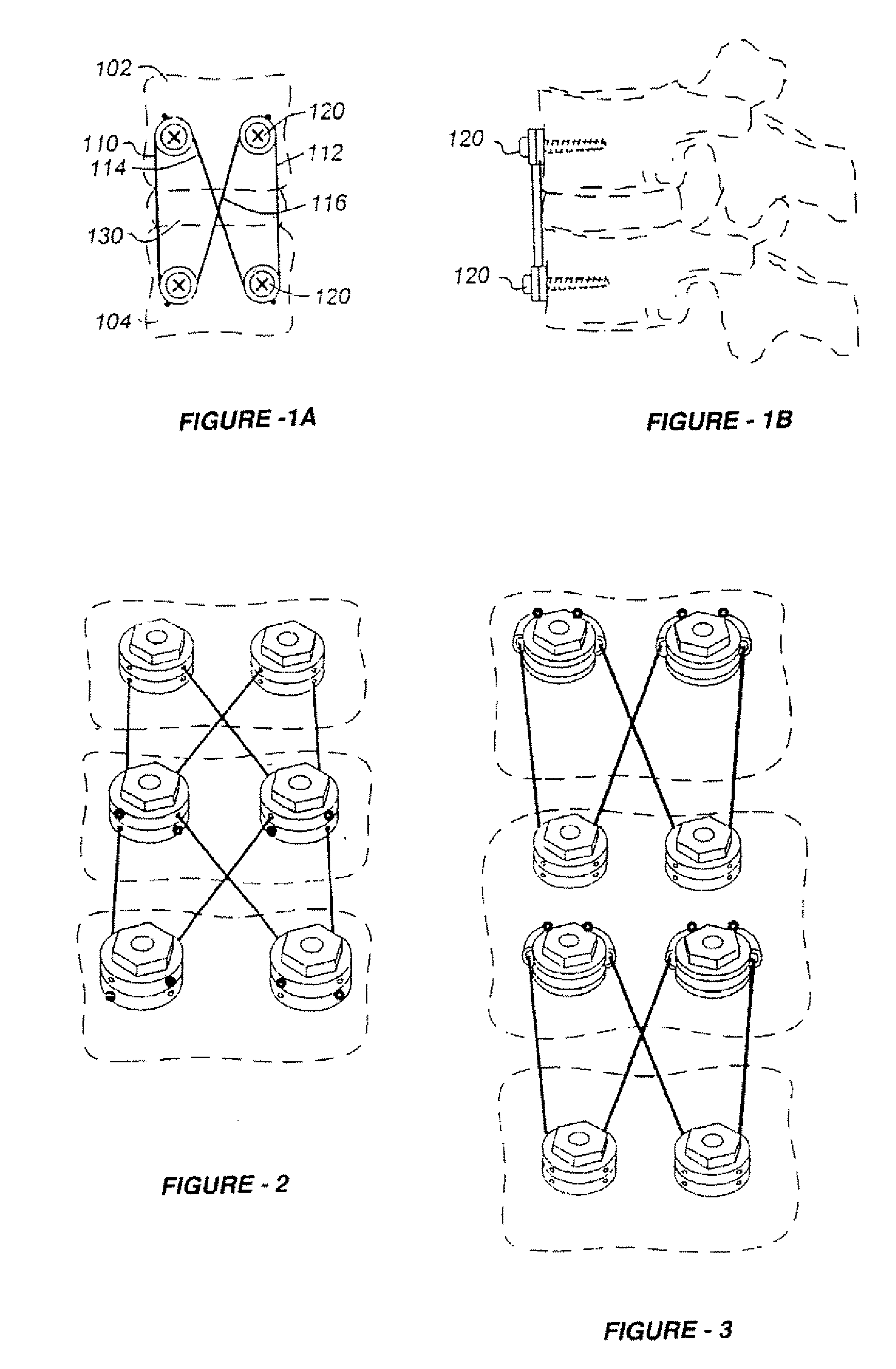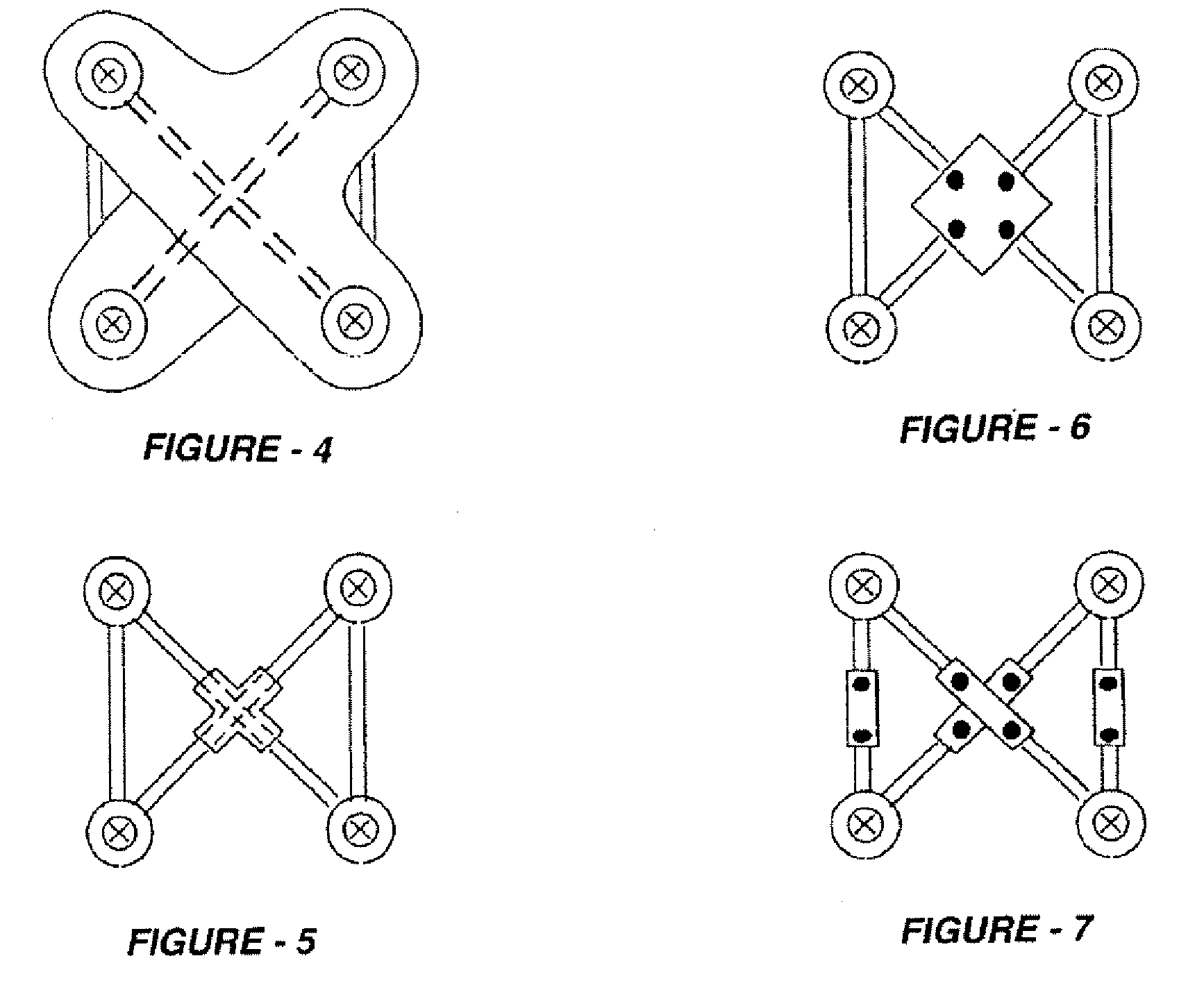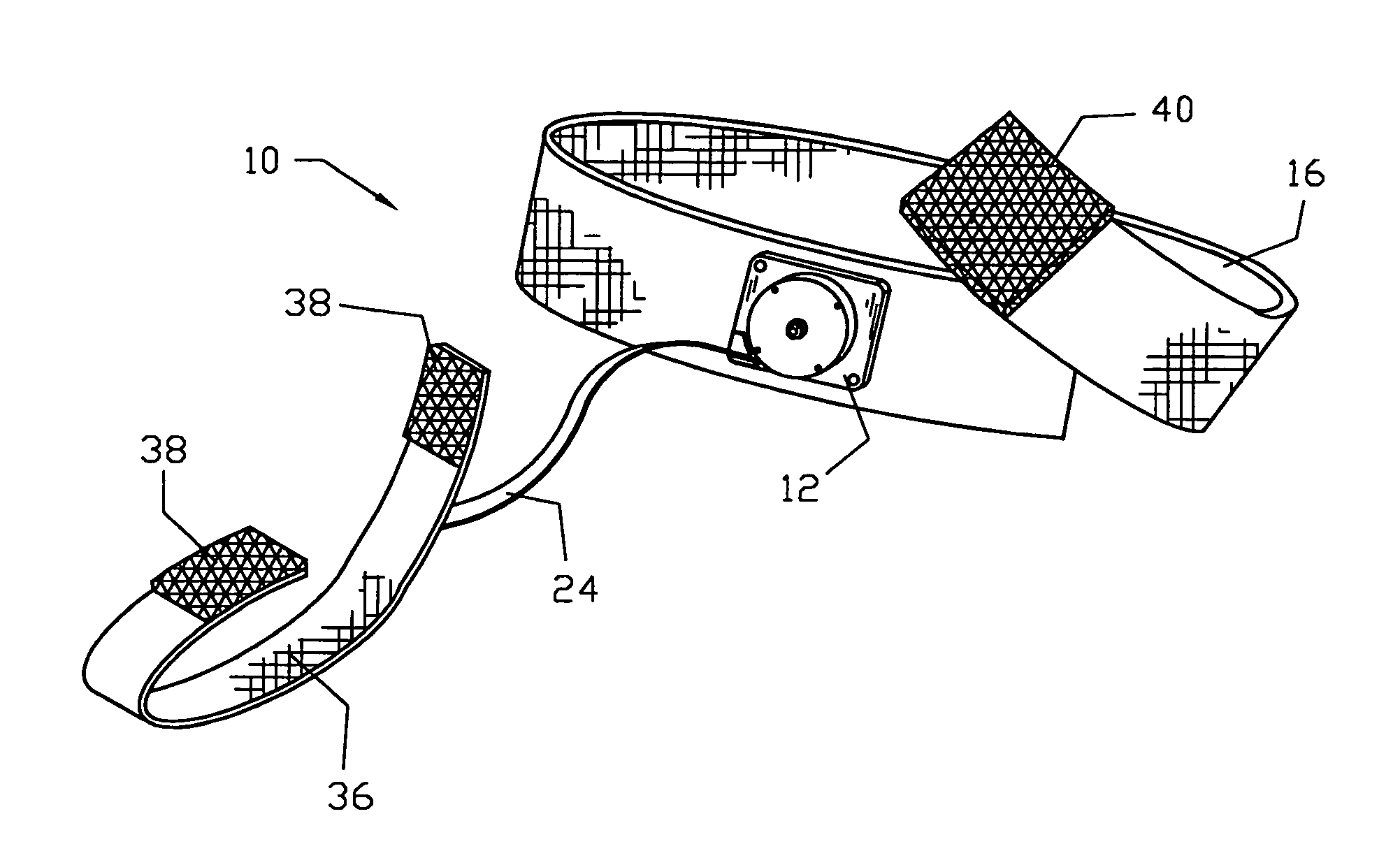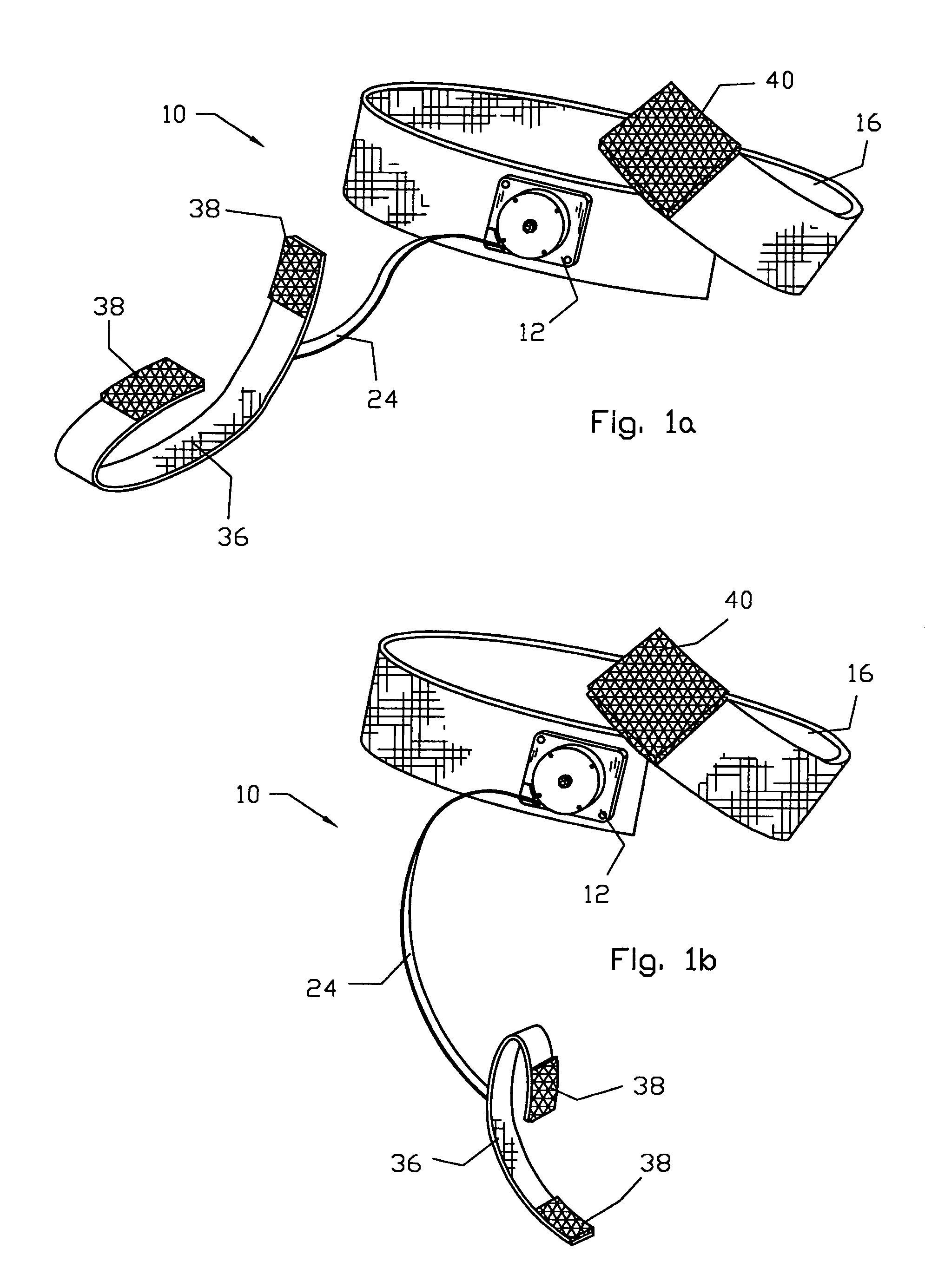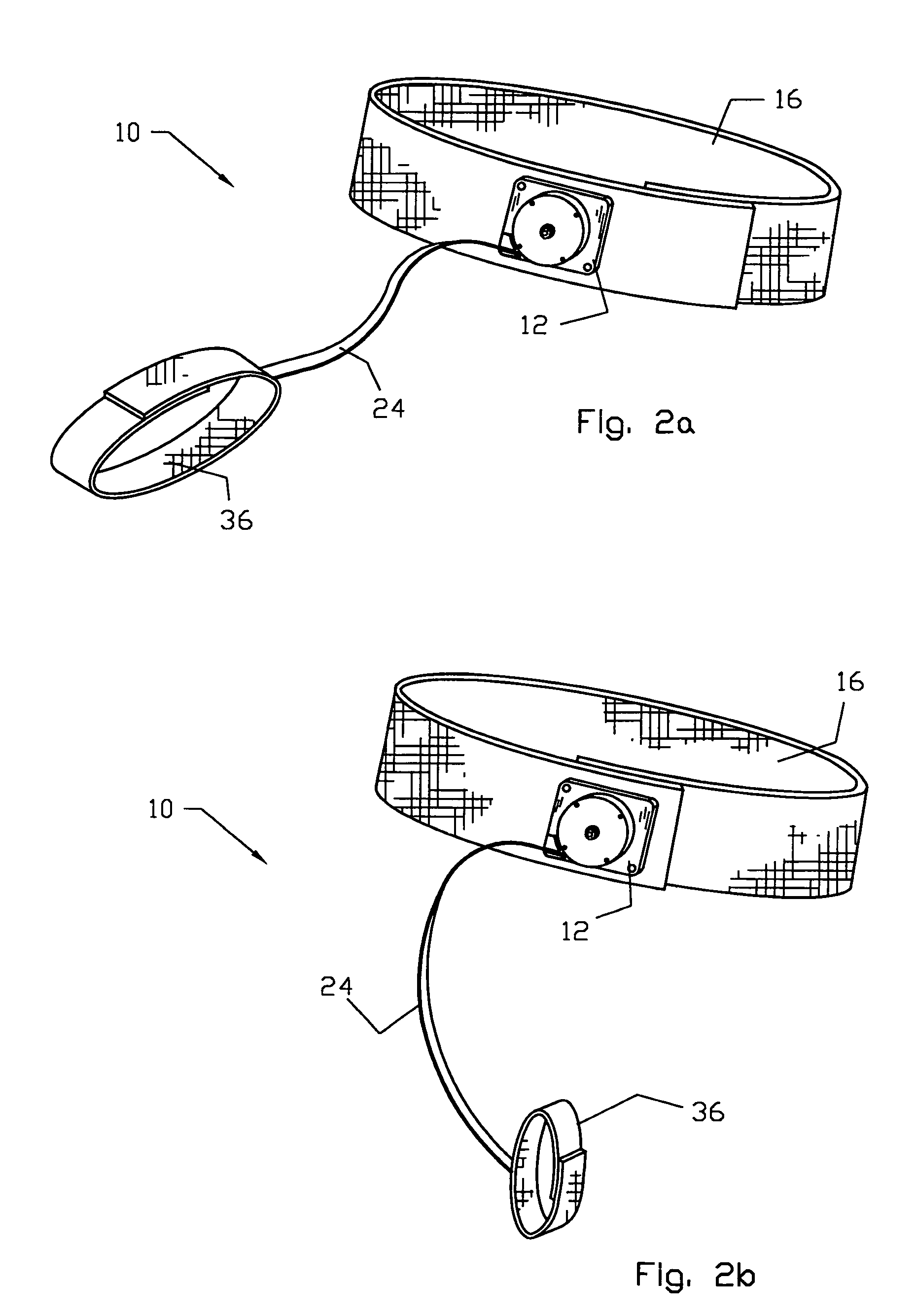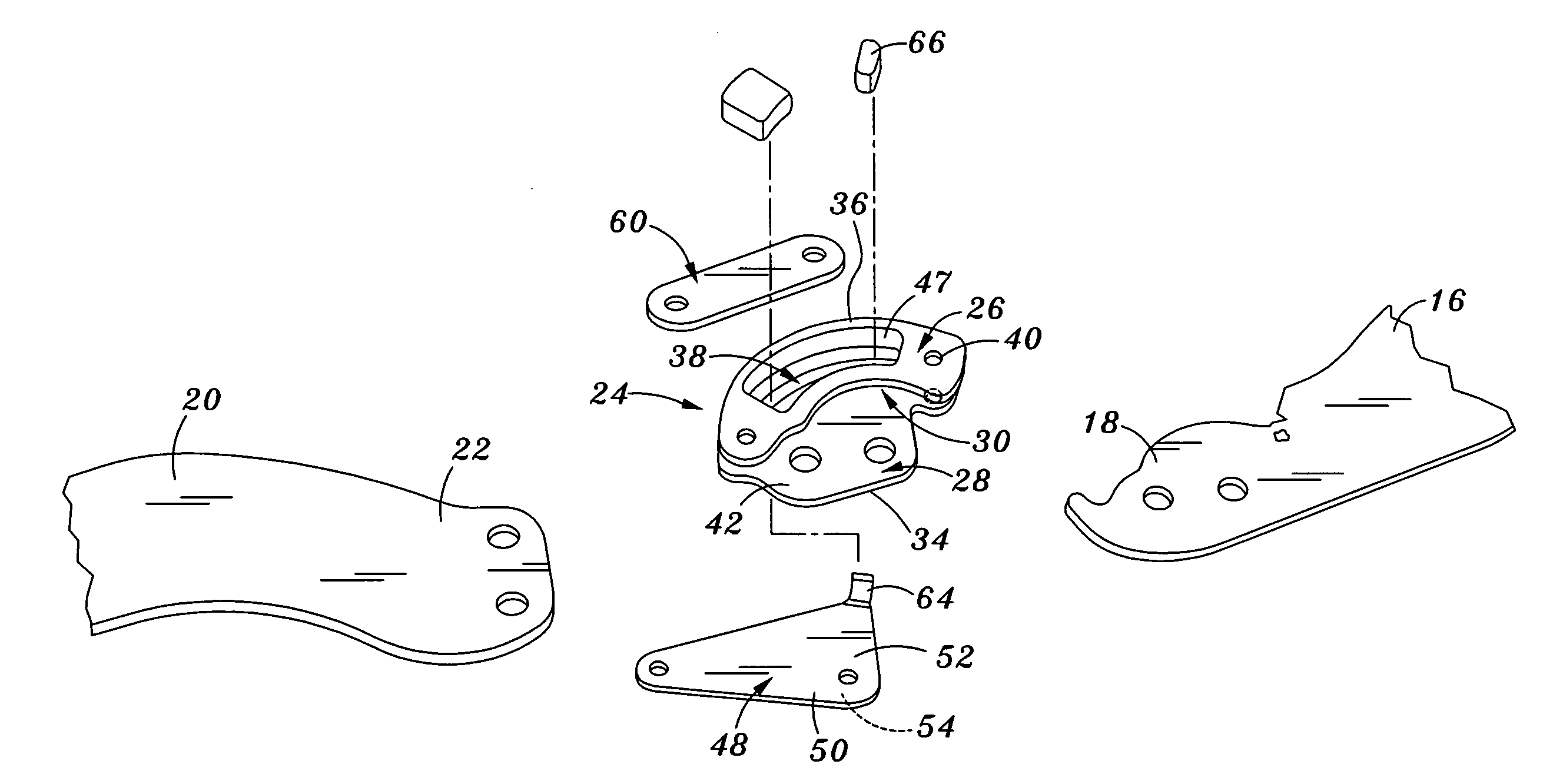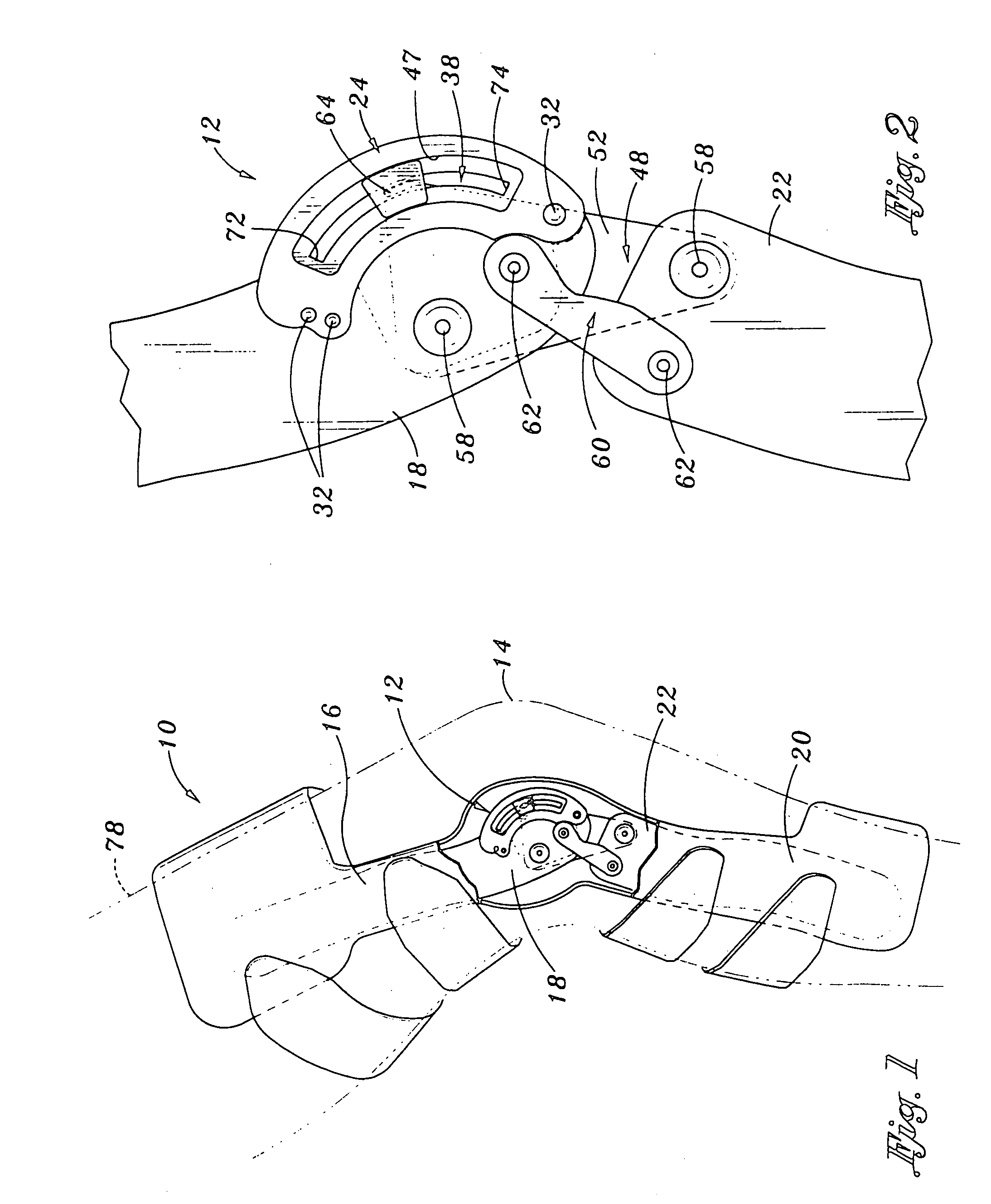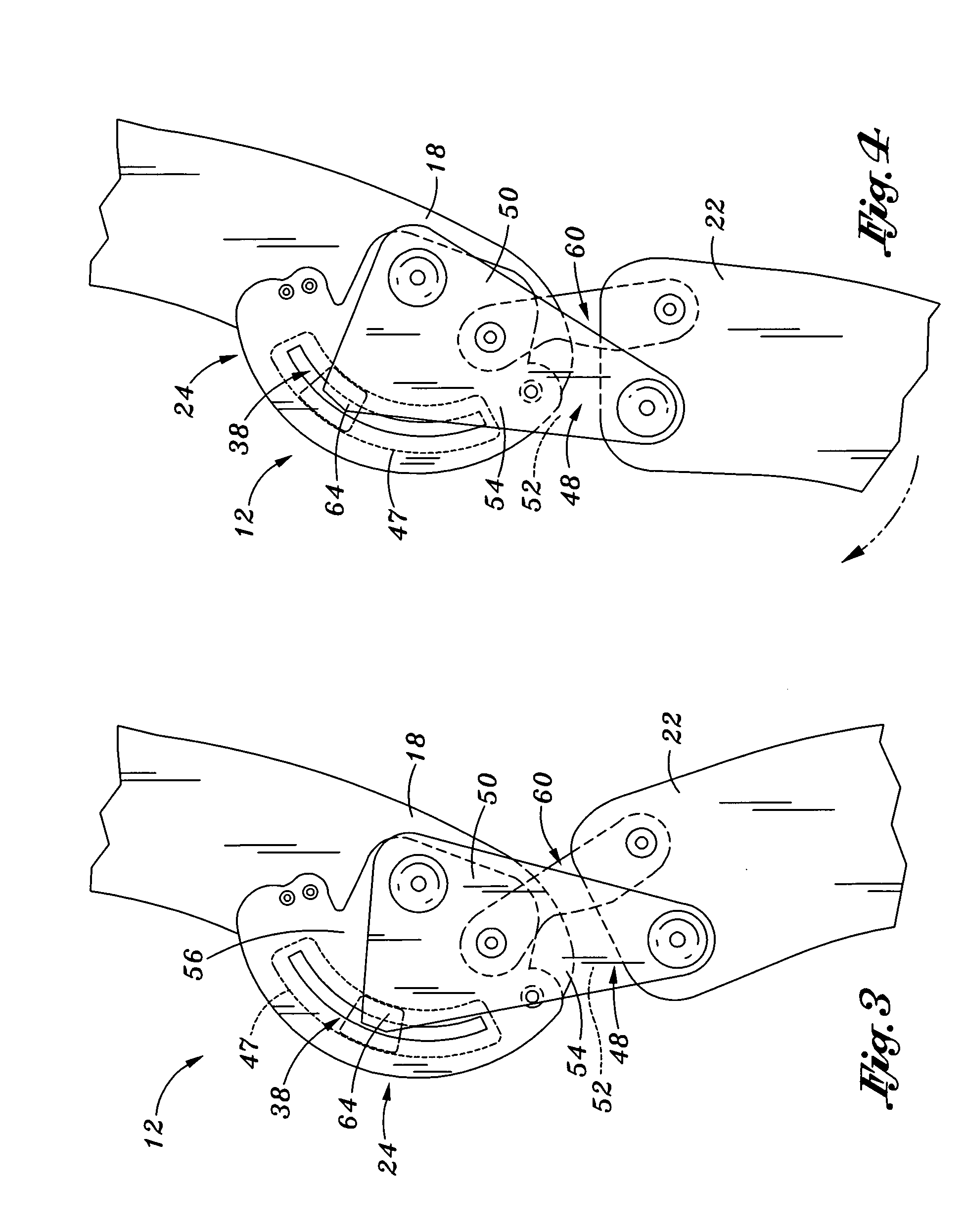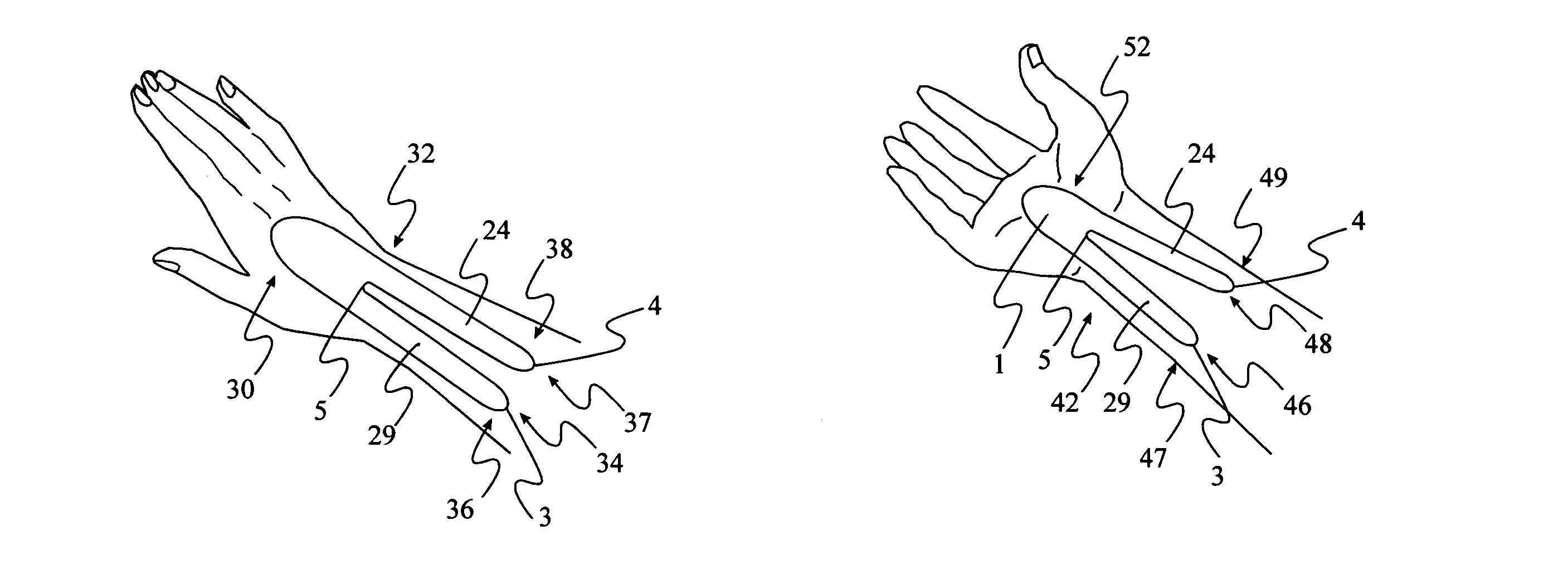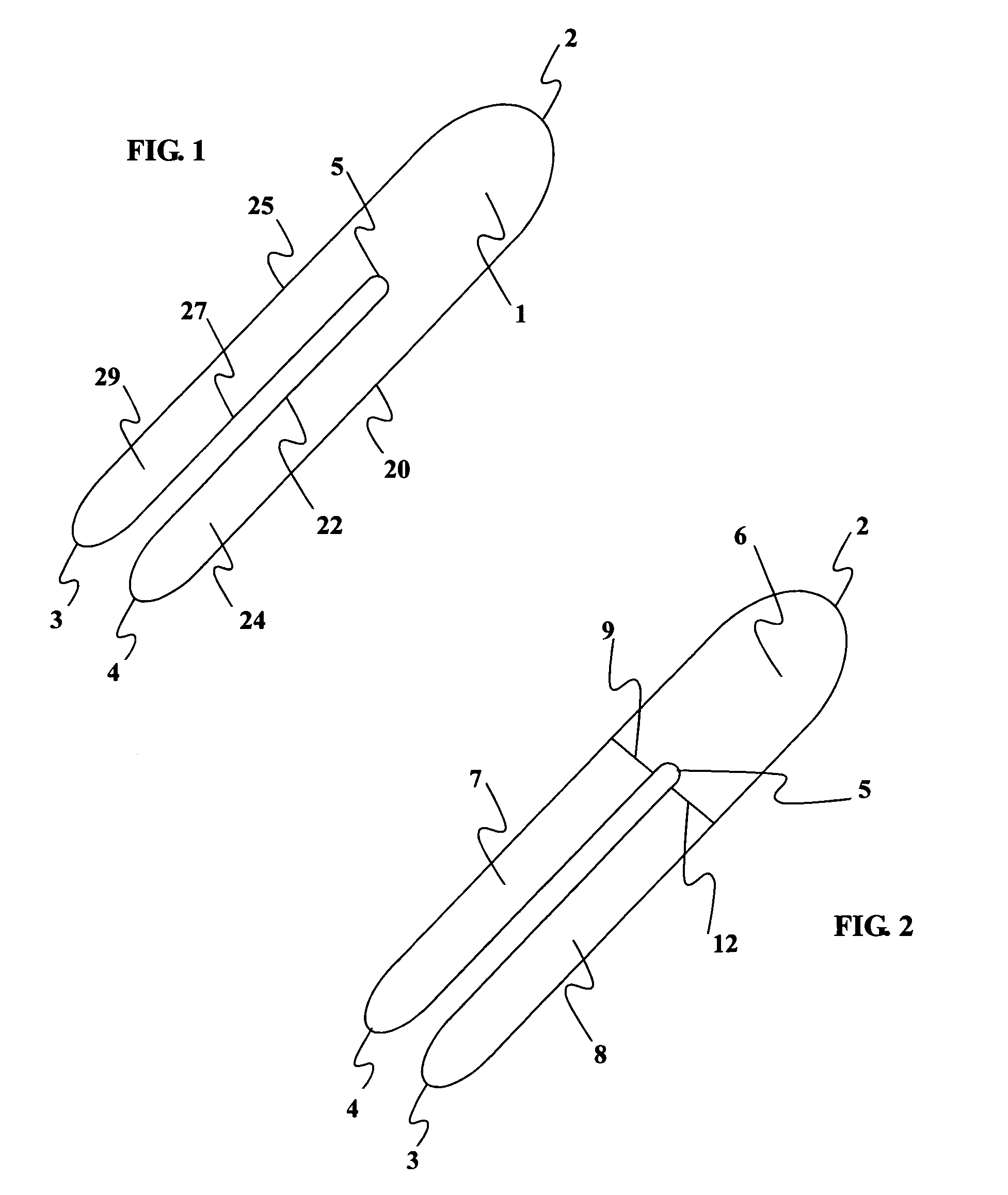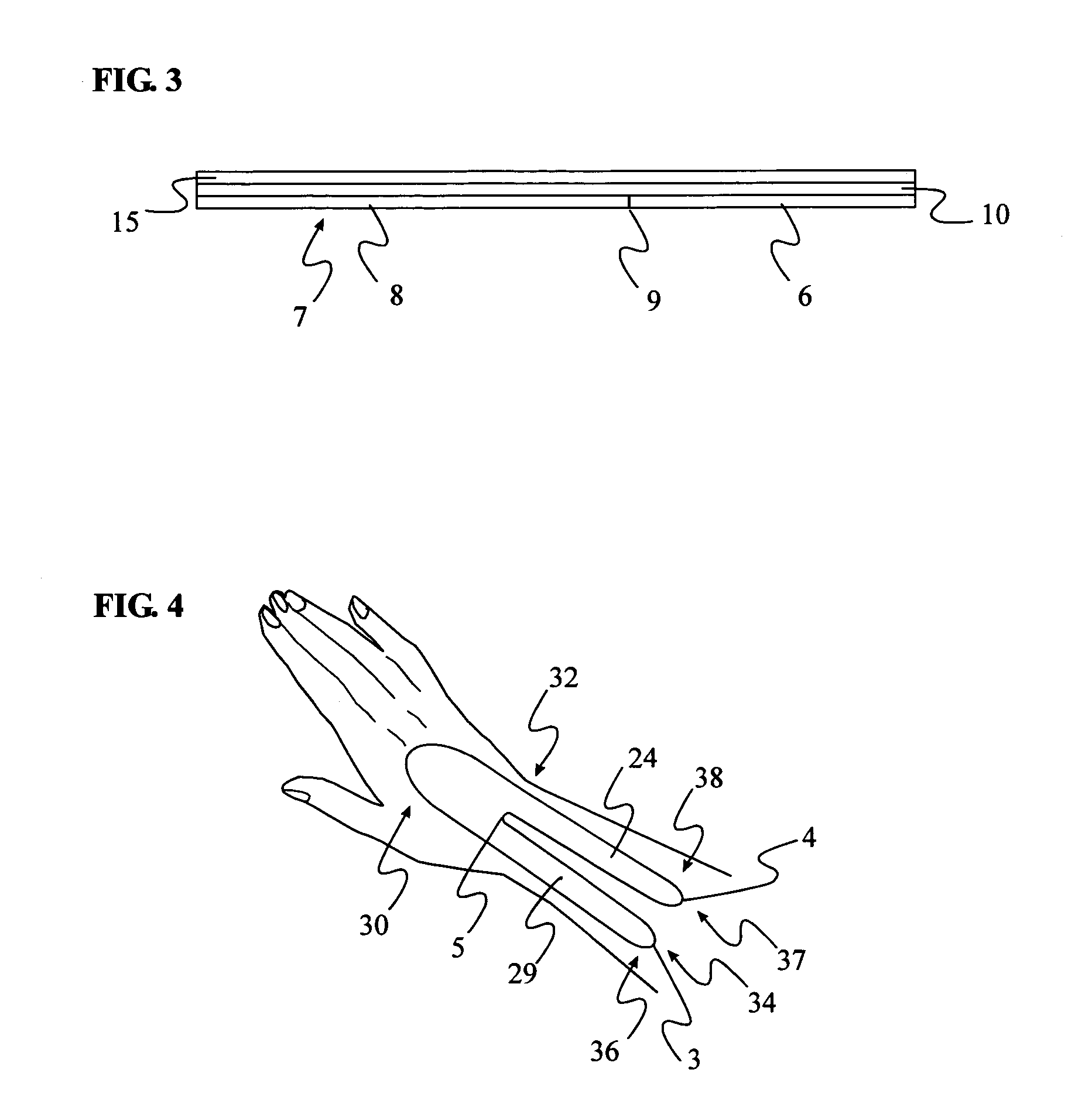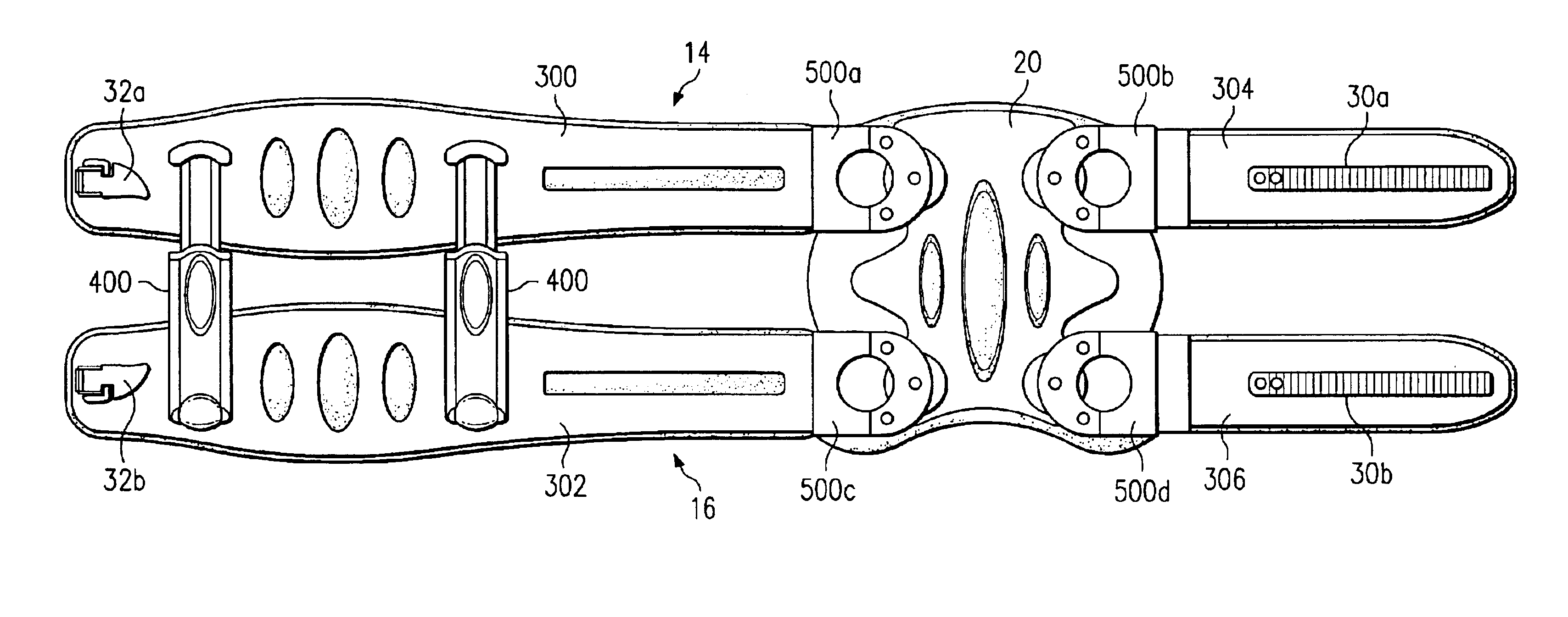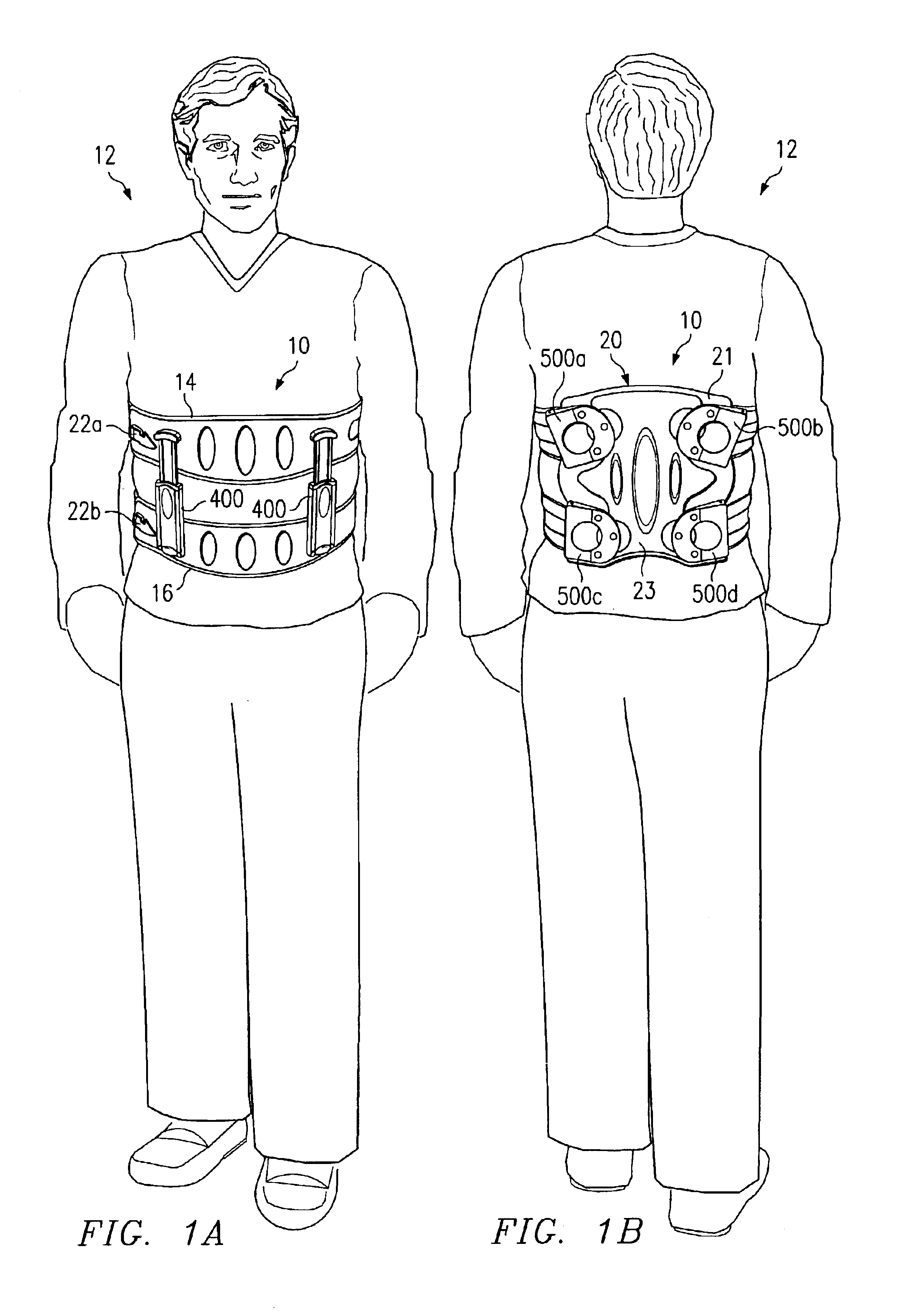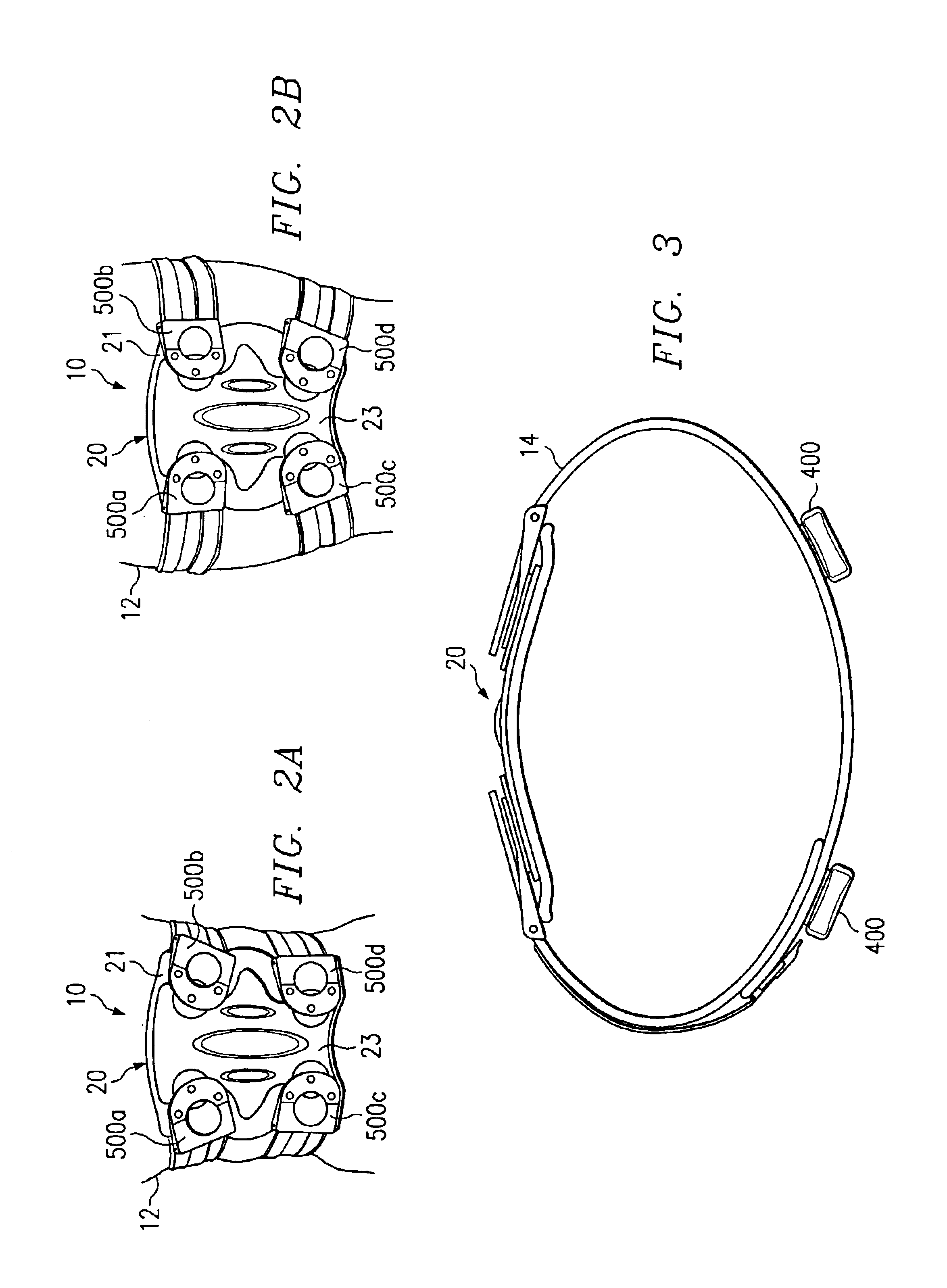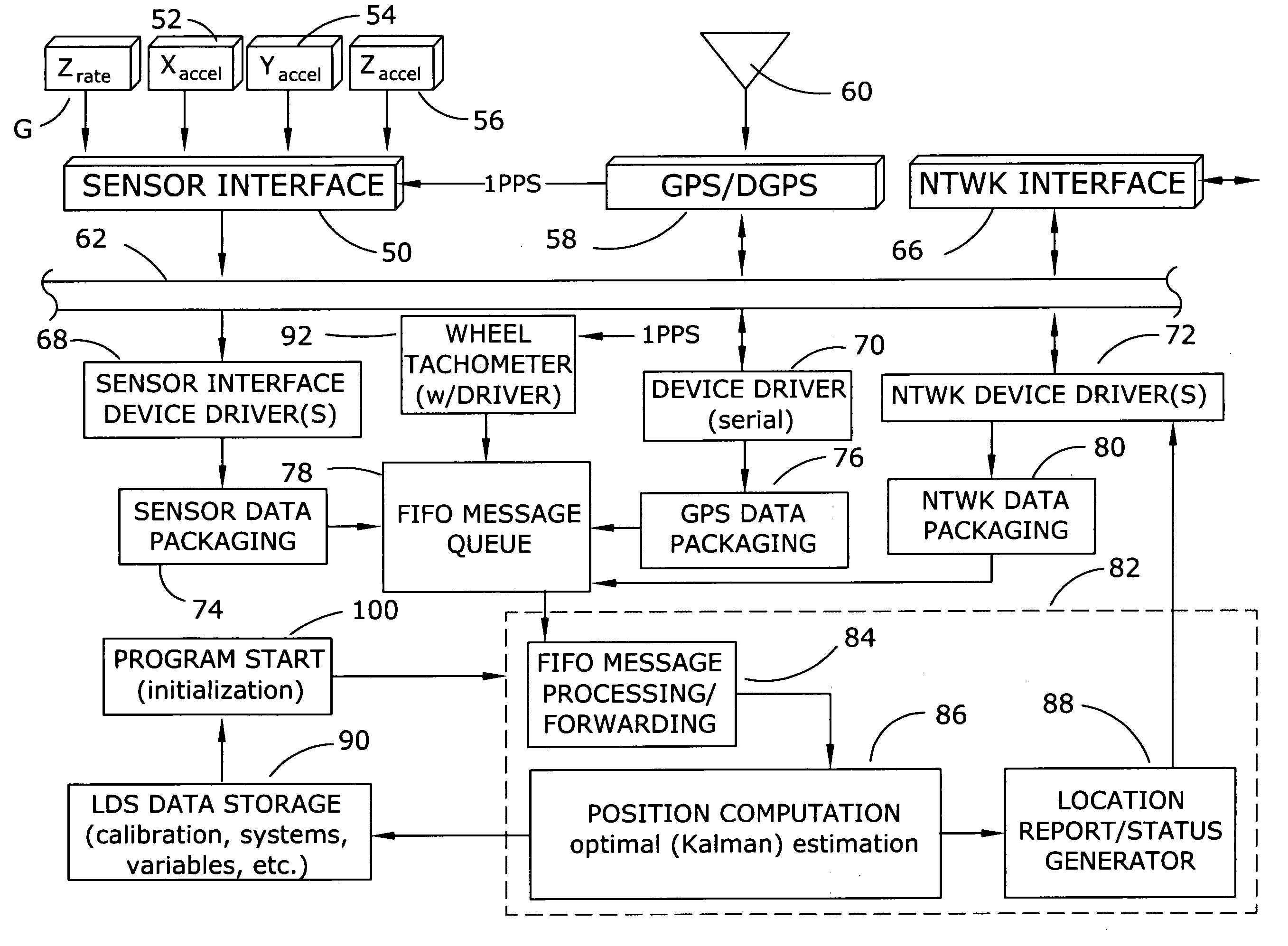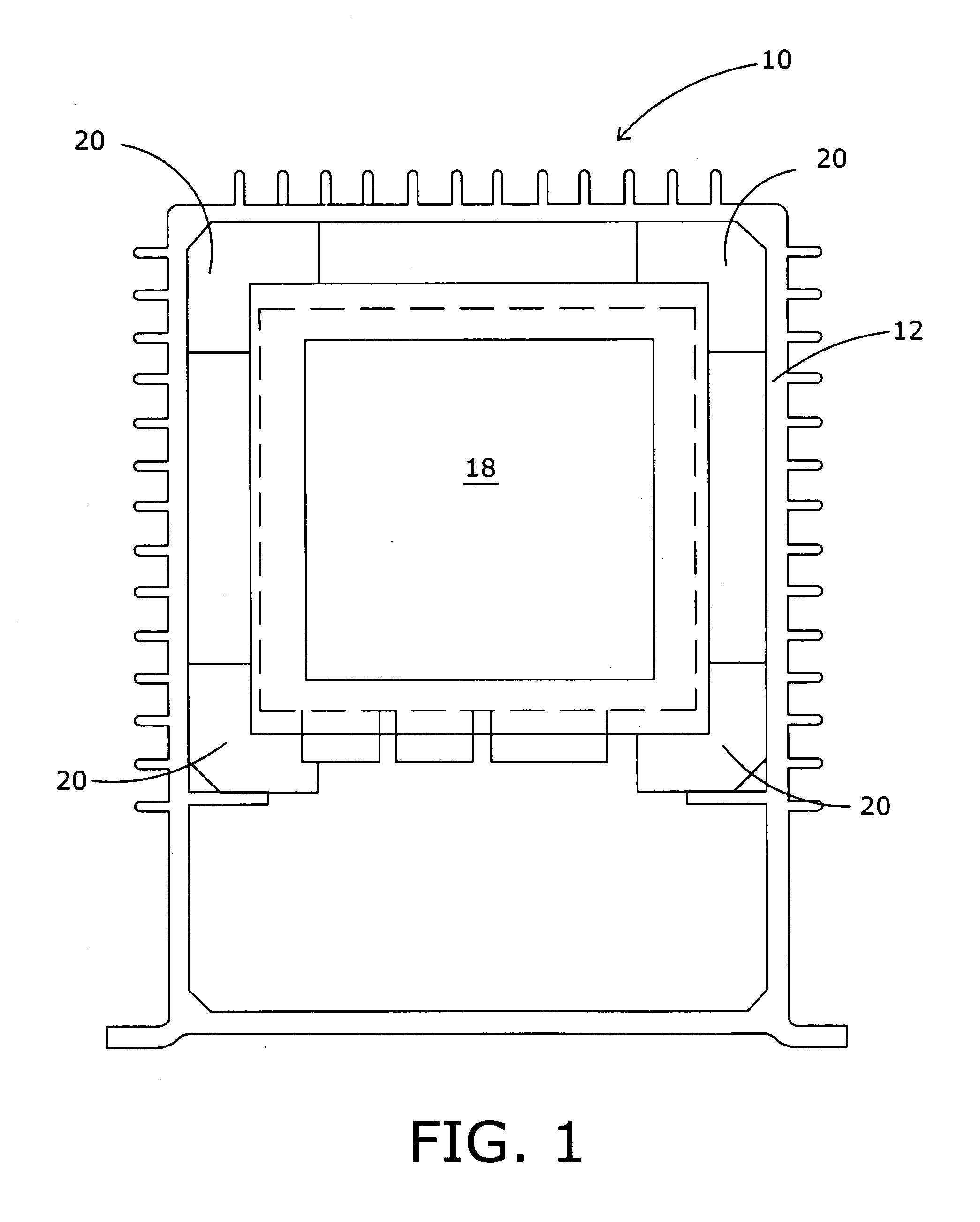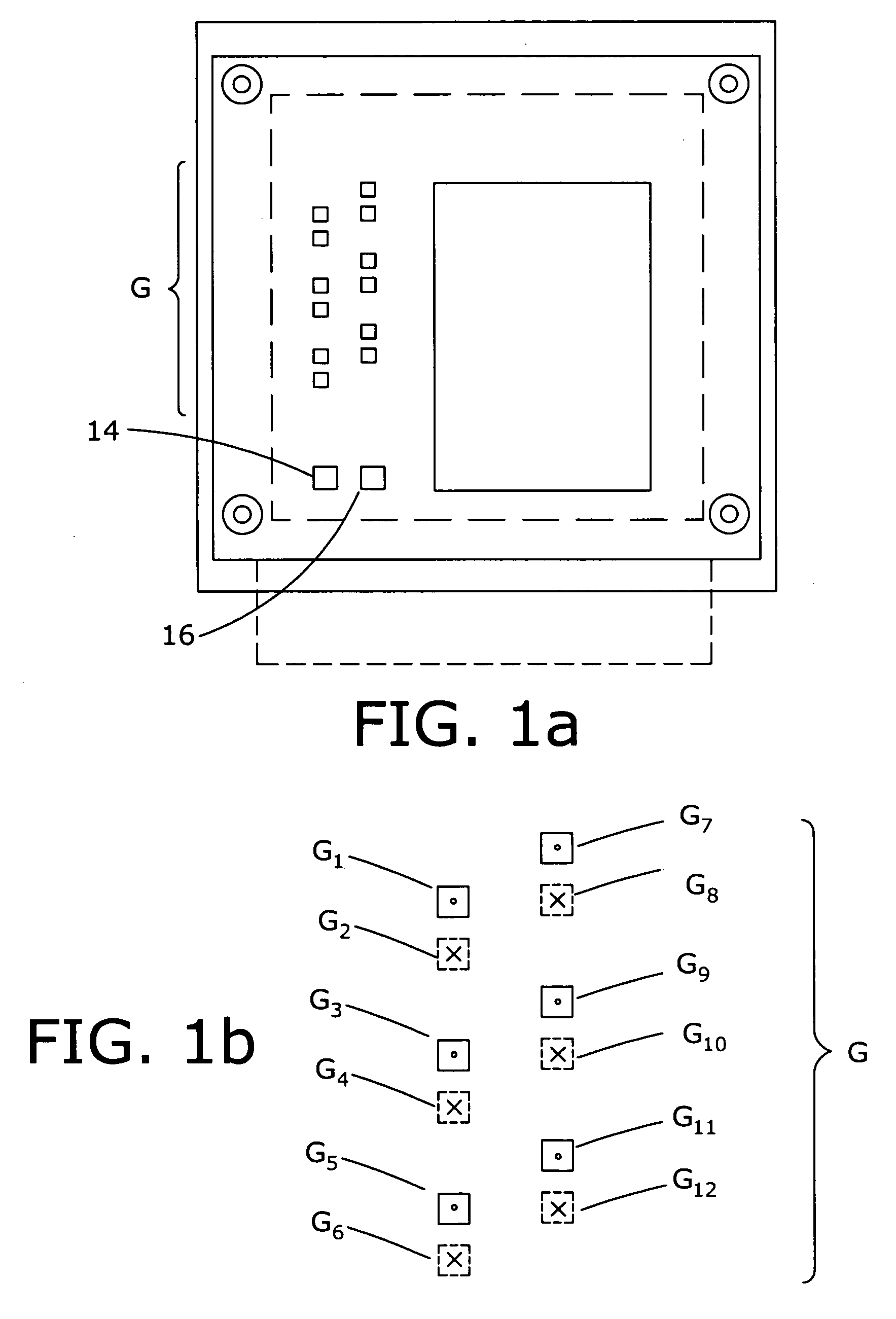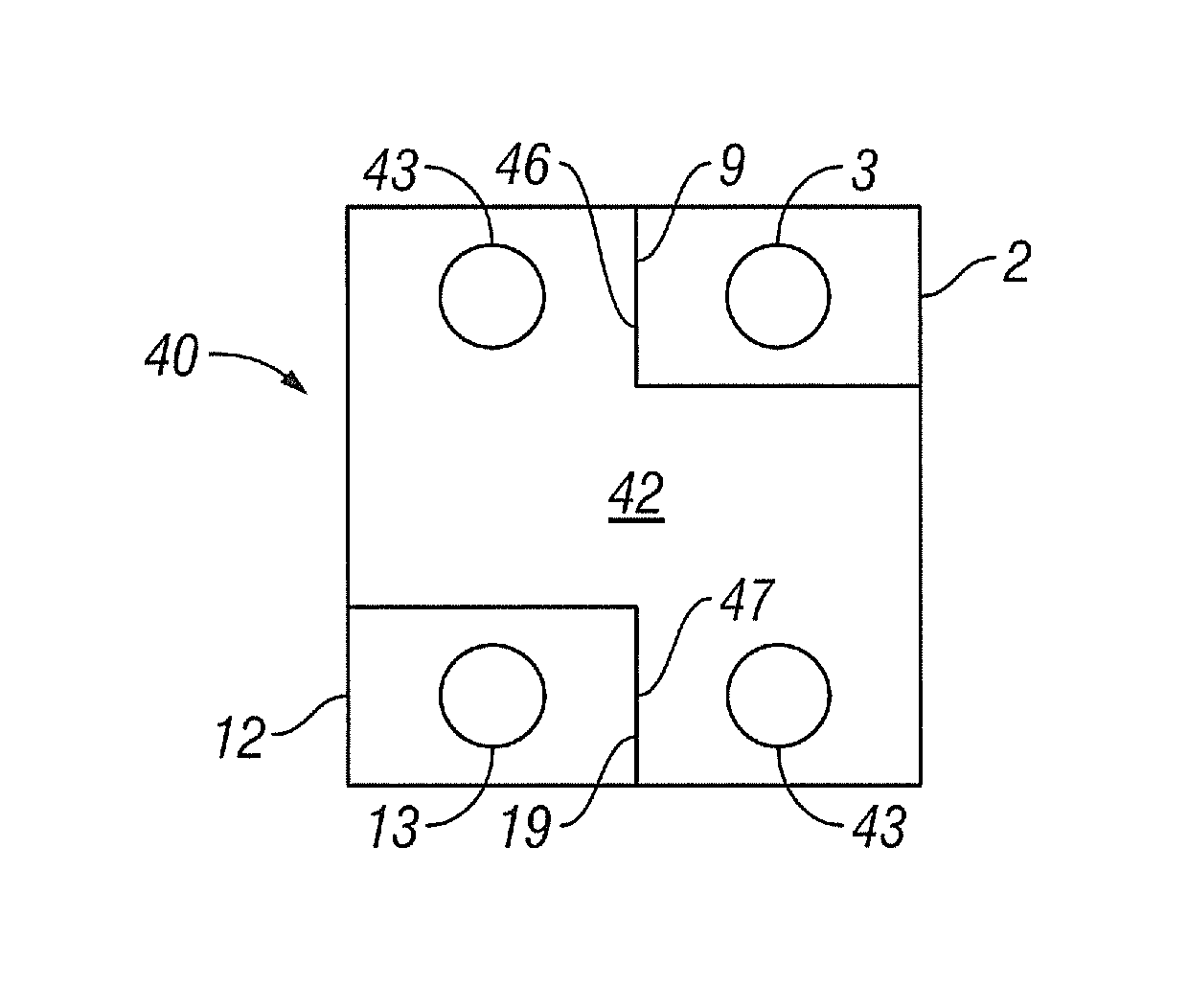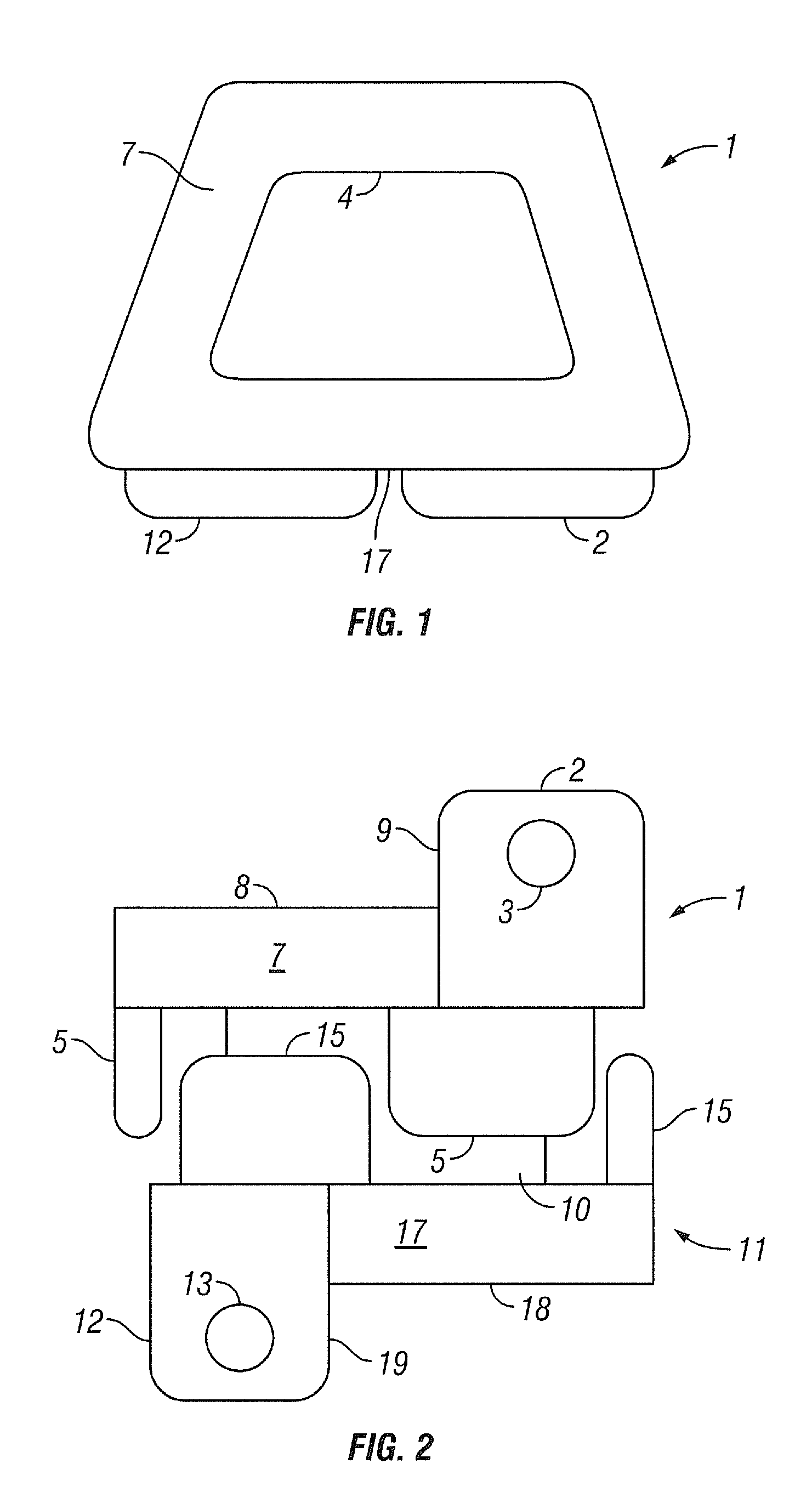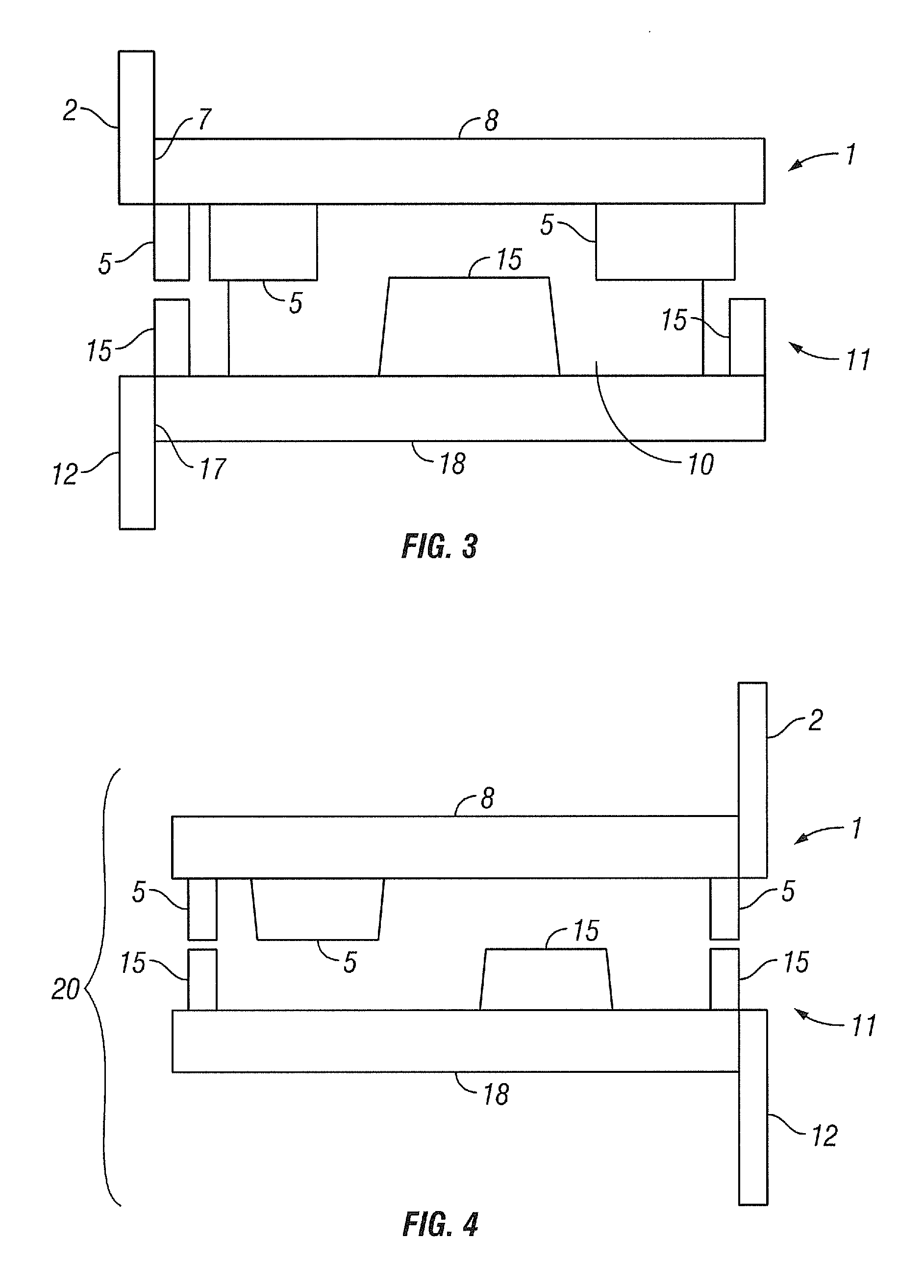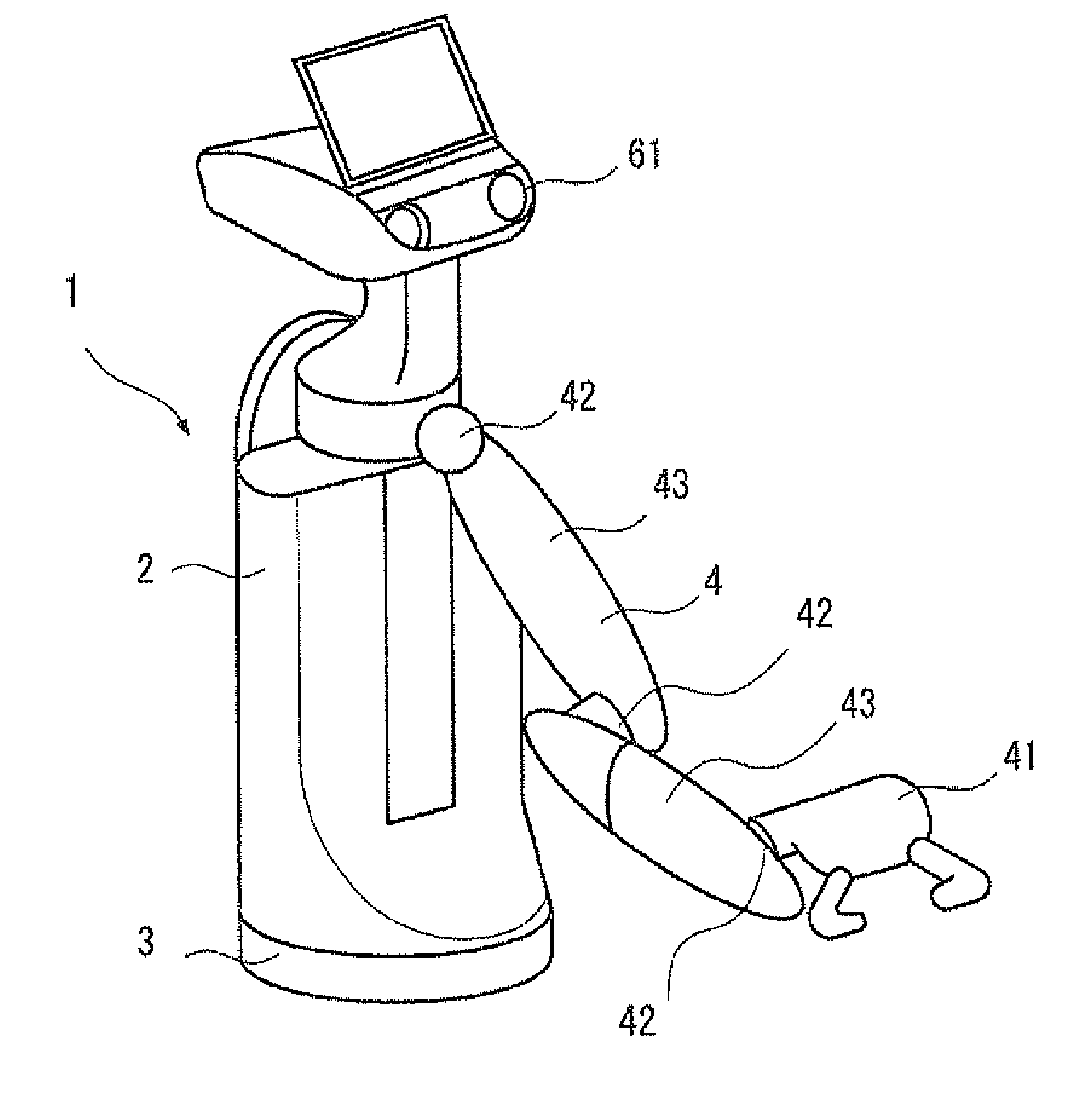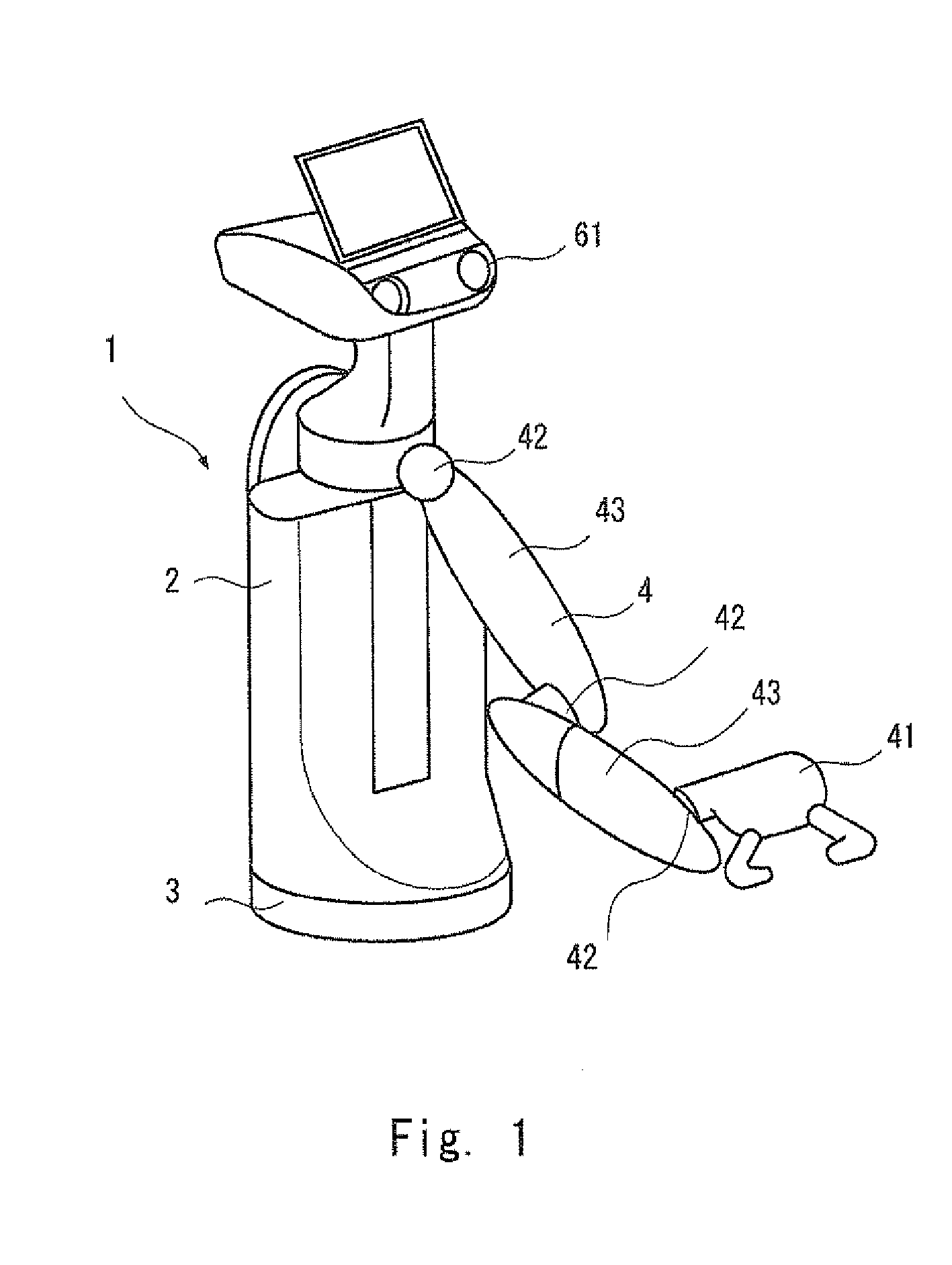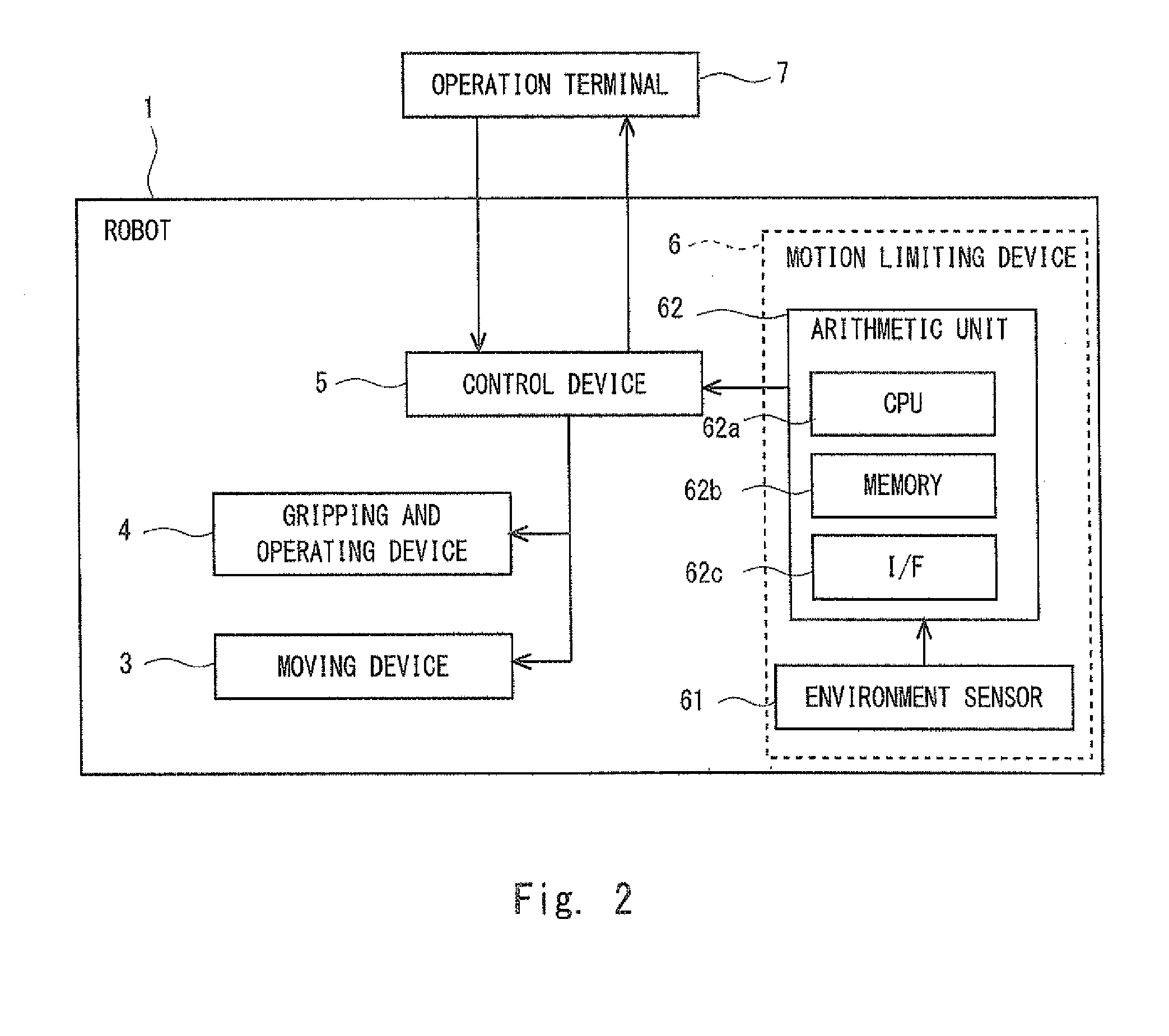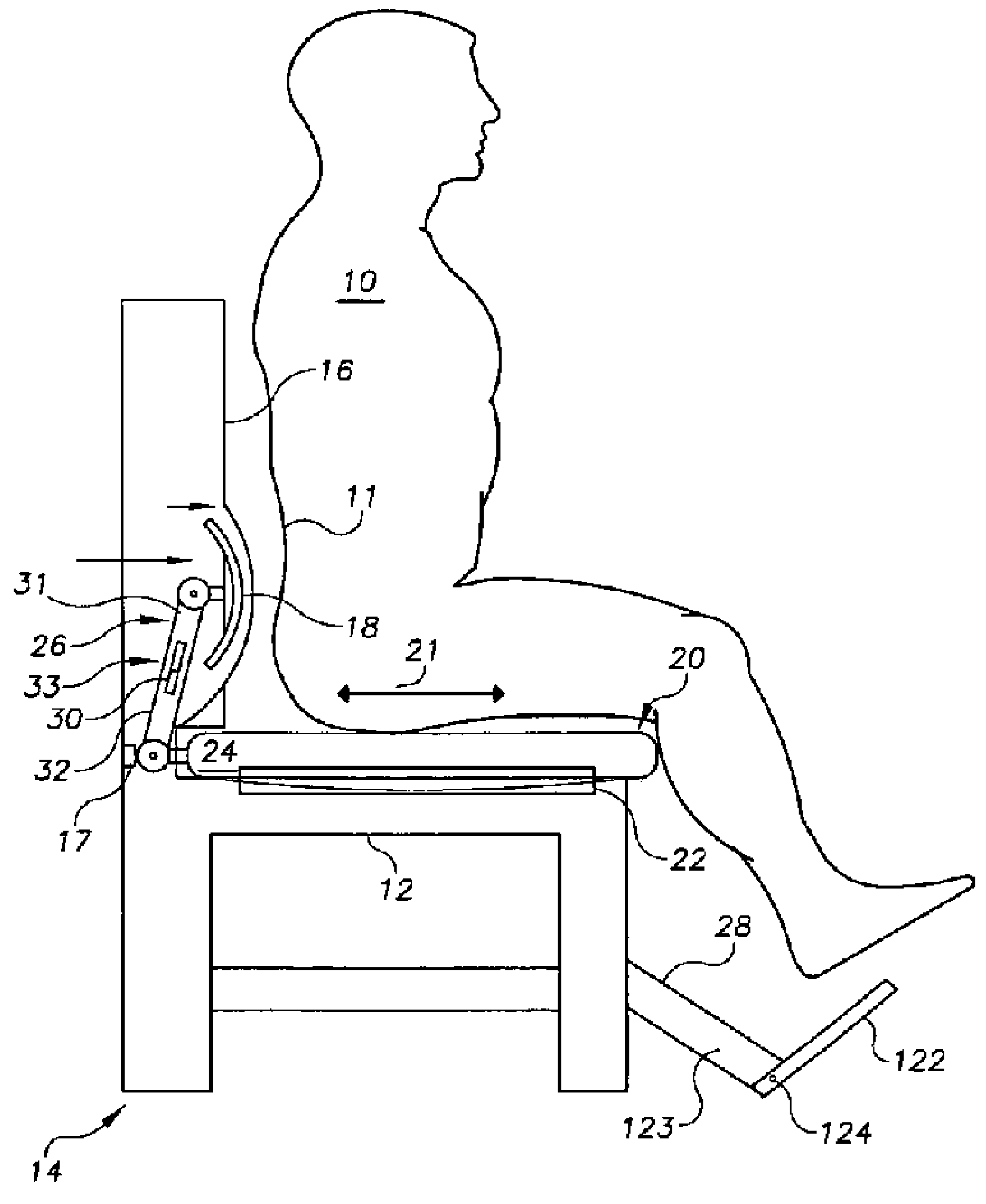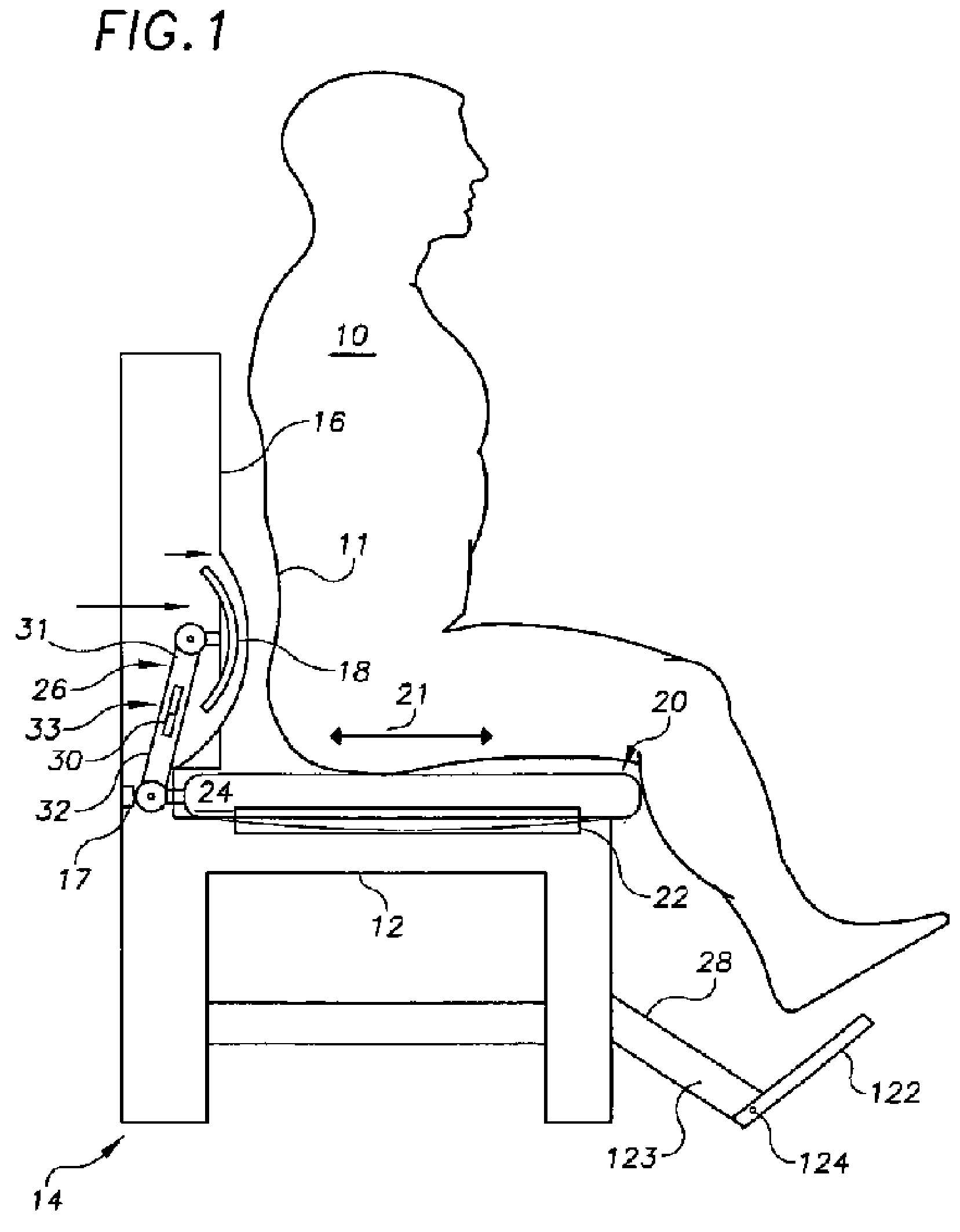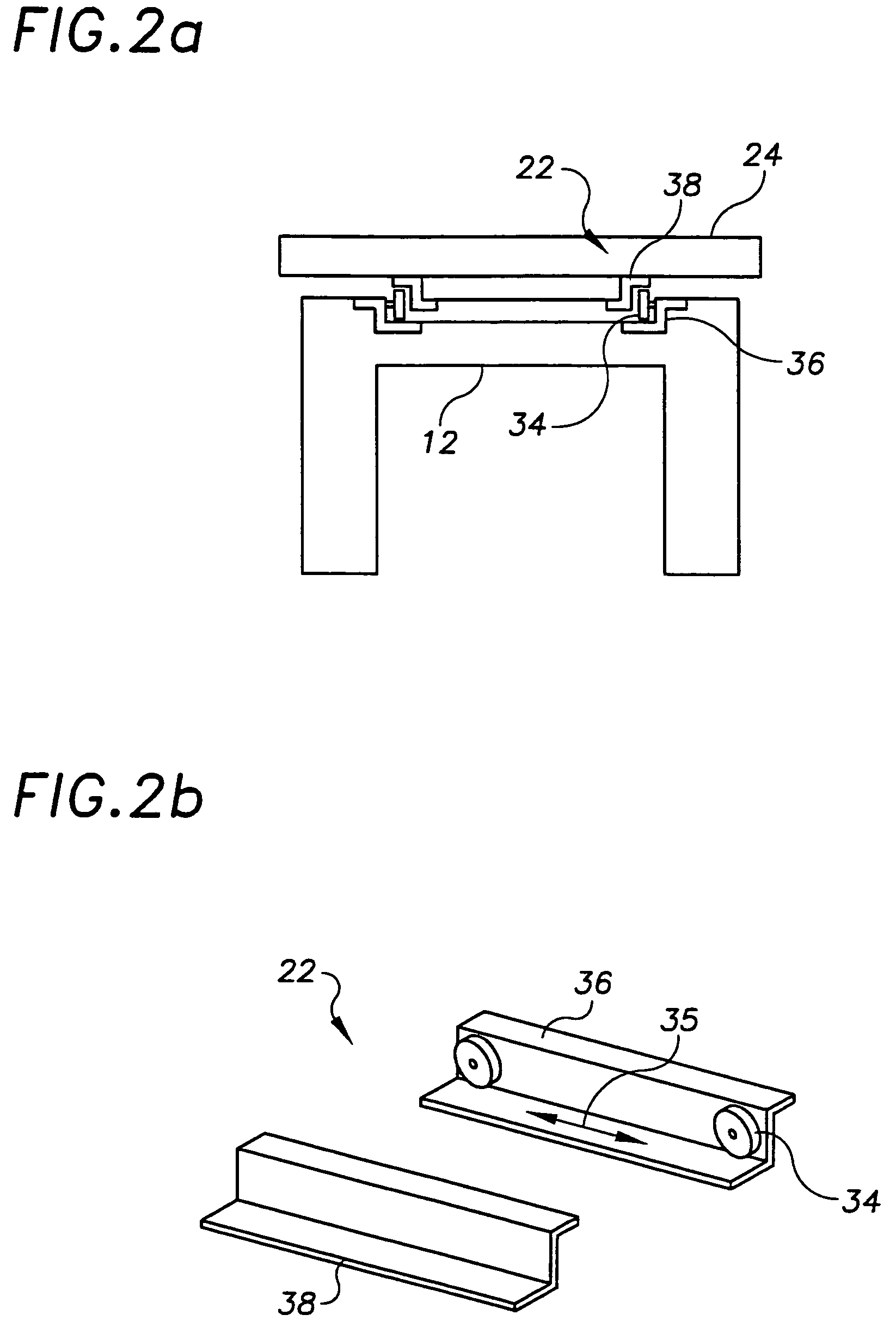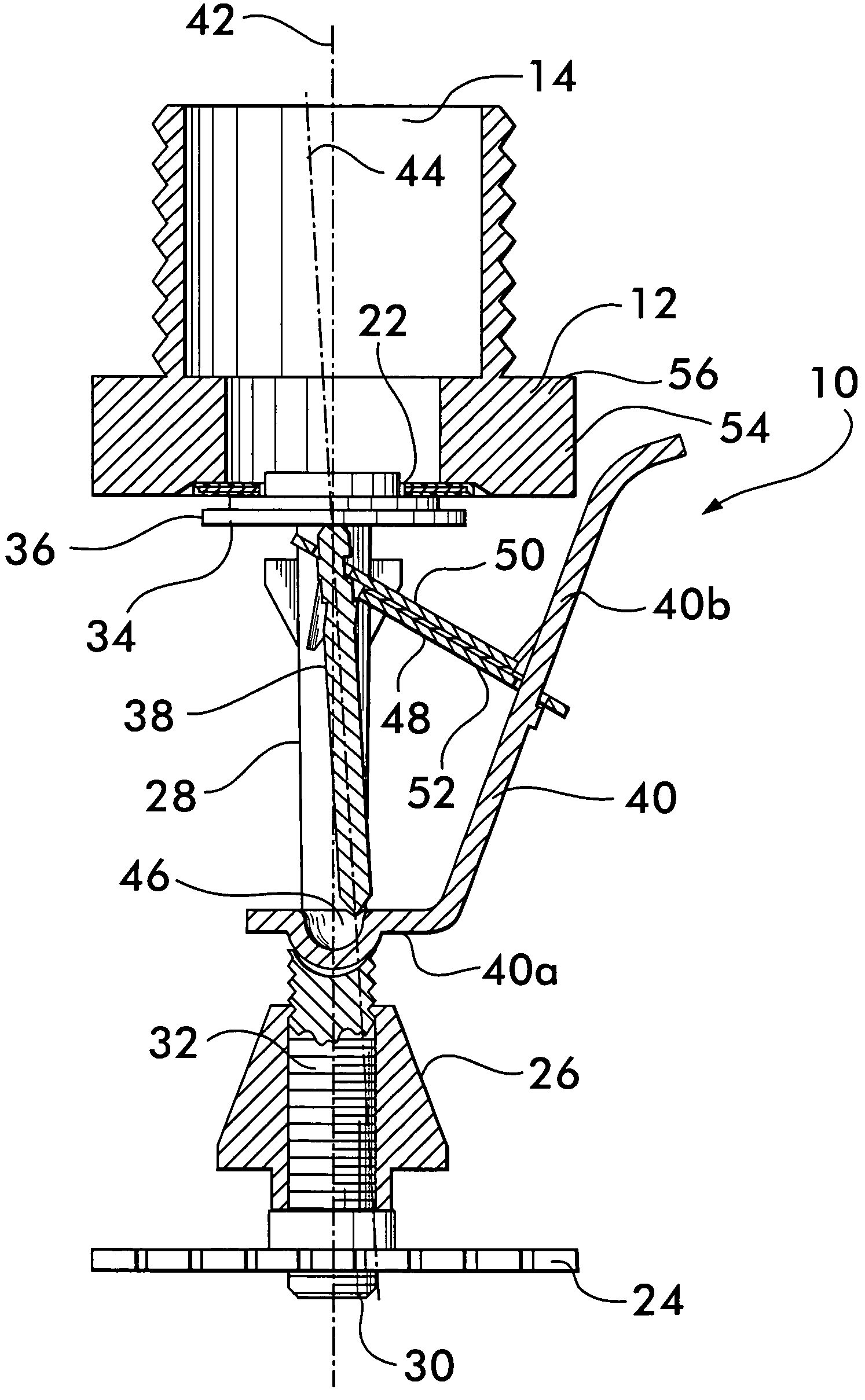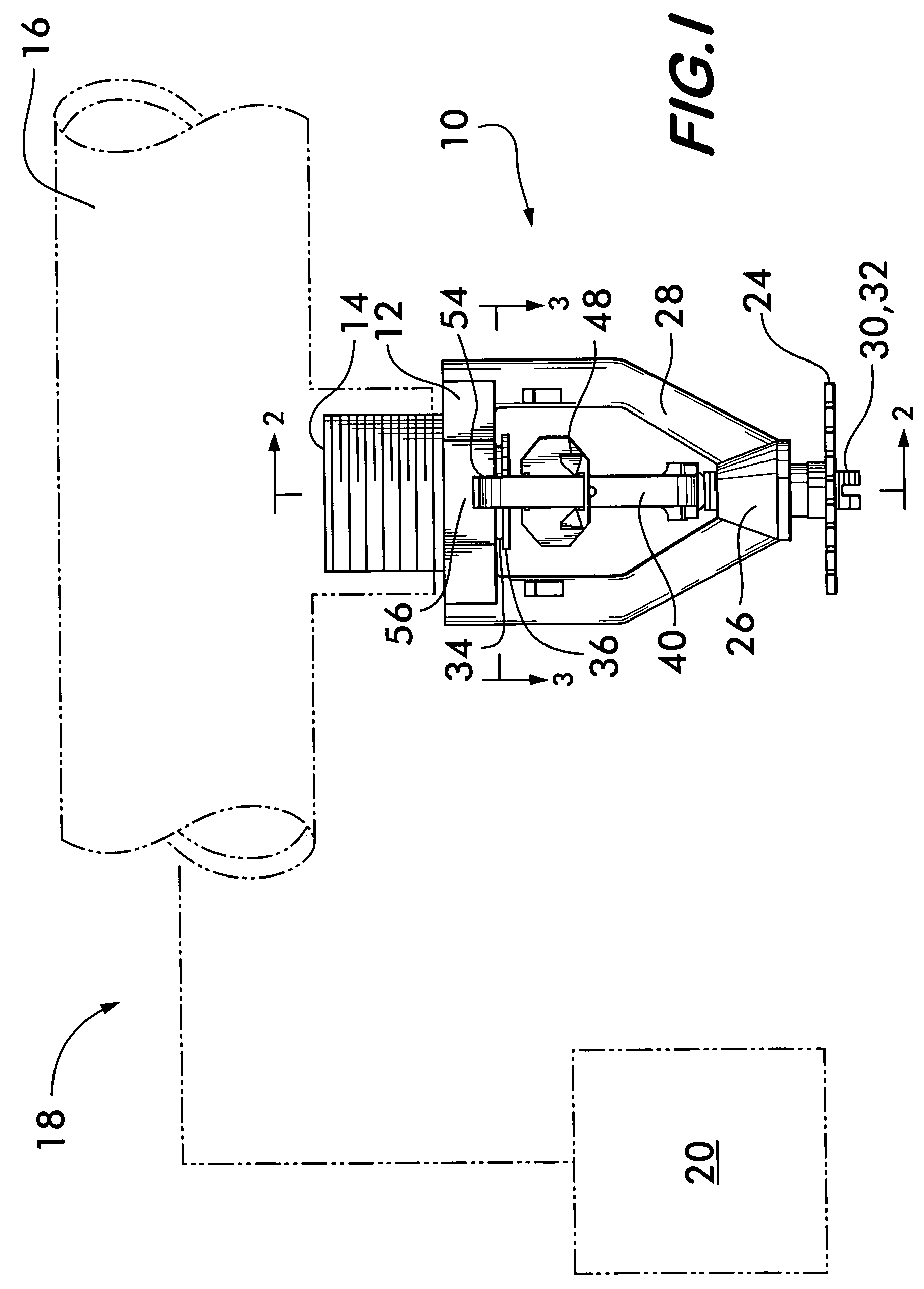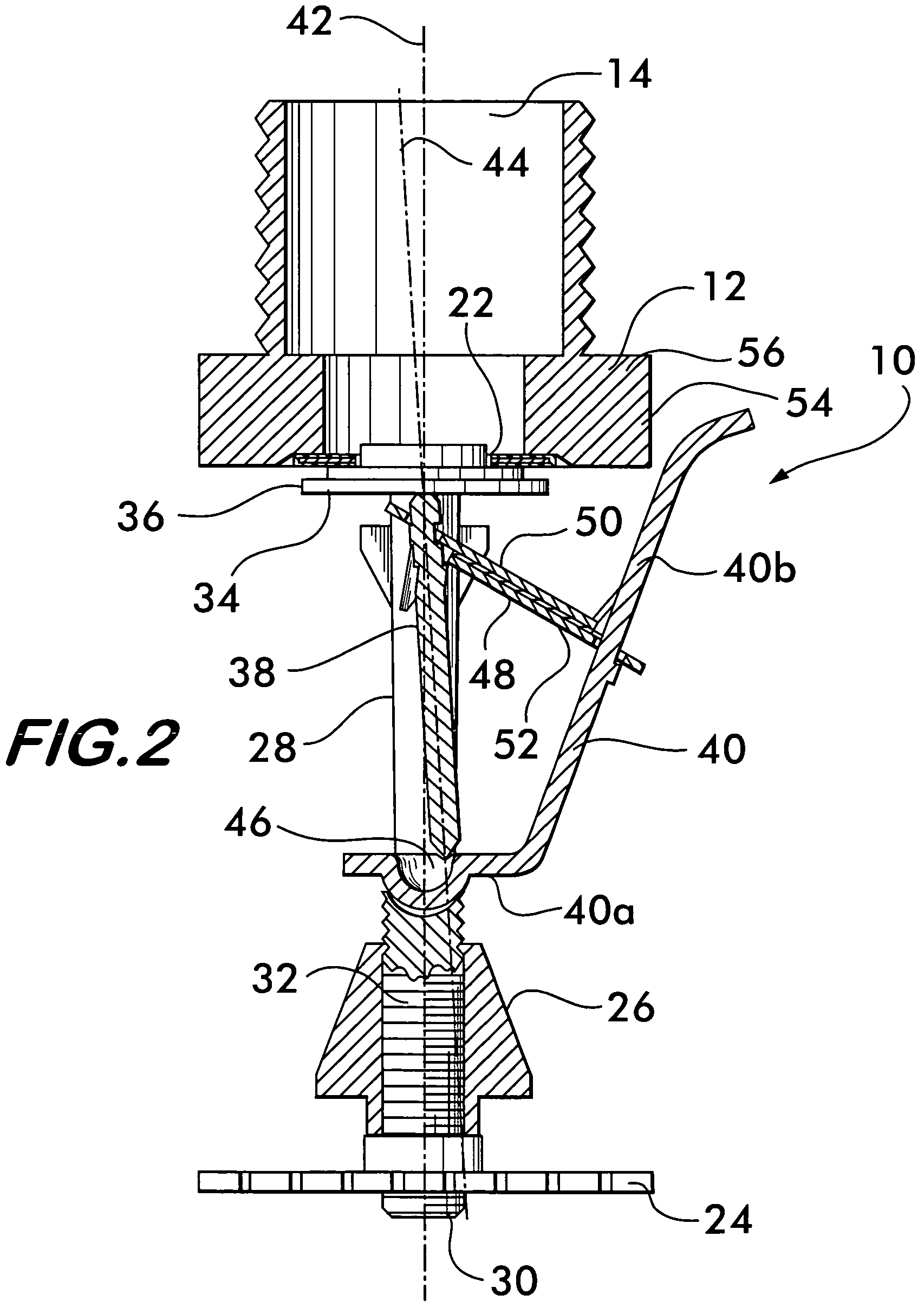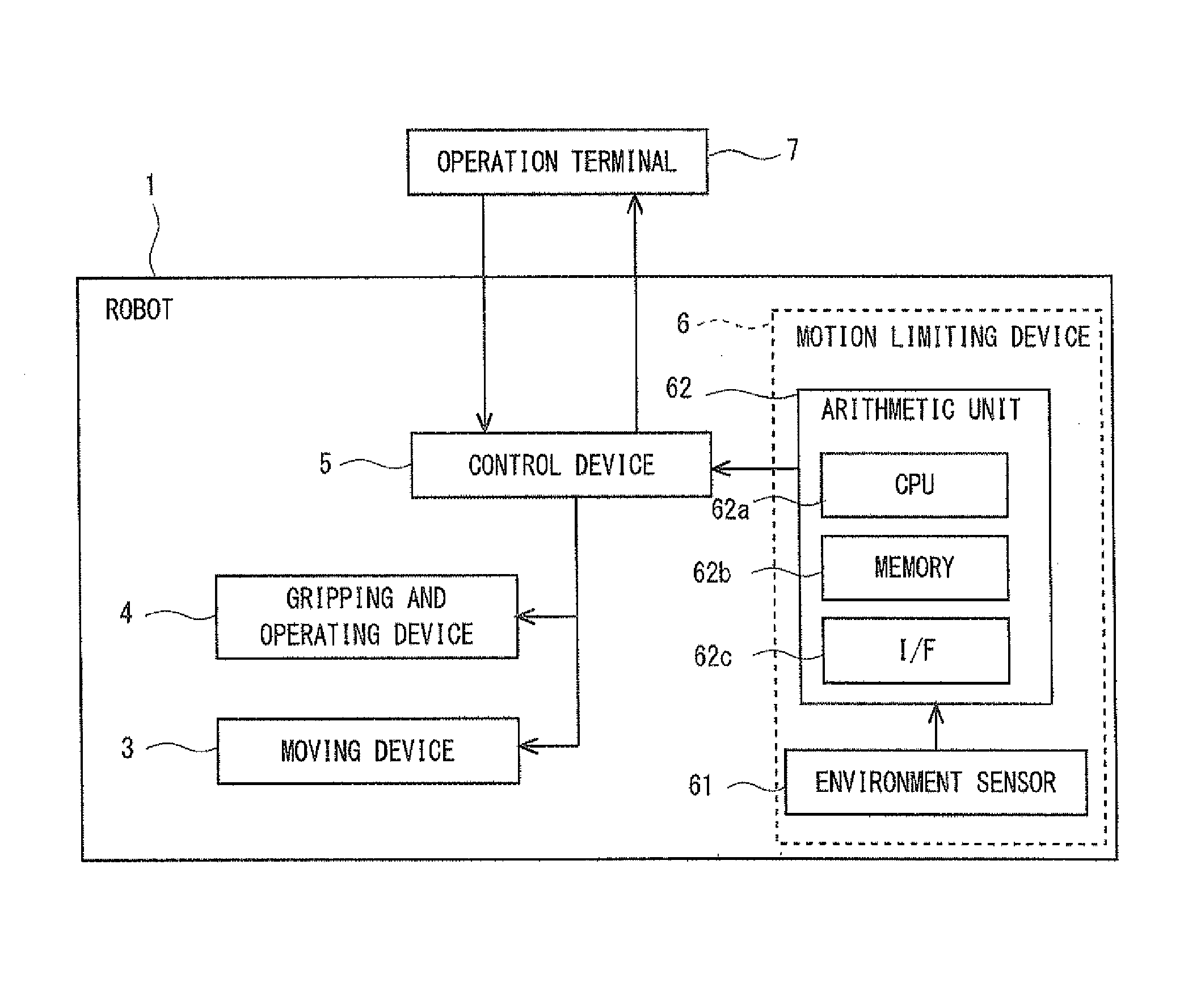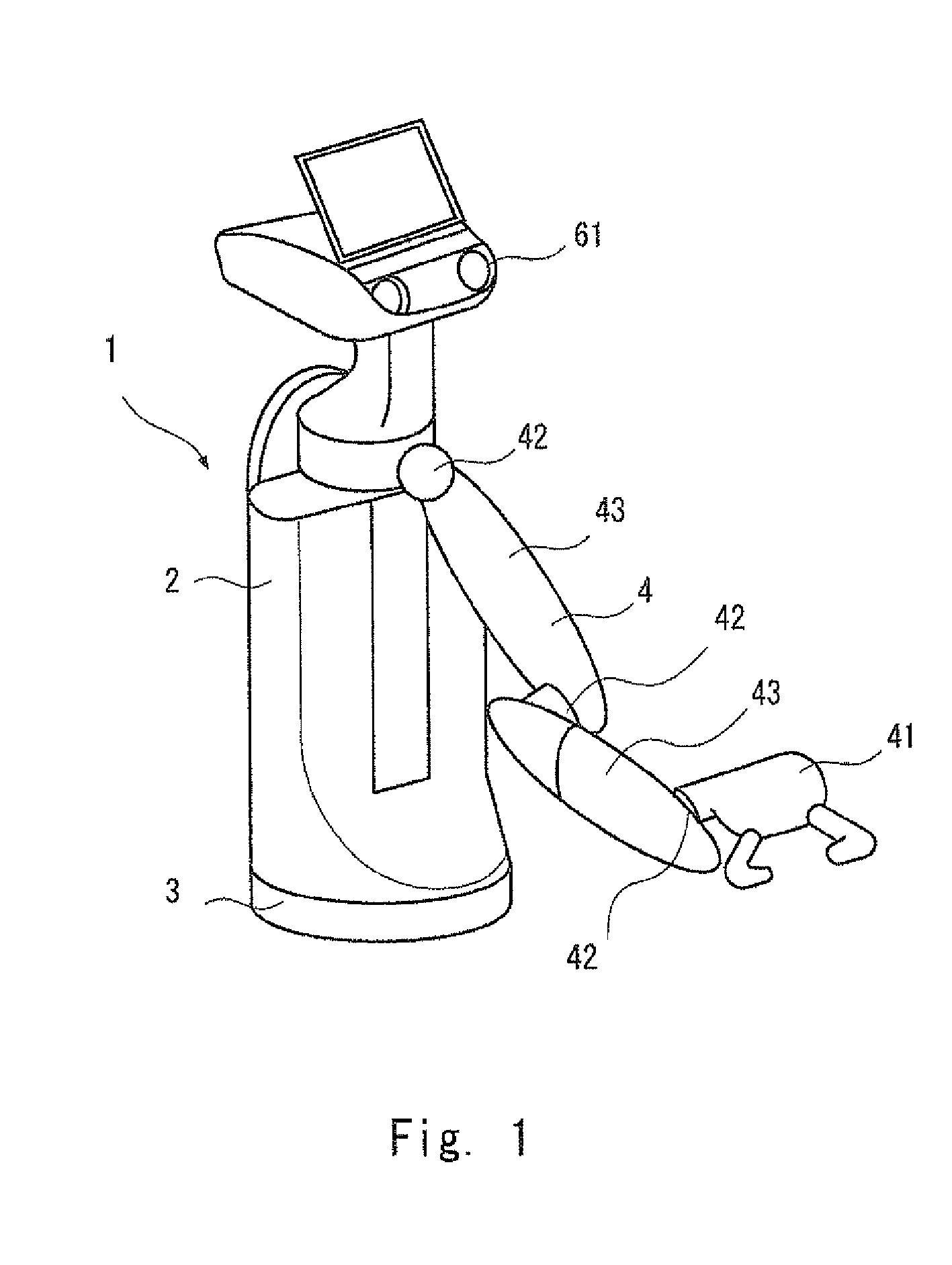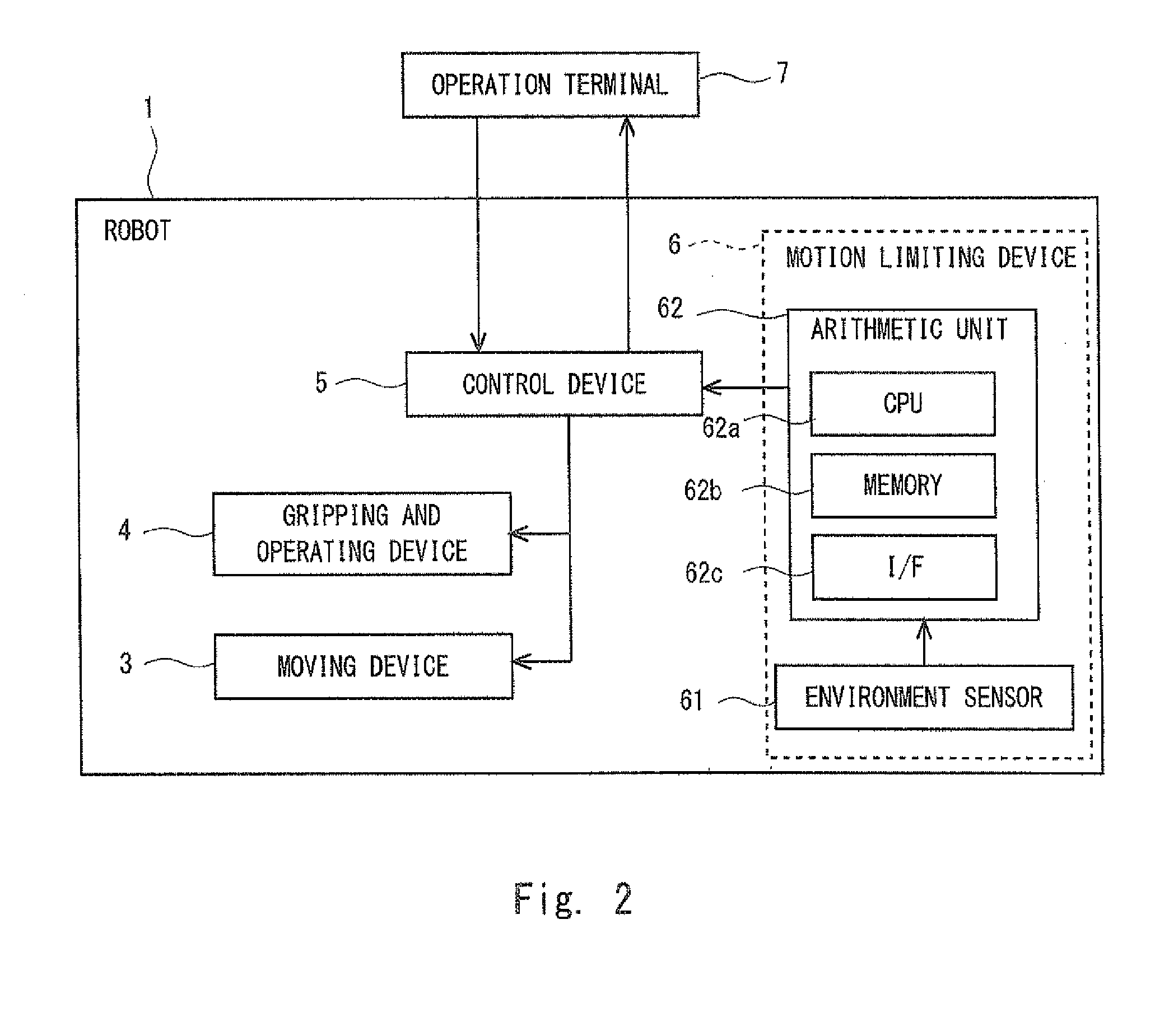Patents
Literature
94 results about "MOTION LIMITATION" patented technology
Efficacy Topic
Property
Owner
Technical Advancement
Application Domain
Technology Topic
Technology Field Word
Patent Country/Region
Patent Type
Patent Status
Application Year
Inventor
Limitation of motion. The restriction of movement or range of motion of a part or joint, esp. that imposed by disease or trauma to joints and soft tissues.
Articulating Spacer
Spinal implants are disclosed. One spinal implant includes a support body, an articulating element, a blocking member and a motion limiting member. The support body includes a superior end surface and a lower end surface having teeth. In between the superior end surface and the lower end surface is a recess formed in a sidewall of the support body for receiving the articulating element. The blocking member can be received in the recess to prevent inadvertent back-out of the articulating element from within the recess. The articulating element can articulate in one or more directions, thereby allowing articulation of the spinal implant into a desired position within a disc space.
Owner:GLOBUS MEDICAL INC
Crimping instrument with motion limiting feature
A surgical crimping instrument for crimping a sleeve including an anvil and a hammer moveable relative to each other to crimp the sleeve, a pusher movable longitudinally and engaging the hammer and / or anvil for urging the hammer and the anvil together as the pusher moves longitudinally from a first position to a second position, and cooperative stops adjacent to the hammer and the anvil for limiting the relative movement of the hammer towards the anvil.
Owner:LSI SOLUTIONS
Medical robotic system providing an auxilary view including range of motion limitations for articulatable instruments extending out of a distal end of an entry guide
A medical robotic system includes an entry guide with surgical tools and a camera extending out of its distal end. To supplement the view provided by an image captured by the camera, an auxiliary view including articulatable arms of the surgical tools and / or camera is generated from sensed or otherwise determined information about their positions and orientations are displayed along with indications of range of motion limitations on a display screen from the perspective of a specified viewing point.
Owner:INTUITIVE SURGICAL OPERATIONS INC
Actively-engageable movement-restriction mechanism for use with an annuloplasty structure
ActiveUS20100211166A1Restricting further contraction and expansionUnobstructed adjustment of a perimeter thereofAnnuloplasty ringsTubular organ implantsLocking mechanismEngineering
Apparatus is provided, including a locking mechanism, an implant, and a flexible strip within the implant having a plurality of recesses. A perimeter of the strip shortens and expands when the first end of the strip is advanced bidirectionally with respect to a second end of the strip. The locking mechanism includes a moveable recess-engaging portion, a mechanical support removably coupled to the recess-engaging portion, and a force applicator which maintains the recess-engaging portion in a position in which the recess-engaging portion is not disposed in any of the recesses. Upon decoupling of the mechanical support from the recess-engaging portion, the force applicator restricts motion of the plurality of recesses of the strip with respect to the second end of the strip, by facilitating positioning of the recess-engaging portion in one of the plurality of recesses. Other embodiments are also described.
Owner:VALTECH CARDIO LTD
Inter-cervical facet implant distraction tool
A distraction tool is disclosed which distracts, and preferably sizes, adjoining facets of a spine for an implant. The tool preferably includes a distraction head that has a first and a second head component. The first head component and the second head component preferably include inter-digitated fingers when the distraction head is in a non-distracted position. The tool includes a handle which is actuatable to move the distraction head to a distracted position, whereby the first set and second set of fingers are separated from one another. The tool can include a distraction gauge as well as a locking mechanism. The tool can also include a movement limitation mechanism to control the amount of distraction which the tool undergoes when actuated. The tool can include an insertion feature to allow the implant to be inserted into the facet joint while the tool is distracting the facets apart.
Owner:KYPHON
Limited Motion Prosthetic Intervertebral Disc
A prosthetic intervertebral disc includes an upper plate and a lower plate and employs congruent stepped features to provide limited articulating motion between the plates. The stepped features can be used to provide articulating motion of a rocking type rather than a rubbing or translating type of motion provided in many artificial discs. Each of two parts of the intervertebral disc includes two or more stepped bearing surfaces, having curved or flat shapes, which mate with one another to provide the articulation to the disc. The stepped features can be designed to restrict motion in flexion-extension or lateral bending to less than a predetermined angle. The stepped design can be modified to either allow or prevent rotational motion between the plates. The limited motion disc substantially prevents translation, however some limited translation can be provided by modification of the relative sizes of the stepped features.
Owner:SIMPLIFY MEDICAL PTY LTD
Ventilated Skin Mountable Device
InactiveUS20090048563A1Easy to operateEasy to usePressure infusionInfusion needlesSkin surfaceEngineering
A medical device is provided comprising a transcutaneous device unit and a process unit. The transcutaneous device unit is adapted to be mounted to a skin surface of a subject and comprises a first housing, a transcutaneous device, and may comprise a flexible patch portion with an upper surface and a lower mounting surface adapted for application to the skin of a subject. The process unit comprises a second housing with a lower surface and a process assembly. The first and second housings are adapted to be secured to each other in such a way that the lower surface of the second housing is allowed to move freely relative to at least a portion of the underlying skin surface or patch. In this way a relatively flexible patch portion can adapt to the skin surface to which it is mounted both statically and dynamically without being restricted in its movements by the normally much stiffer process unit.
Owner:NOVO NORDISK AS
Body limb movement limiter
InactiveUS7402147B1Move fastConvenient design and constructionRestraining devicesNon-surgical orthopedic devicesThighHand arm
A body limb movement limiter restrains the movement of a person's arm so as to protect the person's shoulder or restrains the movement of a person's lower leg with respect to the upper leg so as to protect the person's knee. The device uses a housing having a reel disposed therein with a tether attached thereto and a shear thickening non-Newtonian fluid disposed within the housing so that the fluid acts on the reel during a payout procedure of the tether. The housing is attached to a strap secured about the torso of the person while the free end of the tether is secured about the person's arm. Alternately, a pair of arms are pivotally secured to each other within a housing having the non-Newtonian fluid therein for limiting movement of one arm with respect to the other.
Owner:ALLEN SUSAN DAVIS
Spinal disc prosthesis and methods of use
The subject invention provides a modular six-degrees-of-freedom spatial mechanism for spinal disc prosthesis, with three rotational and three translational degrees-of-freedom within the entire workspace of a Functional Spinal Unit (FSU). The prosthetic disc mechanism attaches to upper and lower plates anchored between vertebrae of an FSU. Scaling, conjoined with motion limit stops, allows the device to realize almost any nominal spinal articulation, from the cervical to lumbar regions.
Owner:DOTY KEITH L
Check reins for artificial disc replacements
InactiveUS7156848B2Restore motion limiting functionPrevent excessive spinal motionInternal osteosythesisLigamentsAnterior longitudinal ligamentRange of motion
Check reins in the form of elongated members are used to limit the extreme range of motion which would otherwise be permitted by some ADR designs. The check reins serve two main purposes. First, they retain disc spacers, if present. Additionally, the wedge shape of ADRs and the removal of the Anterior Longitudinal Ligament (ALL) and a portion of the Annulus Fibrosus (AF) to insert the ADR from an anterior approach, favor anterior extrusion of disc spacers. In preferred embodiments the check reins are therefore limited to the anterior portion of the periphery of the ADR. Second, check reins serve to prevent excessive spinal motion. Again, although they may be helpful in other locations, anterior check reins help restore the motion limiting functions of the ALL and AF that were removed in anterior approaches to the spine.
Owner:FERREE BRET A
Small joint hemiarthroplasty
Methods and apparatuses for digit joint arthroplasty. The present invention preferably allows for the treatment of disorders of digit joints generally and interphalageal joints more specifically. The present invention provides implants for the replacement of digit joint cartilage. The implants of the present invention preferably include a head and a shaft. The head may be shaped similarly to the cartilage that is being replaced. The shaft is adapted so as to be able to be fit into, for example, the phalanx. In certain preferred embodiments, the shaft is threaded so that it may gain purchase to the phalangeal cortex. The articulating portion of the implant preferably mimics the articular surface of the native phalanx and thereby places minimal motion restriction on the patient. The implants and methods of the present invention have particular utility with the DIP joint of the hand.
Owner:UNIVERSITY OF PITTSBURGH
Locomotive location system and method
InactiveUS20050065726A1Improve accuracyInstruments for road network navigationDigital data processing detailsEngineeringMOTION LIMITATION
A locomotive location system and method utilizes inertial measurement inputs, including orthogonal acceleration inputs and turn rate information, in combination with wheel-mounted tachometer information and GPS / DGPS position fixes to provide processed outputs indicative of track occupancy, position, direction of travel, velocity, etc. Various navigation solutions are combined together to provide the desired information outputs using an optimal estimator designed specifically for rail applications and subjected to motion constraints reflecting the physical motion limitations of a locomotive. The system utilizes geo-reconciliation to minimize errors and solutions that identify track occupancy when traveling through a turnout.
Owner:AUSTRALIAN RAIL TRACK CORP
Motion Limiting Insert For An Artificial Intervertebral Disc
ActiveUS20100087868A1Avoid relative motionJoint implantsSpinal implantsIntervertebral discEngineering
A spacer for an artificial spinal disc arrangement is provided. The artificial disc arrangement includes an upper plate, a lower plate, and articulating surfaces between the upper and lower plates arranged to permit motion between the upper and lower plates. The spacer has a first surface for contacting the upper plate and a second surface for contacting the lower plate and is of sufficient thickness such that, when disposed between the upper and lower plates, the spacer limits motion between the upper and lower plates. An artificial disc, a method of limiting motion of an artificial disc in a patient, and a method of performing spinal disc surgery are also disclosed.
Owner:SIMPLIFY MEDICAL PTY LTD
Apparatus for treating gerd
An apparatus for the treatment of acid reflux disease has an implantable movement restriction device adapted to be at least partly invaginated by a patient's stomach fundus wall. A substantial part of the outer surface of the movement restriction device is adapted to rest against the stomach wall without injuring the latter in a position between the patient's diaphragm and at least a portion of the lower part of the invaginated stomach fundus wall, such that movement of the cardiac notch of the patient's stomach towards the patient's diaphragm is restricted, to thereby prevent the cardia from sliding through the patient's diaphragm opening into the patient's thorax, so as to maintain the supporting pressure against the patient's cardia sphincter muscle exerted from the patient's abdomen. The movement restriction device has a size of at least 125 mm3 and a circumference of at least 15 mm.
Owner:FORSELL PETER
Surgical cutter with exchangeable cutter blades
InactiveUS20080033466A1Extended service lifeReduce coefficient of frictionIncision instrumentsExcision instrumentsReady to useEngineering
Cutters for disrupting tissue include a cutter body and replaceable cutter blades. The cutter blades may be placed in one of three positions (sheathed for transport, unsheathed for use, and sufficiently exposed for blade exchange) by the relative movement of a cutter sheath with respect to the engagement zone between the cutter blade and the cutter body. The relative movement of the cutter sheath may be limited to an operational range to preclude inadvertent exposure of the cutter blade to prevent unintended disengagement from the cutter body. Various sheath limiters are disclosed that selectively limit movement of the cutter sheath to an operational range or allow extraordinary movement to allow blade exchange. In some instances other intermediate stops may be used to further limit the relative motion. The relative motion could be imparted by the movement of a cutter rod (rather than the movement of the cutter sheath) and thus limited by a rod limiter. Cutter blades with different attributes (such as throw length, cutter blade angle, type and location of blade edges) are adapted to achieve different objectives.
Owner:TRANS1
Medical robotic system providing an auxilary view including range of motion limitations for articulatable instruments extending out of a distal end of an entry guide
A medical robotic system includes an entry guide with surgical tools and a camera extending out of its distal end. To supplement the view provided by an image captured by the camera, an auxiliary view including articulatable arms of the surgical tools and / or camera is generated from sensed or otherwise determined information about their positions and orientations are displayed along with indications of range of motion limitations on a display screen from the perspective of a specified viewing point.
Owner:INTUITIVE SURGICAL OPERATIONS INC
Intervertebral Prosthesis for Supporting Adjacent Vertebral Bodies Enabling the Creation of Soft Fusion and Method
ActiveUS20090118836A1Sufficient energySuture equipmentsInternal osteosythesisIntervertebral discProsthesis
An intervertebral prosthetic disc for replacing a damaged natural disc includes upper and lower vertebral body engaging surfaces, an exterior wall and one or more generally vertically oriented bone channels of limited cross-sectional area to allow bone to form and fuse into continuous or discontinuous struts between the bodies. The stiffness of the disc, while supporting the bodies, allows the distance therebetween to narrow sufficiently when subjected to a predetermined load such as the patient standing, walking, etc., to transfer sufficient energy to the bone struts to create one or more nonunion joints or pseudoarthrosis at locations along the struts. The disc includes stops to limit the movement thereof to an amount sustainable by the disc without resulting in fatigue failure.
Owner:THOMAS HAIDER PATENTS
Dress-able type flexible exoskeleton manipulator
InactiveCN1593861AImprove toughnessLarge range of motionProgramme-controlled manipulatorRange of motionBionics
The invention relates to a soft wearable mechanic skeleton arm. It consists of big 3PRS shoulder shunt-wound unit, the shoulder sliding ring units, two elbow sliding ring units, wrist sliding ring unit and little 3PRS wrist shunt-wound in order. It can move freely in nine directions to go with people arms' omnidirectional move. The invention uses cylinder to drive and imitates muscle moving. So it has better tenacity and bionics character, and improves the convenient and comfort of the device, enlarges the move sphere of the manipulator's arm, delimits the present device's limitation on the moving. The moving information of the wearer's arm can be collected easily by the move sensor that is matched with the cylinder. Control the mechanic arm with appreciable force by computer. The mechanic arm can be used to cure as assistant facility for the patients whose arm is atrophied.
Owner:ZHEJIANG UNIV
Cross-coupled vertebral stabilizers incorporating spinal motion restriction
InactiveUS20080262550A1Flexible limitDampen forceSuture equipmentsInternal osteosythesisSpinal columnMOTION LIMITATION
Methods for stabilizing upper and lower spinal vertebrae having a disc situated between the upper and lower vertebrae are described. First and second fasteners are inserted into the upper vertebra. Third and fourth fasteners are inserted into the lower vertebra. At least two of the first, second, third, and fourth fasteners are connected with an elongate element. In an alternative embodiment, at least three of the first, second, third, and fourth fasteners are connected with the elongate element. The elongate element may be an elastic connector or a cable. The elongate element may also have first and second ends that are connected by a crimp.
Owner:FERREE BRET A
Body limb movement limiter
InactiveUS7789844B1Move fastConvenient design and constructionRestraining devicesNon-surgical orthopedic devicesThighHand arm
A body limb movement limiter restrains the movement of a person's arm so as to protect the person's shoulder or restrains the movement of a person's lower leg with respect to the upper leg so as to protect the person's knee. The device uses a housing having a reel disposed therein with a tether attached thereto and a shear thickening non-Newtonian fluid disposed within the housing so that the fluid acts on the reel during a payout procedure of the tether. The housing is attached to a strap secured about the torso of the person while the free end of the tether is secured about the person's arm. Alternately, a pair of arms are pivotally secured to each other within a housing having the non-Newtonian fluid therein for limiting movement of one arm with respect to the other.
Owner:ALLEN SUSAN DAVIS
Hinge system for regulating knee joint flexion and extension
ActiveUS7044925B2Avoid re-injuryAlleviates the above-referenced deficienciesNon-surgical orthopedic devicesRange of motionKnee Joint
A hinge system for a knee brace features a flexion-extension regulating device which is adapted to engage an end portion of the knee brace's upper strut. An elongated main slot is formed through the regulating device to provide a fixed boundary for limiting range of motion. A motion limiting member is connected to the regulating device and is further adapted for connection to an end portion of the knee brace's lower strut. The motion limiting member includes a motion limiter that is disposed within the main slot. The motion limiter is caused to move therealong when the upper and lower struts pivot about a user's knee joint. By confining the motion limiter within the fixed boundary formed by the main slot, the hinge system ensures that the user's knee joint flexes and extends within the prescribed range of motion.
Owner:OSSUR HF
Method and application of a self adhesive splint
InactiveUS7393334B2Reduce pressureComfortable to wearFeet bandagesNon-surgical orthopedic devicesCTS - Carpal tunnel syndromeStress injury
The device is a thin, self-adhesive non-stretch splint, having the capability to flex. This device is intended for the treatment of repetitive stress injuries such as Carpal Tunnel Syndrome with elements that provide user adjustable limitation of movement within acceptable medical parameters. Carpal Tunnel Syndrome symptoms include pain and numbness in the thumb, index, and middle fingers, that are aggravated by compression of the median nerve. This device limits flexion, extension, ulnar and radial deviation movements of the wrist without compressing the median nerve The device limits movement by reducing skin elasticity on the surface skin above or below the wrist and up the forearm. The application provides biomechanical feedback to the wearer in the form of the tugging sensation on the skin around the perimeter of the device assisting the user in maintaining a more neutral wrist position without imposing wrist immobilization. The design elements allow the use of the device in such a manner that produces no additional pressure to the median nerve while in use. Furthermore the method of application provides a means for the user to regulate the amount of wrist movement to provide a greater comfort level while still limiting movement within medically proven parameters. The adhesive nature of the device eliminates the need for external straps that normally wrap completely around the forearm and hand to hold a splint in place. The application of the device limits movement by greatly reducing the ability of the skin to stretch by placing a self-adhesive non-stretch splint directly on the skin. The device, and how it is placed utilizes the wearers skin elasticity to provide biomechanical feedback to the user to promote better wrist posture.
Owner:TORNAI RICHARD MANUEL
Dynamically adjustable stabilization brace
InactiveUS7070572B2Good treatment effectImprove rehabilitationOrthopedic corsetsEngineeringMOTION LIMITATION
In one embodiment, a stabilization brace includes an upper belt configured to be positioned around a portion of a user's body, a lower belt configured to be positioned around the portion of the user's body, and one or more supports coupled between the upper and lower belts. Each support includes a housing, a piston slidably engaged with the housing, and a motion limiter adjustably coupled to the housing in one of a plurality of predetermined positions, the support operable to limit flexion of the portion of the user's body to a predetermined range according to the position of the motion limiter.
Owner:AMEI TECH
Locomotive location system and method
InactiveUS7209810B2Improve accuracyInstruments for road network navigationDigital data processing detailsError reductionEngineering
A locomotive location system and method utilizes inertial measurement inputs, including orthogonal acceleration inputs and turn rate information, in combination with wheel-mounted tachometer information and GPS / DGPS position fixes to provide processed outputs indicative of track occupancy, position, direction of travel, velocity, etc. Various navigation solutions are combined together to provide the desired information outputs using an optimal estimator designed specifically for rail applications and subjected to motion constraints reflecting the physical motion limitations of a locomotive. The system utilizes geo-reconciliation to minimize errors and solutions that identify track occupancy when traveling through a turnout.
Owner:AUSTRALIAN RAIL TRACK CORP
Device for stabilizing a vertebral joint and method for anterior insertion thereof
ActiveUS8556974B2Control freedomWear minimizationSpinal implantsFastenersProsthesisIntervertebral space
A prosthetic device can be used as a prosthesis following a discectomy or a corpectomy. The prosthetic device includes two endplates with staggered motion limiting members. The device can be configured to allow six degrees of motion when comparing one endplate relative to the other. The endplates can be configured to fix the joint by changing the body held within the device and by adding a locking plate and fasteners. A method teaches how to insert a device to an intervertebral space via an anterior incision.
Owner:GLOBUS MEDICAL INC
Motion limiting device and motion limiting method
ActiveUS20150306767A1DistanceReduce distanceProgramme-controlled manipulatorComputer controlWorking environmentSimulation
A motion limiting device includes: detection means that detects environmental information around a robot; generation means that generates, based on the environmental information detected by the detection means, a three-dimensional environment model that includes an unobservable area and an observable area and indicates a working environment in which the robot operates, the unobservable area being the area where the environmental information cannot be detected by the detection means, and the observable area being the area where the environmental information can be detected by the detection means; and limiting means that limits a motion of the robot when it is determined that the robot has entered the unobservable area based on the three-dimensional environment model generated by the generation means.
Owner:TOYOTA JIDOSHA KK
Externally applied traditional Chinese medicine for treatment of cervical spondylosis
InactiveCN103599494ASignificant effectNo side effectsNervous disorderAnthropod material medical ingredientsCervical spondylosisRadix Aconiti
The invention discloses an externally applied traditional Chinese medicine for treatment of cervical spondylosis, and belongs to the field of traditional Chinese medicine. The externally applied traditional Chinese medicine is prepared from the following raw materials by weight: 25 grams of ligusticum chuanxiong, 25 grams of radix curcumae longae, 25 grams of pseudo-ginseng, 20 grams of radix angelicae, 20 grams of notopterygium root, 20 grams of frankincense, 20 grams of myrrh, 20 grams of lycopodium clavatum, 20 grams of radix paeoniae rubra, 20 grams of cortex acanthopanacis, 15 grams of radix angelicae pubescentis, 15 grams of radix saposhnikoviae, 15 grams of radix aconiti carmichaeli, 15 grams of radix salviae miltiorrhizae, 15 grams of garden balsam stem, 15 grams of radix clematidis, 15 grams of safflower carthamus, 10 grams of cassia twig, 10 grams of root of white paeony root, 10 grams of radix aconiti, 10 grams of asarum sieboldii, 6 grams of whole scorpion, 6 grams of borneol, and 6 grams of radices lithospermi. The externally applied traditional Chinese medicine has the efficacies of tonifying qi, dispersing blood stasis, benefiting dampness, dredging collaterals, expelling wind and cold, diminishing inflammation and relieving pain, is used in numbness, pains and motion limitation of limbs caused by cervical spondylosis and cervical bone hyperplasia, and has obvious effects.
Owner:SHANDONG PROVINCIAL HOSPITAL
System for providing lumbar motion and support
InactiveUS7578797B2Increasing and decreasing motive forceBlood stagnation preventionSwingsThighEngineering
A seating system for providing spinal motion and support. The system comprising a substantially static structure adjacent to the back of a user, a moving apparatus supplying a motive force, wherein the moving apparatus is adjacent to the buttocks and thighs of the user and is powered by the lower extremities of the user, a force applying structure disposed between the static structure and the back of the user, the force applying apparatus including a back engaging surface for increasing and decreasing a force applied to the back of the user in response to the supplied motive force, and a structure for locking the moving apparatus in place. Various embodiments of moving apparatus, force applying structure, and locking and / or motion limiting structure are presented.
Owner:HAZARD ROWLAND G
Sprinkler with motion limited lever
Owner:VICTAULIC
Motion limiting device and motion limiting method
A motion limiting device includes: detection means that detects environmental information around a robot; generation means that generates, based on the environmental information detected by the detection means, a three-dimensional environment model that includes an unobservable area and an observable area and indicates a working environment in which the robot operates, the unobservable area being the area where the environmental information cannot be detected by the detection means, and the observable area being the area where the environmental information can be detected by the detection means; and limiting means that limits a motion of the robot when it is determined that the robot has entered the unobservable area based on the three-dimensional environment model generated by the generation means.
Owner:TOYOTA JIDOSHA KK
Features
- R&D
- Intellectual Property
- Life Sciences
- Materials
- Tech Scout
Why Patsnap Eureka
- Unparalleled Data Quality
- Higher Quality Content
- 60% Fewer Hallucinations
Social media
Patsnap Eureka Blog
Learn More Browse by: Latest US Patents, China's latest patents, Technical Efficacy Thesaurus, Application Domain, Technology Topic, Popular Technical Reports.
© 2025 PatSnap. All rights reserved.Legal|Privacy policy|Modern Slavery Act Transparency Statement|Sitemap|About US| Contact US: help@patsnap.com
